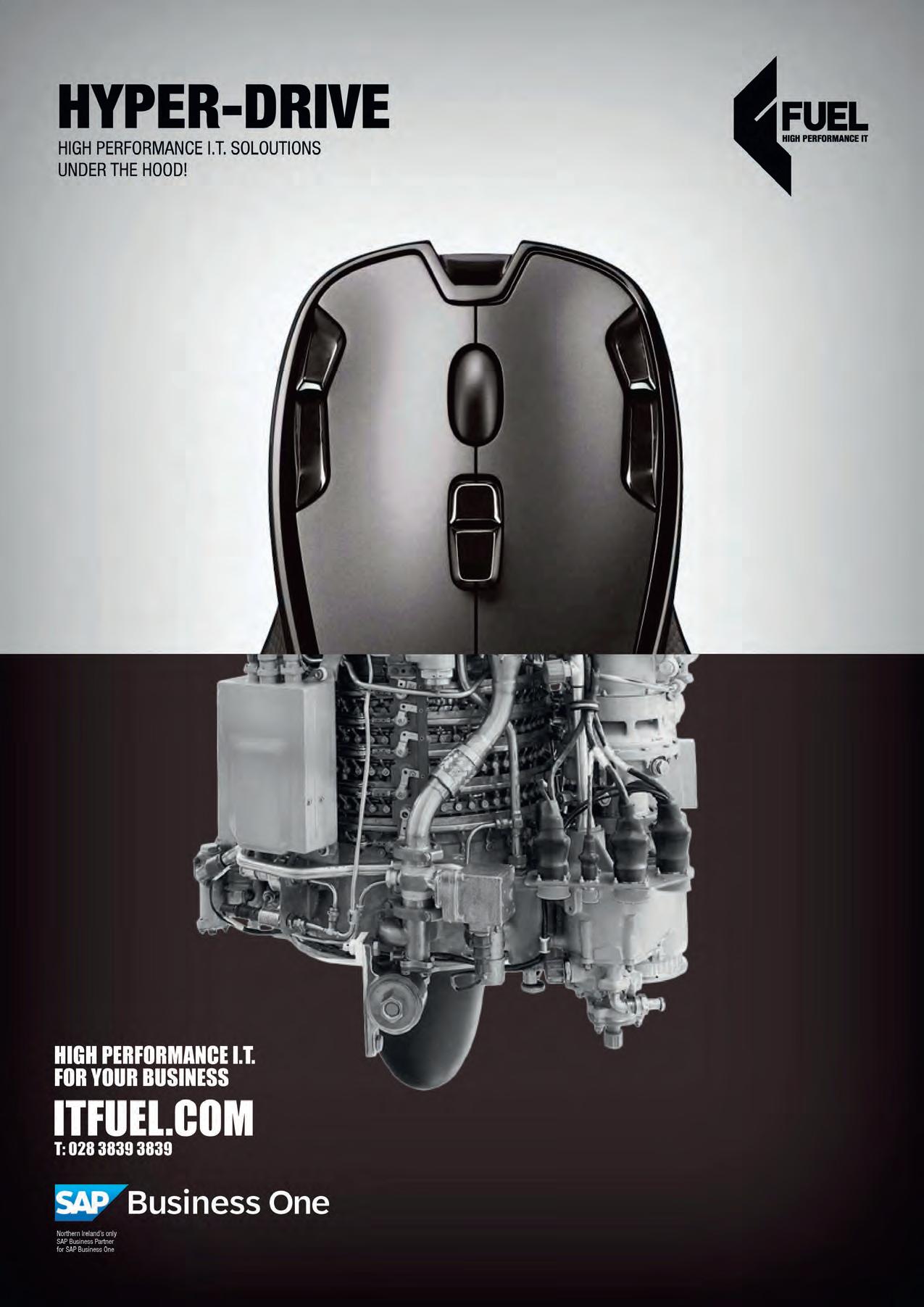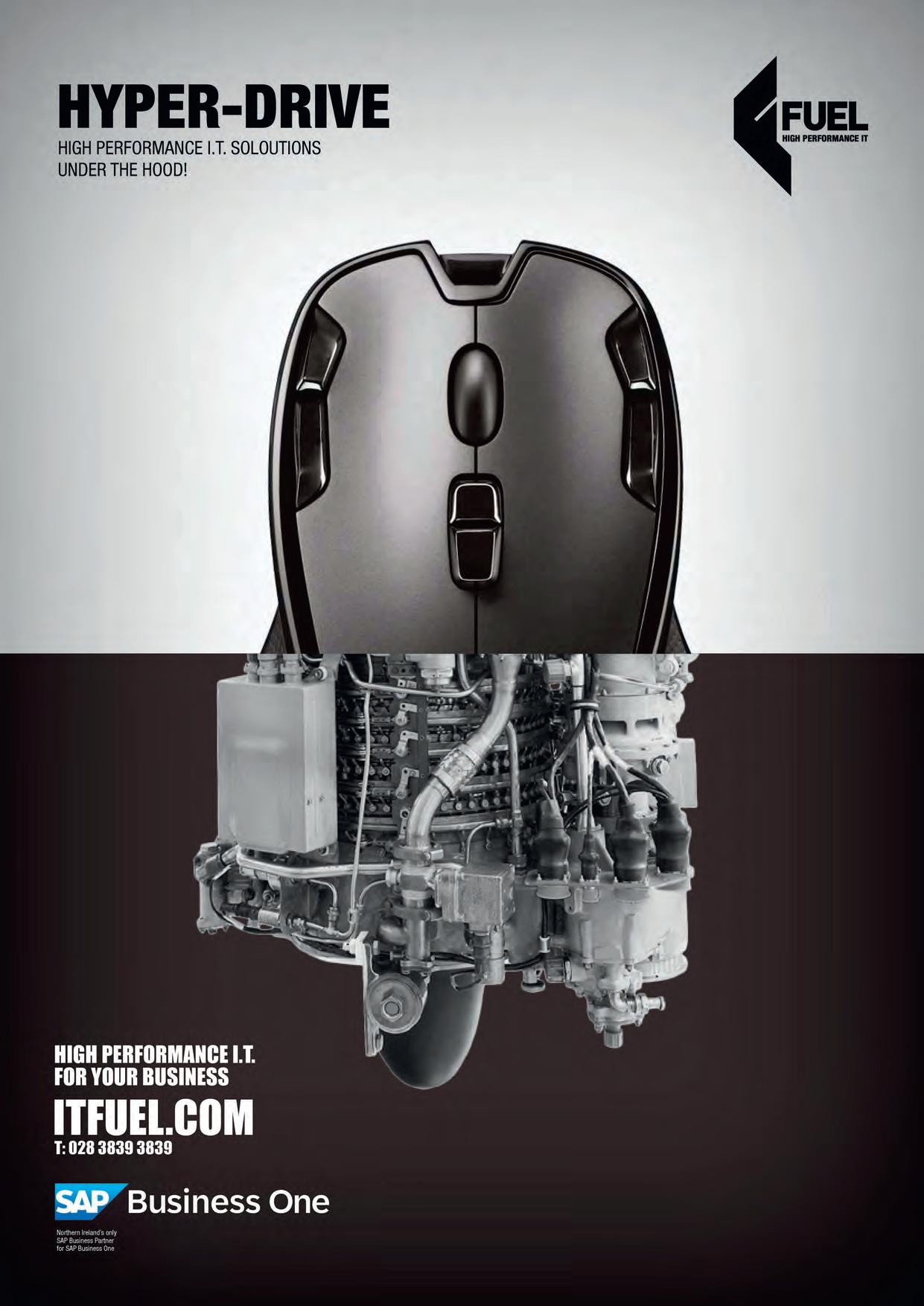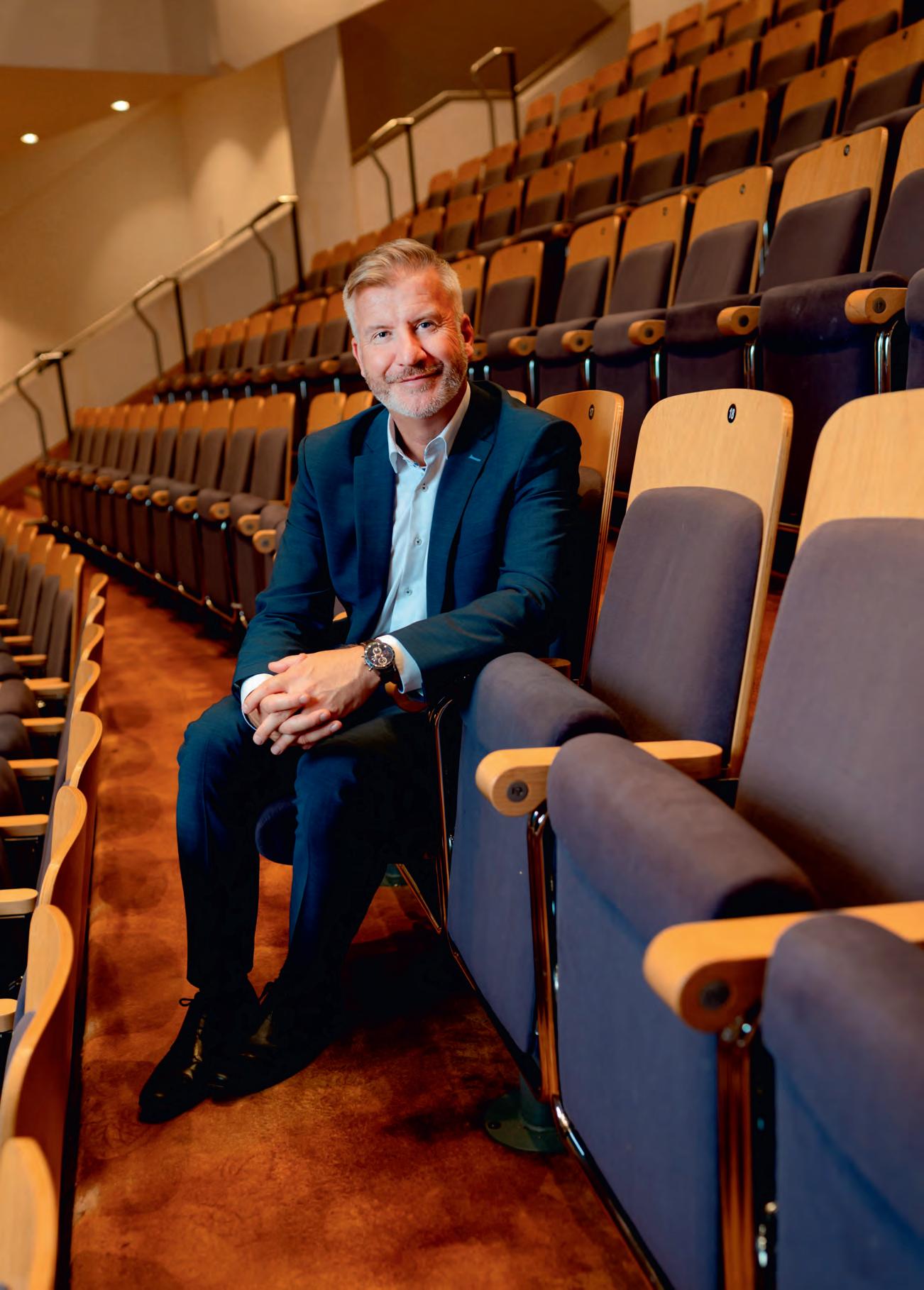

TAKING CENTRE STAGE
Rob McConnell steps into the CEO role at ICC Belfast, Waterfront Hall and Ulster Hall, bringing with him a career in cyber, technology, and business transformation.

WE ARE REBRANDING!
For nearly forty years, Ansons has been guiding Northern Ireland businesses through the process of obtaining protection for the Intellectual Property in their unique products and services. This includes registering as trade marks those signs that identify a brand, obtaining patents for new innovations or inventions, and registering designs to protect the appearance of a product.
In 2002, when we partnered with MacLachlan & Donaldson in Dublin, enabling the two firms to offer Intellectual Property services throughout the island of Ireland, the United Kingdom and the European Union, the companies maintained their separate identities. However, world events, such as Brexit and the Covid pandemic, have worked to mould the two offices into a single team operating in two locations.














Secureshreddingservices foryourbusinessthroughout NorthernIreland



Intoday’sworld,nobusinesscanafford the risksof adatabreach.Restore DatashreddeliverssecureshreddingservicesacrossNorthernIreland,giving you peaceof mind that confidentialdocumentsaredestroyed to the highest standards. We helpprotectyourbusiness,yourcustomers,andyour reputation —all while keeping youfullycompliant with data protectionlaws.
WhychooseRestoreDatashred for secure documentdisposal?
We offerarangeofsecureshredding anddestructionservicesincluding:



Convenience:We provide flexibleschedulingand collectionoptionstofityour busyschedule


Compliance: Wehelpyou complywithdataprotection andenvironmentalregulations, suchasGDPRandthe EnvironmentalProtection Act1990.





Sustainability: Weare committedtorecyclingand responsibledisposal,helpingto reduceyourenvironmental impact.


Peaceofmind: WithRestore Datashred,youcanbe confidentthatyourdisposal andrecyclingrequirementsare takencareof
RestoreDatashredisfullyaccreditedtothe highestindustrystandards,including ISO 9001,ISO14001,ISO27001 and BSEN15713
Asproudmembersofthe BSIA,wegiveour customerscompleteconfidencethat confidentialwasteisdestroyedsecurely, responsiblyandinfullcompliance.
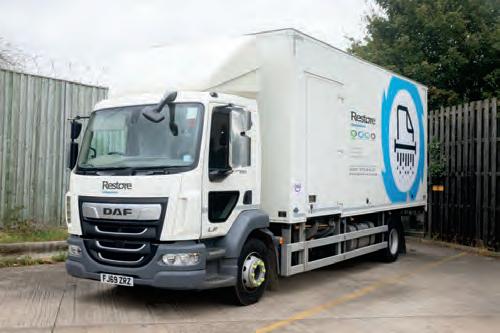
Contactustoday to seehow our secure shreddingservicescan helpyourbusiness.

AreaSalesManager: RichardF.Jones Mobile: 07753300 676
Email: richard.jones@restore.co.uk
Harddrive shredding
Securepaper shredding ITandmedia destruction

CIPR NI MAGAZINE OF THE YEAR FINALIST 2024

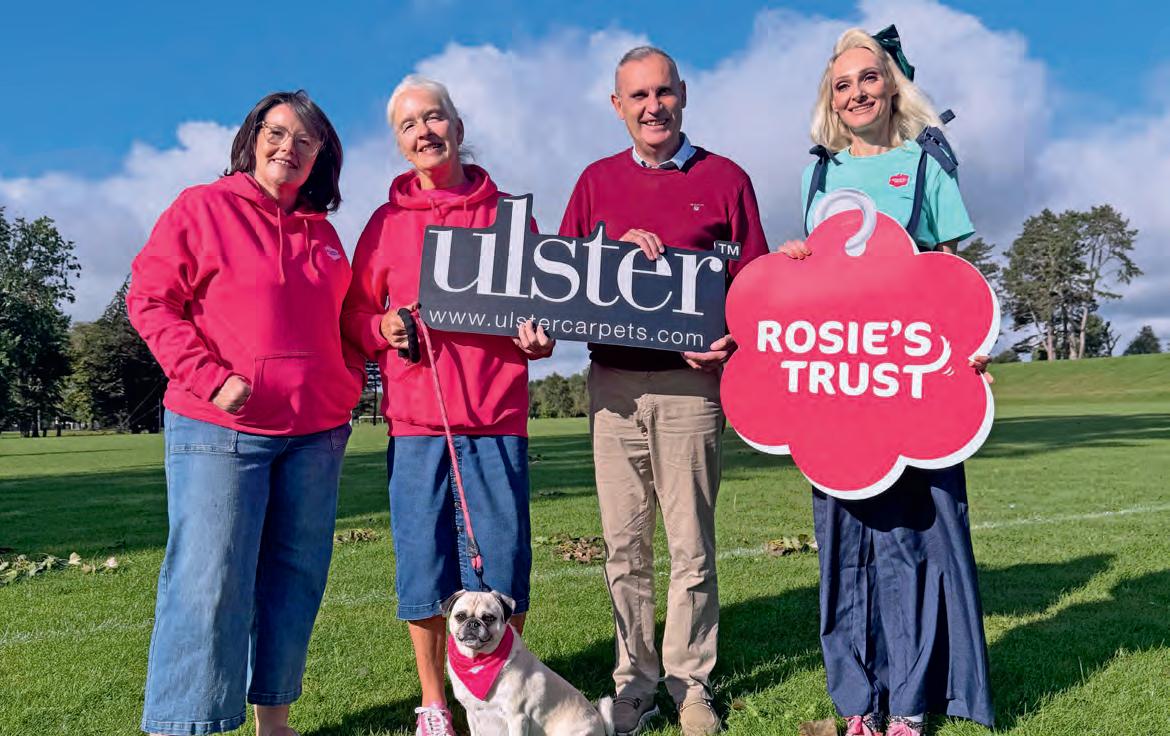
Managing Editor: Olivia Stewart Interviews: Emma Deighan Publisher: Chris Sherry Advertising Managers: Lorraine Gill & Julie Patterson Editorial Assistant: Joanne Harkness Email addresses: olivia.stewart@northernirelandchamber.com / l.gill@ulstertatler.com / j.patterson@ulstertatler.com Websites: www.northernirelandchamber.com / www.ulstertatler.com
Publisher: Ulster Tatler Group, Unit 26 Ormeau Businss Park, Belfast, BT7 2JA Tel: 028 9066 3311 Printed by: W&G Baird, Antrim. Front Cover Photo by: Paul Jervis
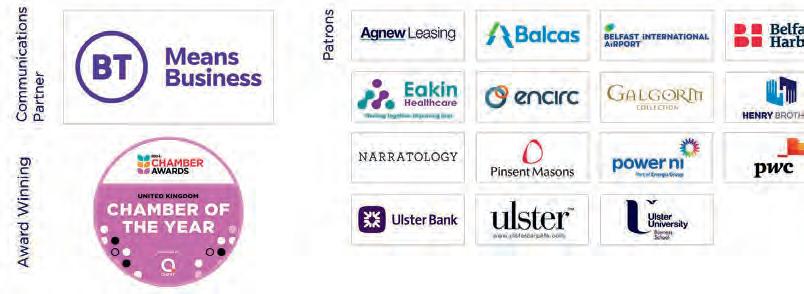
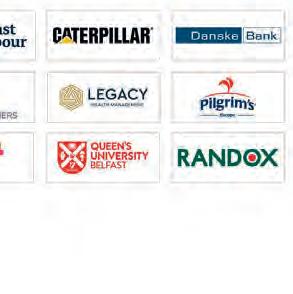
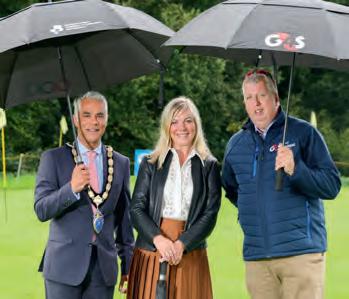
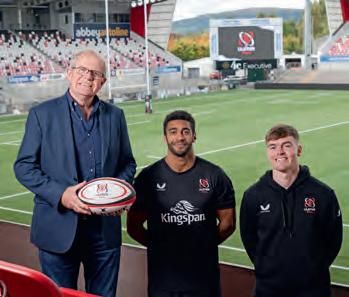
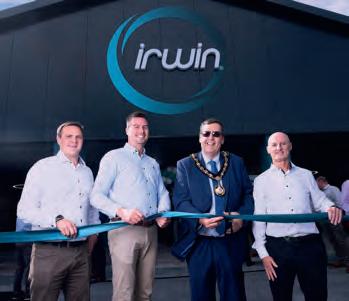

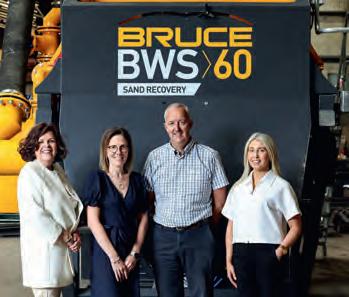
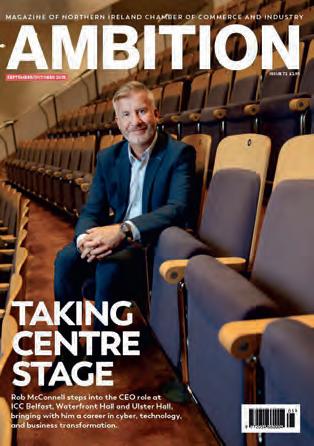
P.A. Du y & Co merge with Logan & Corry to form powerhouse law firm
Two of Northern Ireland’s leading law firms have joined forces to create a new practice with an all-Ireland reach.
P.A. Duffy and Co Solicitors and Logan and Corry Solicitors merged 1st September, with the company now operating as P.A. Duffy and Co Solicitors.
The enlarged firm will be chaired by respected lawyer and All-Ireland winning Tyrone senior manager and former GAA player Feargal Logan, alongside Managing Director Conal McGarrity.
With offices in Dungannon, Omagh, Belfast and Dublin and 50 staff, the partners say the combination adds scale without losing local roots.
The new firm, after close collaboration between the partners, pairs scale with clear accountability and has its roots in the close personal relationship between the chair and MD.
Mr Logan previously undertook work experience at P.A. Duffy and has a long association with the Duffy family, which reinforces continuity and lends a natural cohesion to the agreement.
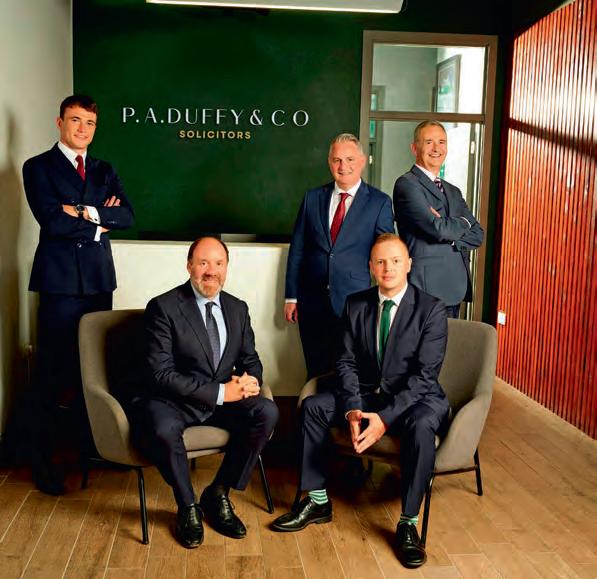
“Joining forces made sense,” Mr McGarrity said, pointing to a complementary blend of values and people.
“Both firms share the same vision for the future and we felt working together would help us achieve our objectives.”
The tie-up also provides a platform for further expansion as the practice pursues its ambition to become a leading all-Ireland law firm with even wider reach.
Chair Feargal Logan said he was enthusiastic about the next chapter for staff and clients alike.
“I feel humbled by all that has been achieved in Logan and Corry Solicitors over the past 30 years and buoyed by the heritage, longevity, expertise and ambition of P.A. Duffy and Co Solicitors into the future,” he said.
“Coupled with the support, confidence and trust of each other and our respective client bases, I look ahead to a very bright and productive future for all involved.
“Our shared vision is to be one of the leading practices across Ireland, providing high-quality and enhanced legal services for commercial and private clients in the decades to come.”
Conal McGarrity described the move as an exciting new era for the law firm.
“This is an opportunity for us to build something that is totally unique and innovative,” he said.
“Whilst remaining rooted regionally, it allows us to bring together collective expertise and to have a legal firm on a scale that can compete and deliver services on a par with other practices throughout Ireland.”
FinTrU celebrates major o ce expansion at Carlisle House in Derry/Londonderry
FinTrU has officially opened its newly expanded and refurbished office at Carlisle House in Derry/ Londonderry. This marks a significant milestone in the company’s ongoing investment in the region and commitment to advancing technology-driven Client Lifecycle Management in the financial services sector.
Located in the heart of the city, Carlisle House is steeped in history, having once served as a shirt factory. FinTrU has sensitively restored and modernised the building, blending its industrial heritage with state-of-the-art facilities designed to support a collaborative and contemporary working environment. The refurbishment includes high-performance workstations, digitally integrated meeting rooms, and employee-focused amenities.
Dr Caoimhe Archibald MLA, Minister for the Economy, who cut the ribbon at the official opening using a pair of shirt factory scissors dating back to 1962, said:
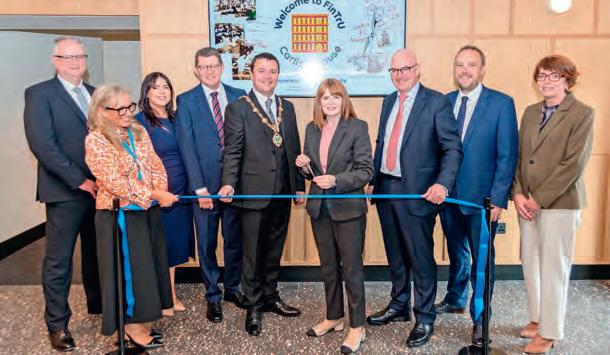

“The north is internationally renowned for providing leading services across the financial services sector, and FinTrU is a vital part of this ecosystem. The company has made a significant contribution to the local economy through its commitment to regional growth, job creation, and skills development. I’m therefore delighted to open FinTrU’s largest single office globally here in the North West, and I wish the company many more years of growth and success.”
Carson McDowell builds largestever trainee cohort as firm continues growth
Northern Ireland’s largest independent law firm has expanded its trainee solicitor programme to record levels, with 11 new trainees joining this year and 21 trainees now in total across the business. The firm say that the scale of the programme reflects Carson McDowell’s sustained growth and its commitment to creating more opportunities for young lawyers than any other Northern Ireland-headquartered law firm.
John Healy (Chair of the Board, FinTrU), Katrien Roppe (Chief of Staff, FinTrU), Kathleen McDermott (Executive Director, FinTrU), Greg McCann (Executive Director – North West Site Lead, FinTrU), Mayor Cllr Ruairí McHugh (Derry City and Strabane District Council), Minister Dr Caoimhe Archibald MLA (Department for the Economy), Darragh McCarthy (Founder & CEO, FinTrU), Richard McGuinness (Chief Operating Officer, FinTrU), Kathryn Harkin (Executive Director – Head of AI, FinTrU).




Ministers welcome £115m investment by Seagate Technology
The First Minister and deputy First Minister have welcomed a major investment by Seagate Technology Holdings at its plant in Derry/Londonderry.
The £115 million investment over five years in the development of new hard drive technology will strengthen the position of Seagate’s North West facility as a world leader in nanophotonics R&D engineering and create a number of new jobs.
Speaking during a visit to the site to mark the announcement, First Minister Michelle O’Neill said: “Since Seagate established in Derry in 1993, it has become a world-class manufacturing facility and one of the area’s largest employers. The company continues to offer high quality jobs and career opportunities for local people and contributes millions of pounds to our economy.

Strategic growth journey continues for AAB
AAB has announced the latest step in its rapid growth journey with the acquisition of Integrity Financial Management in addition to a strategic brand consolidation.
This rebrand reinforces AAB Wealth’s reputation as a national, independent chartered financial planning firm delivering high-quality, evidence-based financial advice to individuals, families, and business owners. Andrew Dines, head of AAB Wealth, commented: “This rebranding, combined with the acquisition of Integrity Financial Management, marks an exciting phase in the continued expansion of AAB Wealth. We’re proud to bring our teams together under one distinguished name and combine our talents to deliver even greater value for our clients.”
“As an Executive we are committed to promoting regional balance, and this latest investment by Seagate is another welcome boost for the North West that will bring new jobs and significant benefits to local people and communities.”
Deputy First Minister Emma Little-Pengelly said: “We want Northern Ireland to be at the forefront of global innovation and this investment demonstrates the strength of our talent and our capacity to compete on the world stage in cutting-edge technology sectors.
“The growth of Artificial Intelligence presents major opportunities and this substantial commitment from Seagate reinforces our position as a hub for innovation and technological excellence and will ensure we can continue to drive economic growth.”
A leading producer of mass data storage solutions, Seagate is working to develop technology for a 60TB+ hard drive. And its North West facility, which manufactures recording heads that read and write data on to hard disks, will play a critical role in the development of the next generation hard drive.
CBRE NI strengthens long-term strategy by adopting employee ownership trust model
CBRE NI, a member of the CBRE affiliate network, has adopted an innovative new ownership model that will ensure employees benefit fully from the future growth of the company.
The business has established an Employee Ownership Trust (EOT), becoming one of a growing number of Northern Ireland firms to embrace this model. Mills Selig and Maneely McCann advised on the structuring of the deal, which marks a significant milestone for CBRE NI.
Under the arrangement, the EOT acquires shares in the company on behalf of employees, who become beneficiaries of the trust. Alongside this, a new shareholding has been created for qualifying directors through an Enterprise Management Incentive (EMI) scheme.
CBRE NI Managing Director Brian Lavery and fellow main board directors Gerard McCann and Robert Ditty have retained a significant shareholding, and remain in their current roles.
Mr Lavery commented:
“CBRE NI is Northern Ireland’s largest commercial real estate services and investments company, and our priority is to future-proof the business to ensure we deliver on our long-term strategy.
“Moving to an Employee Ownership Trust marks an exciting innovation for our business, enabling us to grow further while enhancing our reputation and rewarding the people who make our success possible. It moves away from the more traditional partnership ownership model which was previously prevalent in the professional sector.
“For our clients, it is very much business as usual, with the added assurance that those driving our achievements will now share directly in the company’s future growth.”
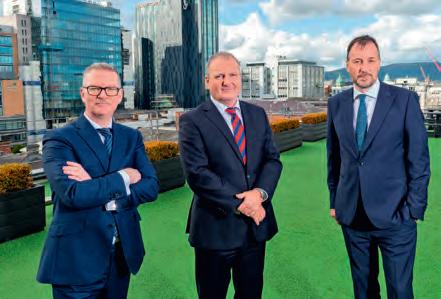
ASG becomes first Northern Ireland agency to earn IPA effectiveness honour
ASG has been awarded the Institute of Practitioners in Advertising (IPA) Effectiveness Accreditation, becoming the first Northern Ireland agency ever to achieve this prestigious recognition.
Forty-four agencies across the UK have earned the 2025 IPA Effectiveness Accreditation for demonstrating their commitment to business effectiveness and delivering commercial outcomes for clients, setting the benchmark for the industry. Valerie Ludlow, chief executive of ASG and former IPA Northern Ireland chair, commented: “We’re really proud to be the first Northern Ireland agency to achieve this recognition. Achieving IPA Effectiveness Accreditation is something I’ve worked towards with the team for the past few years, re-engineering how we deliver for clients and building effectiveness into everything we do.”

























































































































































































































































































































































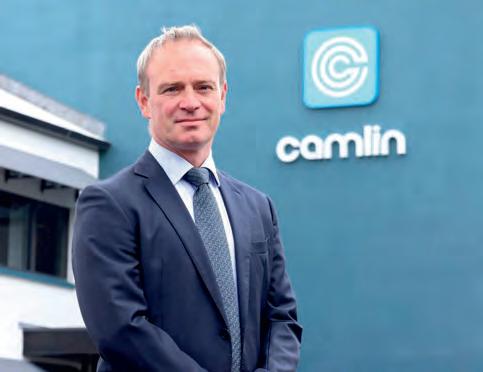
Camlin Group Reports Strong FY2024 Results
Camlin Group announced its financial results for the year ended 31st December 2024, delivering another year of strong performance, with revenue growing by 14% year-on-year to £88.2 million. This continued growth reflects the Group’s successful international expansion and the increasing global demand for its technologies in both energy and rail sectors. Profitability improved significantly, driven by strong performance in UK, North America, Europe and its global rail business. During FY2024, Camlin continued to invest in its digital offering, core technologies, and global operational capacity. These investments alongside the implementation of lean practices and a strong
focus on efficiency, have further strengthened the Group’s ability to scale and meet the evolving needs of critical infrastructure operators worldwide.
The firm predicts continued growth in FY25, projecting revenues of around £100 million together with further improvements in profitability. Looking forward, the Group anticipates significant growth from the largescale rollout of its low and high voltage sensor technologies, together with its Sapient platform, across North America, UK, Europe and the Middle East.
Commenting on the results, Camlin Group Chief Executive Peter Cunningham said: “FY2024 was a defining year for Camlin. Our growth has been built on strategic investment, continuous innovation, and a clear focus on delivering value to our customers.
“But we are only getting started. With our recent expansion into the Middle East and Australia, along with upgraded facilities in Atlanta, Coventry, Lyon, and Belgrade, we’re building serious momentum. Our plans for the future are even more ambitious with further expansion planned for early 2026 in North America, UK, Europe and Middle East. No other company in our sector is as well set up to serve the evolving needs of network operators around the world.
“For decades, as engineers, we’ve understood the complexity of the grid and now we’re playing a central role in helping utilities solve the challenges of capacity, resilience, and safety. We are uniquely positioned to deliver the technologies, expertise, and integrated solutions that utilities and rail need to transition to a more sustainable, resilient, and efficient future.”
Fibrus Broadband launches £50k fund for sports clubs
Musgrave NI celebrates new £4m Centra store in Portadown
A brand new Centra convenience store and petrol forecourt has officially opened on Carn Road, Portadown marking an investment of £4 million. The store will be a welcome addition to the local community creating 50 new jobs.
David Higgins, retail sales director at Musgrave Northern Ireland, said,
“Musgrave has a longstanding relationship with the Wilson family through SuperValu Portadown, and we’re excited to further develop our partnership with the opening of Wilson’s Centra Carn.
“The new store will be an asset to the community, delivering convenience and great value across a wide variety of everyday products. The modern store is an excellent addition to our network and we wish the Wilson family the best of luck.”
Northern Ireland broadband provider, Fibrus, has launched its Play it Forward Fund for the third year running, with £50k available to local sports clubs across Northern Ireland and Cumbria.
Designed to support grassroots sports clubs in regional and rural communities, the fund provides up to £1,000 per club to help improve facilities or obtain essential equipment and sports kits. The Play it Forward Fund aims to reach beyond sports, empowering children in local communities to prioritise movement, health and wellbeing and reduce screen time. Since launching in 2023, the Fibrus Play it Forward Fund has contributed £100,000 to sports clubs in both Northern Ireland and Cumbria, England, helping kids to switch off from their devices and get outside. In Northern Ireland, over £60,000 has been allocated to 63 local clubs.
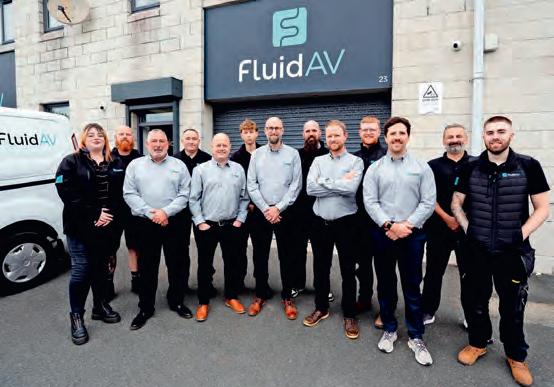
County Down-based AV specialist Fluid AV has announced a major investment as the company sets its sights on expanding services across the UK. A £300,000 investment has doubled the company’s workspace at Windmill Business Park, Saintfield, through the acquisition of a second office building and the addition of a new showroom. At the same time, Fluid AV has opened an Edinburgh office to service clients across Scotland and the North of England, already completing projects for notable organisations including Edinburgh Photographic Society and family support charity Fife Gingerbread.
Fluid AV also holds the distinction of being the only company in Northern Ireland accepted into the PSNI Global Alliance partner network, a prestigious certification recognising the best AV/UCC providers in each market.
“Our growth has been rapid, but it’s been driven by the right things: long-term customer relationships, technical integrity, and a culture of listening and solving,” said Managing Director Stephen Mayne. “This past year has been transformational, not just in terms of size, but in how we operate, innovate, and look to the future.”
Your Local Destination for Hair Transplant Surgery
Hair loss is a concern that can affect anyone and like many conditions, there is no singular explanation.
A hair transplant moves hair to an area of the scalp that is thin or bald. It can be an effective procedure for those who have lost hair and have already tried other hair loss treatments.
The hair transplant technique available at Marlborough Clinic Belfast is called Follicular Unit Extraction (FUE). FUE is a minimally invasive treatment (no cutting of a strip) and is carried out under local anaesthetic by Dr Andrew McCleery.
Our bespoke hair transplants are designed to meet your individual hair restoration goals, beginning with a comprehensive informative clinical consultation with Dr McCleery.

Andrew McCleery

Why Choose Marlborough Clinic Belfast?
RQIA approved clinic for hair transplant surgery
GMC registered hair transplant surgeon
Procedure completed in one day
Accessible aftercare
Local, independently owned
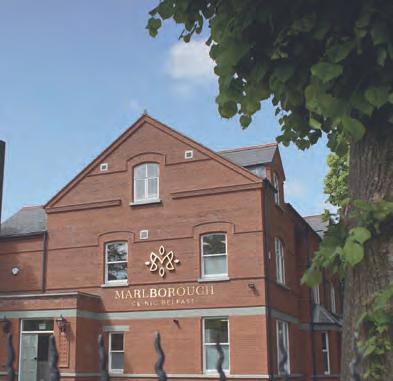


Patient Review
“I had spent a considerable amount of time researching various clinics to have a hair transplant carried out. I decided to book a consultation with Dr McCleery at the clinic. The appointment was everything I had hoped it would be, Dr McCleery was extremely helpful, advising me on what he thought would give me the best end result, I decided there and then I would get the procedure done at Marlborough Clinic.”
MB, BCH, BAO, MRCGP, DCH, DRCOG
Belfast City Airport launches transformational draft master plan 2040 consultation
Belfast City Airport has unveiled its transformational draft Master Plan 2040, which has the potential to unlock up to £200 million in private investment, support thousands of new jobs and deliver a £1.7 billion injection into the Northern Ireland economy annually.
The draft plan also shows an exciting opportunity to deliver a new rail halt to potentially become the first airport on the island of Ireland to be connected by rail. The airport is seeking views on its vision for growth over the next 15 years, which includes extended terminal and airfield facilities, surface access improvements and complementary development, which could include a hotel and increased EV charging facilities.
Aviation analysts predict demand for air travel across the island of Ireland will double to 90 million passengers per year by 2040. That will require Belfast City Airport to grow to 7 million passengers over the same period, ensuring Belfast retains and expands its connectivity to the UK and Europe.
The draft plan would double the airport’s workforce to over 2,200 and facilitate growth of its apprenticeship academy
and award-winning community engagement programme.
Matthew Hall, chief executive of Belfast City Airport, said:
“Delivery of our Master Plan is a once-in-a-generation opportunity that will benefit passengers and businesses across the region, whilst delivering key elements of the Northern Ireland Executive’s Programme for Government.
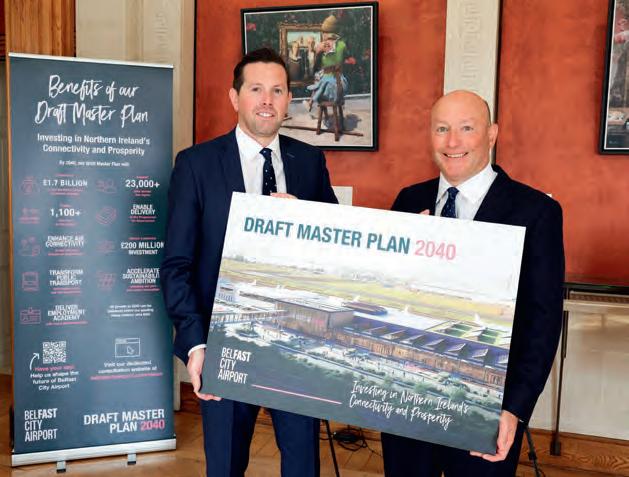
public transport and leave their cars at home, hence a focus on greener journeys within the Master Plan.”
“The economic benefits from delivery of our Master Plan will be significant. By 2040, we could generate £1.7 billion in GVA for Northern Ireland and support over 23,000 jobs across the region, including over 1,100 new roles at the airport campus.
“Every airport on the island of Ireland will need to play its part in meeting future demand, and this draft Master Plan exemplifies Belfast City Airport’s commitment to doing so, while reinforcing our position as a vital economic enabler for the region.
“We want more passengers to arrive by
Kelly Brothers ‘check-out’ New S&W wholesale site
S&W Wholesale has announced it has appointed building contractor Kelly Brothers LLP from Warrenpoint as the main contractor on its new, purpose-built facilities in Newry. S&W Wholesale is one of Ireland’s largest independent wholesalers of FMCG (Fast Moving Consumer Goods); while Kelly Bros. has been a leader in the construction sector across Ireland for almost 60 years.
The new site, which is located approximately three miles from its current headquarters in Carnbane Business Park, is situated adjacent to the A1 southbound. The new facilities will support S&W’s future growth plans right across the island. The proposal for the 16,730 sqm storage and distribution warehouse including ancillary office accommodation will be a major boost to the EOT (Employee Ownership Trust) business as it looks to the future.
Anthony McVeigh, CEO of S&W Wholesale said, “We are pleased to appoint Kelly Bros. to deliver this major new infrastructure project for the business. The business has been curtailed in recent times through space constraints and operating across multiple sites. This investment in the new facilities will secure the longterm future of S&W as a leading, independent grocery wholesaler.
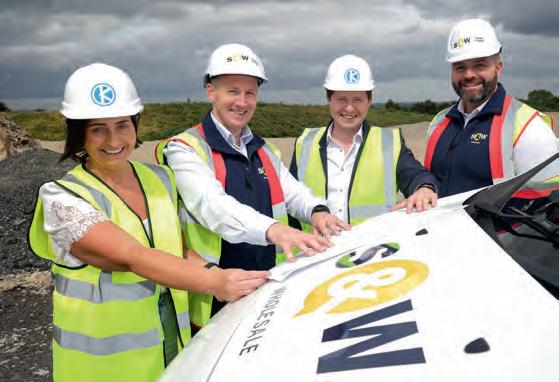
“As an Employee Ownership Trust business, it is essential that we continue to invest in the business, our people and in the local community. This new facility will allow us to maximise our operational efficiency, while giving our valuable team a pleasant, fit-for-purpose working environment.”
At the heart of the draft Master Plan is a commitment to protect the local community by accommodating all growth within the airport’s current noise contour limit.
To deliver the benefits of growth to 7 million passengers a year by 2040, the airport is also seeking views on moving the annual cap on aircraft movements from 48,000 to 61,000.
The airport does not anticipate that a runway extension would be required.
The draft Master Plan is open for public consultation until 11 November 2025.
Stena Line welcomes Stena Futura onto BelfastHeysham route
Stena Line has welcomed the first of its new hybrid freight ferries to Belfast Harbour. The multimillionpound purpose-built Stena Futura went into service on the freight-only Belfast to Heysham route on 22 September.
The 147-metre Stena Futura will operate 12 sailings per week providing much needed additional freight capacity on the popular route which connects local hauliers directly into the key North of England road freight network. Once operational, Stena Futura and sister ship Stena Connecta, currently under construction and due to enter service also on the BelfastHeysham route in early 2026, will enhance freight capacity by 40% on the Belfast-Heysham route in response to an increase in customer demand for services between Northern Ireland and Great Britain.

we create trusted connections with communities across Northern Ireland.




















For many of us, the word “networking” can make us feel uneasy. We imagine going to an event where we know very few people, and being asked that dreaded question, “So, what do you do?”.
After interviewing a great man, Kingsley Aikins, on the Digg Podcast, and looking back on my own journey, I’ve realised that networking isn’t about collecting business cards or adding random LinkedIn connections. It’s about building relationships, listening to people, and creating a community that helps you thrive in business and life.
During Covid, our networks shrank. We stuck to family, close friends, and a handful of business contacts. But here’s the problem: real opportunity often comes from the weak ties, those people you know loosely, who open doors you’d never have found yourself.
Kingsley describes it perfectly: your network is not just a safety net when things go wrong; it’s a trampoline that can bounce you into new opportunities when things are going right.
It’s About People, Not Just Business
Some of my most exciting collaborations have come from reaching out to someone I didn’t know well or saying yes to an event I nearly talked myself out of.
THE 10-30-60 RULE OF CAREER PROGRESS Kingsley also said something in our interview that really stopped me in my tracks: doing a brilliant job at work only counts for 10% of your career progress.
He explained that 30% comes from your image, your reputation, how people talk about you when you’re not in the room. 60% comes from exposure, who has seen you in action, who knows what you’re capable of, who’s watching when you deliver.
I think this is a great reminder to people that we can’t hide behind hard work alone. We need to be visible. We need to speak up. We need to build networks that strengthen who we are and what we do.
One of the myths about networking is that you have to be an extrovert, the life and soul of the party. In reality, introverts often make the best networkers because they listen, ask thoughtful questions, and show genuine curiosity.
I love this because it means anyone can be great at networking. You don’t need to dominate the room. You just need to show up as yourself and give people the courtesy of listening to them.
Did you know that public speaking is still the number one fear for most people, even above death? (Think about that for a second!) But in today’s world, public
speaking isn’t just standing on a stage. It’s picking up your phone and speaking to your online community.
On LinkedIn, less than 1% of people actually post. That means showing up online consistently should be seen as an opportunity, rather than a huge effort of trying to push through a crowded market.
You don’t need to take giant leaps to move forward. Kingsley calls it the theory of marginal gains. Getting 1% better at lots of small things can transform your results.
In my own journey, I’ve seen this over and over again. Whether it was launching the Digg Podcast, showing up on social media through Digg Mama, or building new collaborations on Digg For Success, it was never one huge step. It was the small, consistent actions that created big change.
IF NETWORKING TERRIFIES YOU, START SMALL:
• Reconnect with someone this week whom you haven’t heard from in a while.
Comment thoughtfully on a LinkedIn post. Not just an emoji. Read what they have posted and make your comment genuine.
• Share one story online, in written form or video. Even if it makes you feel nervous.
• Don’t wait until you’re stuck to start building your network. Start now, with small, genuine steps. A smile. A message. A chat over coffee. Because you never know, the next person you meet could be the one conversation that changes everything for you.
Caroline O’Neill, Digg For Success






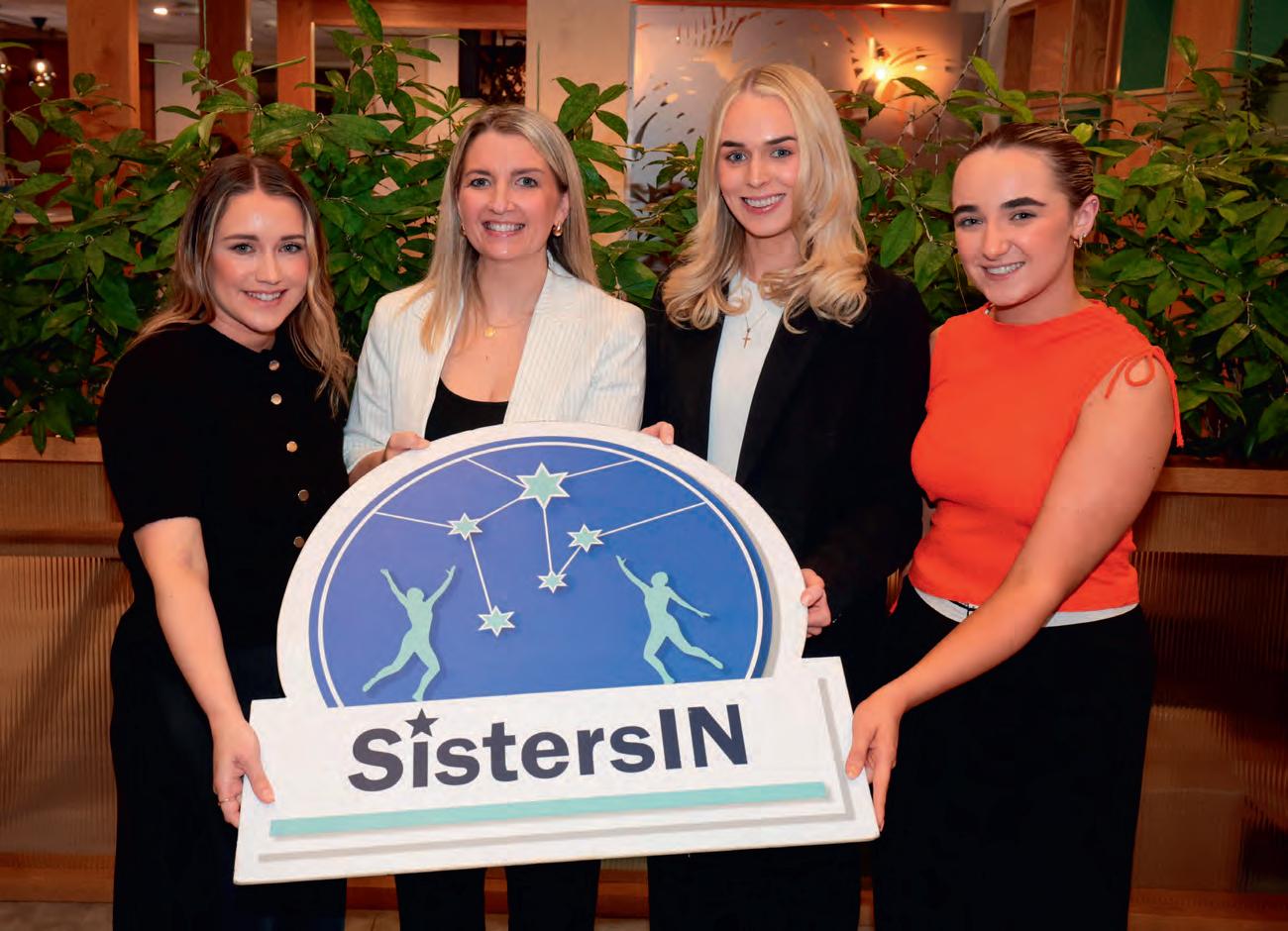
My Ambition is to...

When I think about ambition, for me it has never been about titles or positions – it has been about creating opportunity, impact, and meaningful change. That is exactly what drives my work with SistersIN, and why I am so excited about what lies ahead in the year to come.
SistersIN is a charity dedicated to empowering young women aged 16–18 to become the leaders of tomorrow. We work with schools across Northern Ireland, connecting pupils with inspiring female mentors from businesses and organisations. Together, they explore leadership, career pathways, and selfconfidence, building the transferable skills and networks that will help them thrive in their future lives and careers.
In the year ahead, SistersIN will work with over 60 schools and more than 800 girls – supported by hundreds of mentors. Since our launch in 2022, the programme has grown rapidly, and that momentum reflects the appetite for opportunity and the commitment from leaders across Northern Ireland to invest in the next generation.
My ambition for SistersIN is threefold. First, to deliver excellence for the girls currently on the programme – ensuring
they leave with not only skills and confidence, but also a belief in themselves as leaders. Second, to build the long-term sustainability of SistersIN, so that it can continue to grow and support young women for years to come. And third, to grow a strong team with positive values and the eagerness to learn, develop, and aim for the same goal: creating the best possible experience for the girls we serve.
That ambition is rooted in my own career journey.
For me, leadership is about working alongside people, understanding their strengths, and helping them to achieve more than they thought possible. That approach has shaped every role I’ve held, from my early days in maternity cover posts to a role of passion and determination in Action Cancer, to leading the Young Farmers’ Clubs of Ulster, and now in my role at SistersIN.
Already, more than 1,200 young women have taken part in SistersIN. We see their confidence grow, their horizons expand, and their sense of leadership flourish. Mentors tell us they learn just as much as the girls – it’s a two-way exchange of energy and insight. Schools tell us the impact goes beyond individual pupils, creating ripples across whole communities.
Looking ahead, my ambition is that SistersIN becomes a recognised pathway for young women in Northern Ireland –a rite of passage that helps them step into their potential. I want us to pilot new settings, opening the door to even more girls, while also encouraging more companies to get involved. The benefits are clear – not only for the girls, but for employees who serve as mentors and for organisations that gain stronger, more engaged teams.
Balancing ambition with home life is also important to me. As a mum to two young boys, I want to be present for them, while also showing them the value of having goals and working towards them. Just as SistersIN inspires girls to see themselves as leaders, I hope I can inspire my own children to aspire, achieve, and believe in what’s possible.
I have always wanted to lead from within, not manage from outside. That is what SistersIN represents to me – being part of a movement that is built with others, for others, and about others. It makes me feel empowered, and it makes me want to empower others in return.
So when I think about “My Ambition”, it is simple: to ensure that every girl in Northern Ireland – and beyond – has the chance to see herself as a leader, to know that her voice matters, and to have the confidence and skills to shape her own future. That is what drives me, and that is why I am so proud to lead SistersIN into its next chapter.
Gillian McKeown, Director of Operations and Growth, SistersIN
The SistersIN team: Hannah Fitzsimmons, Gillian McKeown, Ella Rourke and Ellie McKibbin.















Columnist
Shauna Burns Managing Director, Beyond Business Travel
Why Corporate Travel Is Much More Than Just a Cost
In today’s business landscape, marked by economic uncertainty, sustainability demands, and intense competition, every pound or euro spent must deliver measurable value. It’s no surprise that corporate travel often comes under scrutiny when budgets tighten.
Yet viewing travel purely as a cost overlooks its broader strategic importance. When managed effectively, it becomes a catalyst for growth, innovation, and connection, and the data supports this.
A February 2025 survey by the Global Business Travel Association revealed that:
48% of companies expect to take more business trips this year.
• 57% anticipate increased travel spend compared to 2024.
Meanwhile, Oxford Economics found that every £1 invested in business travel can generate up to £10 in revenue, provided the trip is purposeful and well planned. Accor’s research adds that in-person meetings can boost revenue by 36%, with nearly three-quarters of businesses saying they’re essential for closing deals.
Beyond the numbers, travel fosters relationships, drives innovation, strengthens company culture, and supports employee wellbeing.
At Beyond Business Travel, with offices in Belfast, Dublin and Derby, we help organisations turn travel into a strategic asset, not just another line on the expense sheet.
Making Trips Work Harder
Corporate travel is about much more than just booking flights and hotels. It’s about making sure every trip propels your business goals forward – whether that’s winning new clients, deepening
relationships, speeding up projects, or sparking new ideas.
Our end-to-end management means we handle everything – efficiently, safely, and with your goals in mind. That way, your people can focus on what they do best, not on juggling logistics.
Saving Money Without Sacrificing Impact
Unmanaged travel spend can escalate quickly. Our data-driven dashboards track patterns, monitor compliance, and identify long-term savings opportunities, helping businesses reinvest in what matters most.
Keeping It Green
In our current environmentally conscious world, sustainability is a must. Business travel is often a large proportion of a company’s carbon footprint, and that’s why we’ve built emissions tracking into our tools. That means you can measure, manage, and hit your carbon reduction targets without slowing down your business’ momentum.
Real-Life Wins
We recently helped one of our manufacturing clients to restructure its European travel so teams could meet multiple suppliers and partners in one trip rather than making several separate journeys resulting in lower costs, reduced emissions, and freed up valuable time for productive work – not airport queues.
Supporting People, Not Just Processes
The rise of ‘bleisure’ – blending business travel with leisure or remote work – is reshaping employee expectations. Managed within company policy, it enhances morale, retention, and productivity. Our booking tools ensure these arrangements remain compliant and safe, while offering greater flexibility.
Travel as a Growth Strategy
When approached strategically, corporate travel is an investment in
growth. It strengthens brand presence, energises teams, accelerates dealmaking, and builds lasting relationships.
At Beyond Business Travel, we ensure every trip delivers – whether it’s clinching a deal in Dubai, brainstorming in Chicago, or building partnerships across Europe.
Our expert team and advanced technology empower organisations to embrace travel as a growth strategy –driving performance, expanding market reach, and building resilient global networks for the future.
“Corporate travel is about much more than just booking flights and hotels. It’s about making sure every trip propels your business goals forward – whether that’s winning new clients, deepening relationships, speeding up projects, or sparking new ideas.”







By Blaithin Surgeoner
Blaithin Surgeoner, a Chartered Accountant withover30 yearsexperience and Partner at Endeavour InformationSolutions,a MicrosoftSolutions Partnerbased in Belfast, thatspecialisesin bringing optimising customers systems withMicrosoft Cloud solutions using a CloudFirst approach
Too often, accounting systems are viewed narrowly as tools to manage ledgers, process
But in today’s fast-moving landscape, growing businesses need more than just bookkeeping. They need agility in order toreactto change, integration with an organisation’s other systems and processes, and intelligent management reporting. That’s where Microsoft Dynamics365Business Central shines: a modern, cloud-based ERP solution that empowers businesses to go beyond accounting — and take control of their entire operation.
AFully IntegratedBusiness Platform:
Designed for small and medium-sized management with operations, sales, service, inventory, and projects. Thisseamless integration eliminates data silos and manual entry, providing one source of truth across the business.
From the moment a saleslead enters the system to when an invoice is paid and stock is replenished; BusinessCentral keeps teams connected and processesstreamlined
Built-in dashboards and real-time reporting departments, allowing for proactive, not reactive decision-making.
MICROSOFT BUSINESS CENTRAL: MORE THAN JUST AN ACCOUNTING SYSTEM

Feature-Rich Capabilities for Modern Businesses: BusinessCentral comesloaded with intelligent features that extend far beyond the capabilities of traditional accounting software:
• FinancialManagement: Robust nominal ledger, multi-currency support, dimensional reporting, bank reconciliation, in one place.
• Customer RelationshipManagement: Track customer interactions, automate sales processes, manage pricing and discounts, and convert quotes to orders seamlessly
• Inventory& SupplyChain: Gain full visibility into inventory levels, suppliers, warehouses, and product movements. Automate reordering and optimise stock to reduce costs and improve delivery times.
• ProjectManagement: Monitor resources, track costs, manage time project.
• WarehouseManagement: Use bin and zone management, barcode scanning, and real-time stock updates to increase
• Manufacturing &Assembly: Plan production, manage BOMs (bills of materials), handle capacity, and track costs assemblers
• ServiceManagement: Schedule service calls, manage contracts, and provide customers with prompt, high-quality support.
Microsoft Integration: What truly sets Business Central apart isits native integration with the Microsoft 365 ecosystem. Users can generate quotes directly from Outlook, export data to Excel, and collaborate in Teams, all without switching context. It also connectsseamlessly with Power BI for advanced analytics and Power Automate for process automation.
Secure, Scalable,and Always Up to Date: Running in the cloud, BusinessCentral provides enterprise-grade security, data backups, and automatic updates — allmanaged by Microsoft. Whether your teamis on-site or remote, BusinessCentral lets your team work anytime, from any location or device, and can grow and adapt to meet any changes your business needs without expensive upgrades.
Partnering for Your Success:
Microsoft Solution Partner, we don’t just implement software, we work alongside businesses to tailor BusinessCentral to theiring fromlegacy systems or scaling for new markets, we bring deep product knowledge, industry expertise, and a commitment to delivering value at every stage.
AStrategic Investment: Microsoft Business Central provides agility and intelligence to your business that not only manages the numbers, but also helps drive growth, improve service, and future-proof operations.
Summary: why not contact us to arrange a free, no commitment consultation, by visiting: www.endeavour-is.com/business-central or calling us on 028 9031 1010 and let’s talk.

Dynamics 365 Business Central
help them adapt faster, work smarter, and deliver

Re porting & Business Insights




Using the latest Microsoft Cloud applications and services, we help our customers overcome their challenges and make their visions a realit y. With Dynamics 365 Business Central we provide a business management sales, services, and operations within a single, easy-to-use application to get the insights needed to drive your business forward and be prepared for what’s next.
Contact us for more information and a demonstration of how Dymanics 365 Business Central can help deliver the right results for your business.
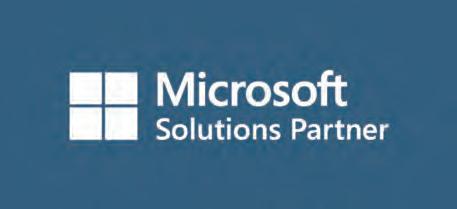


Columnist
Nick Read Director of the Business Engagement Unit at Ulster University Business School
How Ulster University’s Short Courses and Micro-Credentials Are Powering NI’s Workforce
Nick Read, director of the Business Engagement Unit at Ulster University Business School, explains how microcredentials and short courses are equipping businesses across Northern Ireland with the skills they need to stay competitive in a rapidly changing economy.
Micro-credentials are fast becoming essential for businesses responding to rapid technological change, shifting market demands, and evolving employee expectations. These focused, industry-aligned qualifications provide organisations with an agile way to plug skills gaps, strengthen capability and align learning directly with business priorities.
With the World Economic Forum predicting that 39% of workers will see their current skills transformed or replaced within the next five years, the pressure is on businesses to future-proof their talent pipelines. Micro-credentials and short courses provide a clear, practical solution, supporting employees to reskill and upskill while signalling an organisation’s investment in professional growth and retention.
Ulster University’s short courses are designed in close collaboration with industry. Covering priority areas such as digital transformation, leadership, data analytics, sustainability and innovation, these qualifications deliver targeted, skills-based learning. For employers, they provide a flexible way to respond to skills gaps while aligning learning with strategic objectives. For employees, they
represent tangible investment in career development, boosting engagement and retention.
This commitment to skills development is already evident in the £290 million Derry~Londonderry and Strabane Region City Deal, signed in September 2024. The deal is set to create transformational opportunities for growth across new and emerging sectors. In response, Ulster University Business School has secured over 300 fully funded places on postgraduate and professional development programmes at its Derry~Londonderry campus. These programmes will help to ensure the region develops the skilled workforce required to maximise the benefits of this historic investment, with opportunities to build expertise in leadership, data, fintech, AI, project management, sustainability, business analysis and stakeholder management.
One organisation already seeing the benefits is Hunter Apparel. Speaking about their experience, the company said:
“We’ve had the pleasure of participating in several DfE courses, with four of our managers completing three separate programmes so far. These courses have proven to be an invaluable resource for developing our management team. Not only have they provided key personal development and learning opportunities, but they’ve also allowed us to build a network of peers across organisations, fostering the exchange of best practices and shared knowledge.
There have been some fantastic guest speakers offering personal
reflections on their journeys and priceless advice. We look forward to more of our managers joining future cohorts, as these programmes continue to offer advancement and growth for our team and the company as a whole.”
At Ulster’s Belfast Campus, short courses such as Digital Transformation, Operational Excellence and Executive Leadership are also making a real impact on individuals and organisations. Participants on the Sustainable Leadership short course highlight its impact on both their businesses and personal development. One commented:
“This programme was a great opportunity to learn and explore new ways to be a force for good within my business. As a catering business owner, it helped me shape my thinking around inclusive food practices and sustainable leadership, giving me the confidence to communicate what we’re already doing well.”
Ulster University’s short courses and micro-credentials are helping individuals and organisations alike to thrive in a changing economy. They are not only enhancing skills but also strengthening business performance and delivering meaningful impact across Northern Ireland.
For more information on how short courses and micro-credentials can add value to your business – or to explore other organisational development opportunities – please contact UUBS’s Business Engagement Team at engage@ulster.ac.uk.











From Cyber to Centre Stage
Rob McConnell, Chief Executive of ICC Belfast, Waterfront Hall and Ulster Hall.
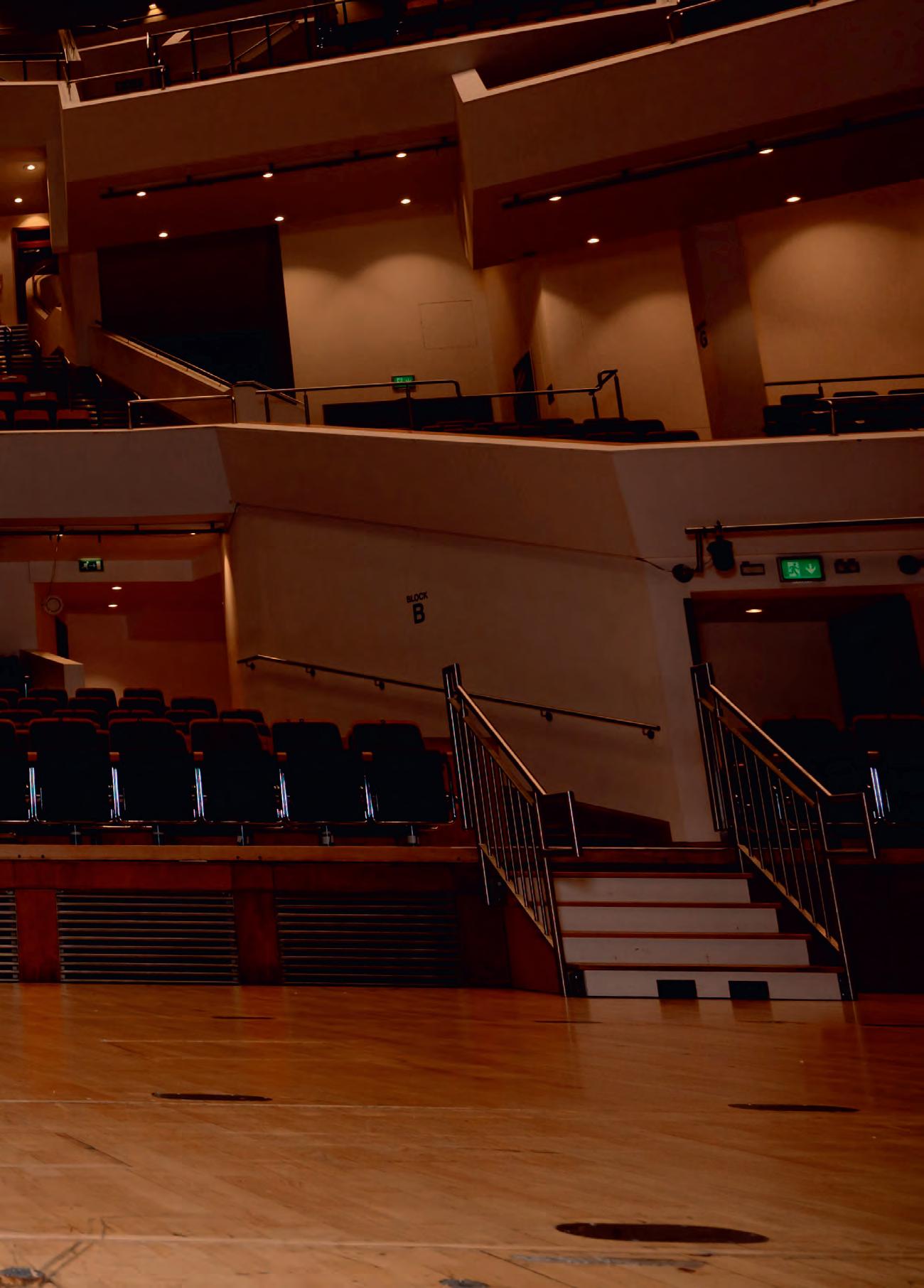

When Rob McConnell stepped into the CEO role at ICC Belfast, Waterfront Hall and Ulster Hall in early 2025, he brought with him a career in cyber, technology, and business transformation. It might seem an unconventional leap into the events business, until you hear him speak about the venues as “wholesale economic engines”. Six months into the role, he’s on a mission to unlock Northern Ireland’s potential as a world-class international conference and convention destination.
With an early career in PWC as a cybersecurity consultant, Rob provided specialist security advice to industry and government, before founding a cyber startup in London. “There’s no greater learning experience than leading a start-up: I was a jack of all trades – from sales, to operations and finance,” he reflects.
Later, he brought a major German FDI into Northern Ireland, eventually integrating it into tech and engineering powerhouse Expleo, growing a Belfast team of 300 people and an Ireland team of nearly 900.
“I’m very much an ‘NI plc’ person,” he says. “I’ve always been proud to shout about Northern Ireland on the world stage and I want to see this place flourish.”
McConnell was actively involved in developing the Assured Skills programme and he worked with Invest NI and the MATRIX panel, contributing to engineering and technology innovation strategy.
Rob’s entry into the events sector came through a nonexecutive director role at ICC Belfast, Waterfront Hall and Ulster Hall two and a half years ago. “I joined the Board to broaden my career experience but pretty quickly, it became clear I could help

with things like sales leadership and innovation.”
When he applied and was appointed as CEO in February 2025, he hit the ground running. “Through my time on the Board I had a grasp of the unique operating model of the organisation, so I was able to move quickly.”
One of the main challenges is balancing two very different lines of business. “We have two iconic live entertainment venues - the Waterfront Hall and the Ulster Hall - and then we have ICC Belfast, Northern Ireland’s only purpose-built international convention centre,” he says. “The audiences, the stakeholders, and the revenue models are completely different.”

While the entertainment venues have hosted fans of everyone from Led Zeppelin to Snow Patrol to the Ulster Orchestra, the International Convention Centre’s work is largely hidden from local view. “People might know the ‘pointy extension’ on the back of the Waterfront,” Rob says, “but few realise we’re hosting world-class scientific, business and technology events that attract thousands of visitors and bring millions of pounds into the city. They’re a wholesale economic engine for the city and more people need to know just what an economic powerhouse ICC Belfast is.”

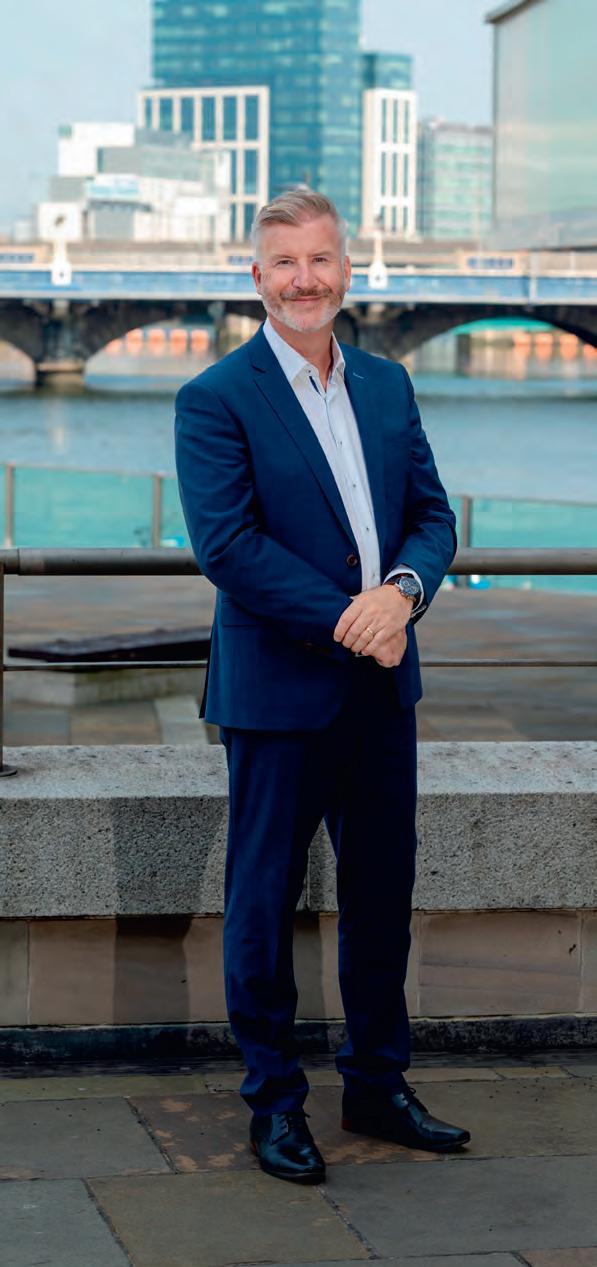
“I hope the team see that I came in as CEO in February and six months later, we’re making changes happen. We’re already seeing an uptick in sales. We have a fantastic bunch of talented people and they’re all committed to the one thing I get feedback on as CEO: the Belfast Welcome. That makes me extremely proud.”
“A 2000-person international conference can bring in £2-£2.5million into the city. Events like these boost hotels, pubs, restaurants and travel operators and they showcase the region’s capability on a global stage,” he adds.
“We need real population-wide buy-in, so that everyone can be an ambassador to say, Belfast has a world-class venue, we’re really good at hosting big business events, and the city is a pretty cool place to visit.”
The CEO is at the helm of an organisation punching above its weight and competing against the likes of Dublin, Glasgow, Liverpool, Milan, Paris and Vienna. He said, “We’re consistently winning international awards. Earlier this year ICC Belfast was the only convention venue in the world to win the ultimate Platinum award at the Global Eventex Awards.”
Behind the scenes, McConnell isn’t shying away from tackling deeper strategic issues. “One of the biggest commercial challenges in the events space is the long sales cycle,” he says. “We’re talking to event organisers now for conferences in 2028 and as far out as 2032. That means a lot of investment before you see returns.”
In response, he’s revamped the sales strategy, introducing new CRM tools, strengthening data use, and targeting key markets. “We’re focusing on markets like Spain and Belgium, where we know we can compete,” he says.
Rob’s innovation mindset is also behind a new approach to events, flipping from being simply a “receiving house” and moving to curate and create their own events.
And he’s bringing innovations to the entertainment side too. “We’ve recently launched a new VIP experience with perks like early ticket access,” he says. “But we’re also looking at affordability and accessibility - especially at a time when people have less disposable income. And we’re working with the Oh Yeah Music Centre to offer the Waterfront Studio as a venue for grassroots artists. We want to give the next big thing a foot up – we can and we should.”
And the local community is also central to the vision. “We’re doing free community panto performances, supporting suicide prevention, tackling food poverty, and opening our doors to groups who might not otherwise see their place here,” he says.
Operationally, McConnell has also focused on the basicsimproving cleanliness, security and general standards. “You can’t attract world-class events if the first impression isn’t up to scratch – we’ve raised the bar significantly,” he says.
Sustainability and safety are also priorities, especially with the upcoming implementation of Martyn’s Law. “We’re committed to leading on event safety – it’s absolutely paramount,” he says.
Looking ahead, McConnell’s five-year business plan is bold but pragmatic. “I hope the team see that I came in as CEO in February and six months later, we’re making changes happen. We’re already seeing an uptick in sales.
“We have a fantastic bunch of talented people and they’re all committed to the one thing I get feedback on as CEO: the Belfast Welcome. That makes me extremely proud.”
Reflecting as someone whose own life has featured memorable experiences at Belfast’s iconic venues, Rob says, “I’ve seen some amazing gigs at the Waterfront Hall and the Ulster Hall - from The Corrs and the Saw Doctors to Rage Against the Machine (my taste is eclectic).”
One of his most powerful memories was watching Barack and Michelle Obama speak at the Waterfront Hall. “It blew me away,” he says. “That’s the level we want to reach: facilitating life-changing moments. These venues really mean something to people here. And it means a great deal to me that they are now in our hands.”
As Belfast continues to evolve, Rob McConnell is determined that its flagship venues will play a part in driving the region’s future.

NI Chamber Chief’s UPDATE
Suzanne Wylie, Chief Executive, NI Chamber


Welcome New Members
Advice NI
ATC Systems
Auditel
Axon Power & Control
Banana Block
Bia Analytical
Clever Ghost
Concept Occupational
Health
Controlsoft
Creative Energy
Consulting
Crowd Comms
Donaghy’s Direct
Epitome Living
ESG Made Easy
Fluid Focus
Irwin M&E
*
Kigen Legal Island
MasterLink Logistics
McAteer Solutions
Estate Agents
Moxy Belfast City
Newbridge Financial
Planning Limited
NI Travel News
North Down Marquees
Print Library
SA Partners
Squint Creative
Sugar Rush
Team FeePay
The Integrated Education Fund


As we move into the autumn months, I have been reflecting on what has been a really energising summer for NI Chamber and our members.







summer for NI Chamber and our members. strengthening the by pop-up

Our summer social provided a fantastic opportunity to catch up in a relaxed setting, strengthening the connections that underpin our business community. Soon after, we hosted our annual golf day, where healthy competition on the fairways was matched by the quality of conversations off them. And of course, the pop-up run club got us all energised each Friday!


our


September brought the Festival of Business, which this year was our busiest and most successful yet. The buzz in the room was palpable, with almost 1,500 delegates, exhibitors and partners showcasing the very best of Northern Ireland’s innovation and ambition. The appetite for networking, collaboration and growth has never felt stronger.
Looking ahead, we are excited to build on this momentum with a packed schedule for the rest of the year. As well as a busy calendar of events, in the coming weeks, we are excited to launch a brand-new AI Academy, designed to help businesses of all sizes harness the potential of artificial intelligence. It will provide practical tools and training to upskill teams and ensure members are well placed to thrive in a rapidly changing digital landscape. This supplements our International Trade Training Academy, which was introduced earlier this year in response to demand for training opportunities in important areas like commodity codes, rules of origin and incoterms – knowledge that is vital for growth in global markets.
Our calendar remains full of in-person opportunities to connect and learn. Meet the Buyer will once again bring suppliers face to face with major procurement leads, while the Future Workforce Summit will explore how Northern Ireland can deliver good jobs, close skills gaps, harness AI and green skills, and shape a joined-up workforce strategy that drives growth and competitiveness. And of course, the team is working hard behind the scenes to deliver another spectacular President’s Banquet in November, so watch this space for that too.
As always, that is in addition to an intensive schedule of engagements on the policy front, not least our involvement at the Labour Party Conference. We have also responded to several key consultations including the Anti-Poverty Strategy and the NI Affairs Committee’s inquiry on economic growth. We continue to work on our wastewater infrastructure report, as well as preparing for the Autumn Budget.
Finally, a warm welcome to the many new members who have recently joined NI Chamber – there is no shortage of opportunity to get involved, so we look forward to embracing you as valued new participants in our network.

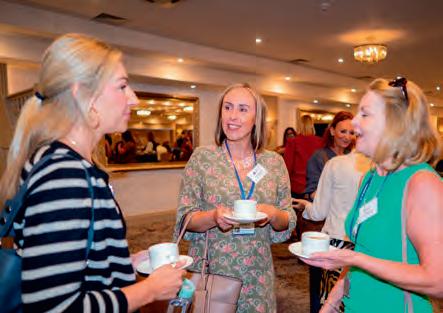
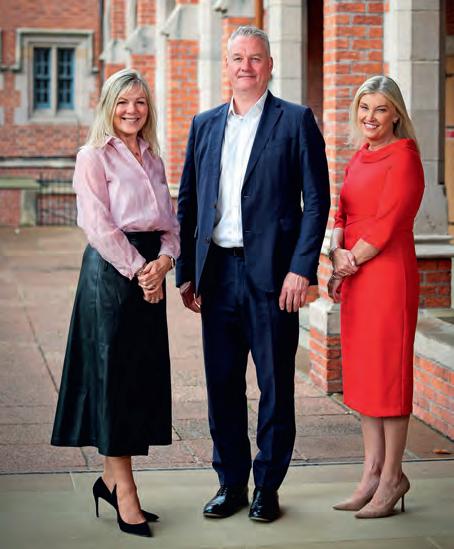
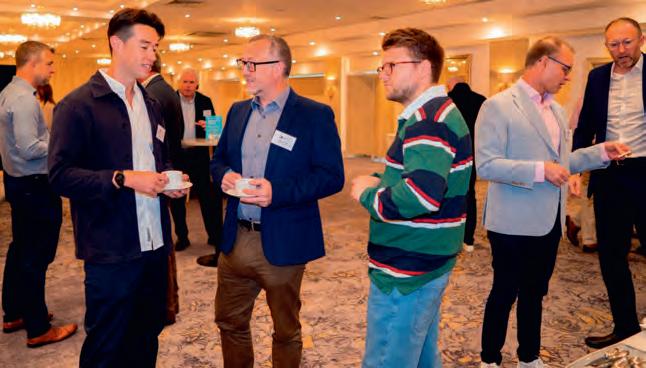
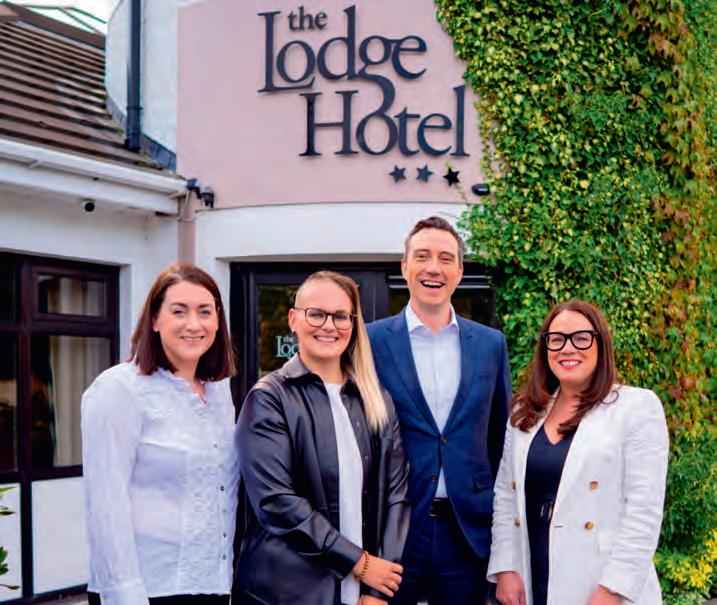
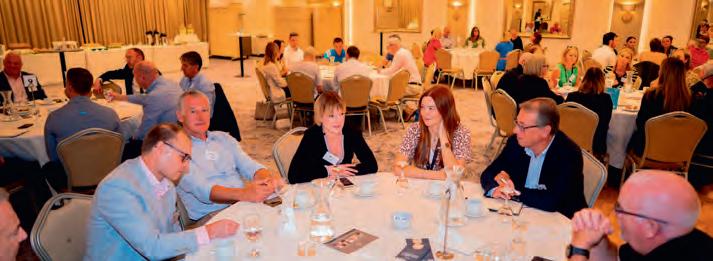

1. Tracey Steele (Triangle); Tracy Young (McKeever Hotels) and Aoife Murray (McKeever Hotels) attended a Regional Networking event in Coleraine.
2. NI Chamber members took part in a networking session in Coleraine.
3. Regional Networking attendees had the chance to catch up with colleagues.
4. Bridgene Keeley (McKeever Hotels); Grace Smith (Workforce Wellness); Peter McClenaghan (NIE Networks) and Caroline Coyle (NI Chamber).
5. Suzanne Wylie (NI Chamber); Jim O’Hagan (Bidvest Noonan) and Gillian McLean (Bidvest Noonan).
6. Guests expanded their professional network with a structured networking session.
7. Guests gathered to hear about the future of the workforce with Bidvest Noonan.

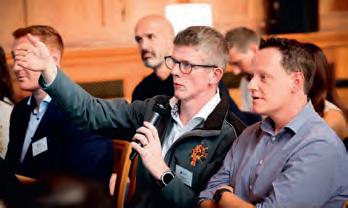
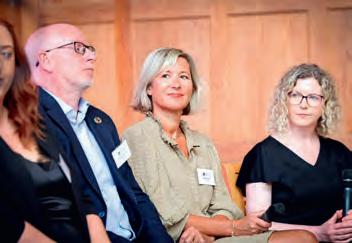
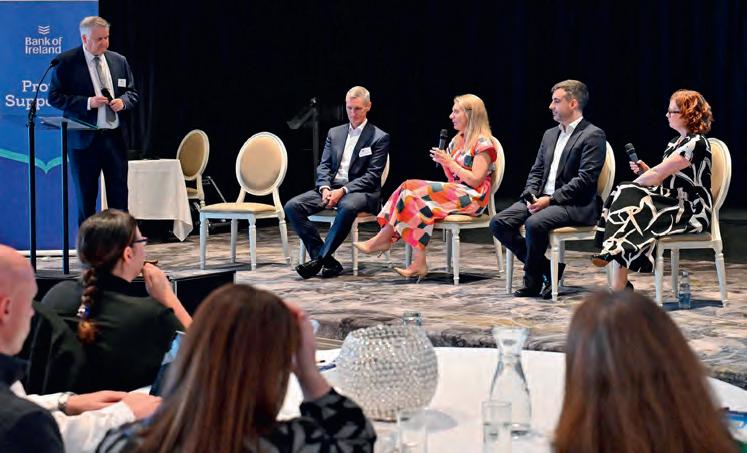
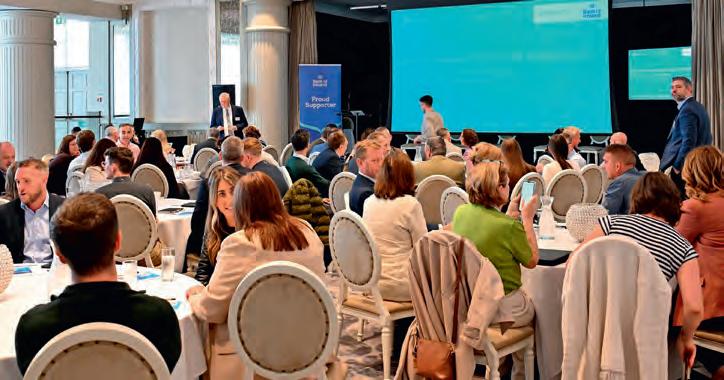
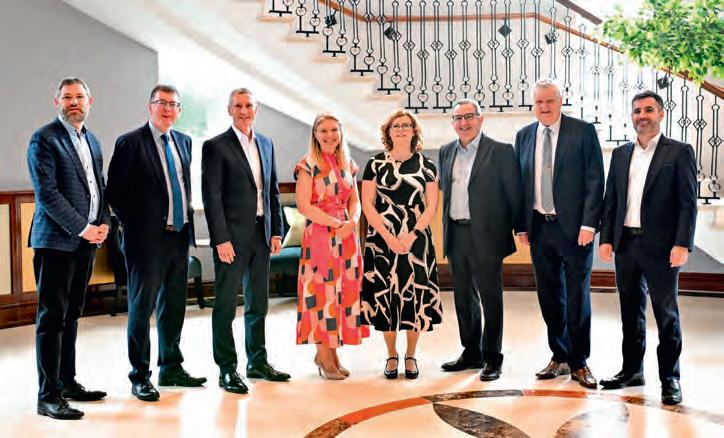
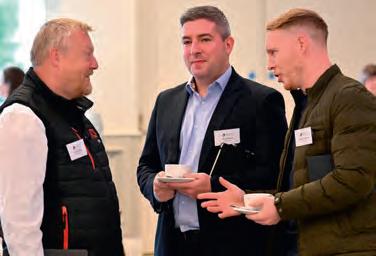
8. Panellists discussed how we can keep the human touch while embracing technology in the workplace.
9. The Workplace of Tomorrow event offered some thought-provoking discussions for attendees.
10. Sustainability panellists included Fiacre O’Donnell (Encirc); Sarah Schaeffer (Wrightbus) and Martina Donohoe (Bidvest Noonan).
11. In a panel discussion led by Gary McDonald (The Irish News), finance professionals shared their practical perspectives.
12. Finance professionals from a range of industries attended a finance Business Breakfast sponsored by Bank of Ireland.
13. Mark Scullion (UCS Design); Brian Mallon (Ulster GAA) and Ruairi Cunningham (Ulster GAA).
14. Christopher Morrow (NI Chamber); Alan Bridle (Bank of Ireland); Patrick Anderson (Queen’s University Belfast); SarahJayne Hunniford (The Mount Charles Group); Rachael McCarthy (USEL); Mark Cunningham
(Bank of Ireland); Gary McDonald (The Irish News) and Tiarnan O’Neill (Galgorm Collection).
Summer Social
To round off the summer, NI Chamber hosted its Annual Summer Social in partnership with Hill Vellacott. The Summer Social welcomed a mix of members for some fun with Prison Island an ice-cream cart from Al Gelato wih music provided by DJ Hix from Cool FM.
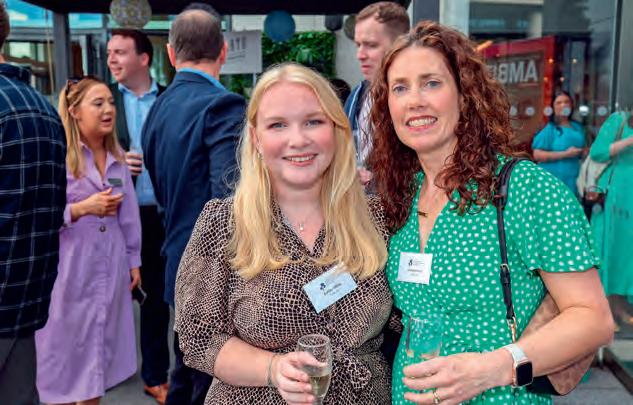
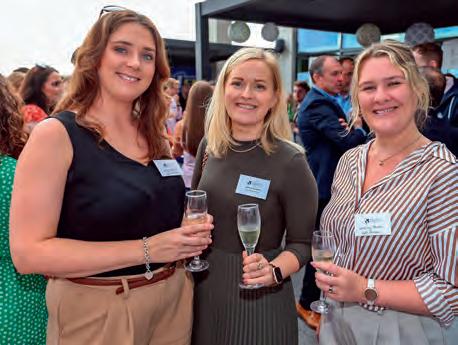

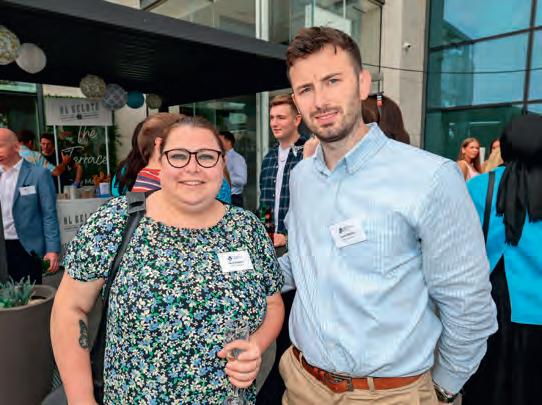
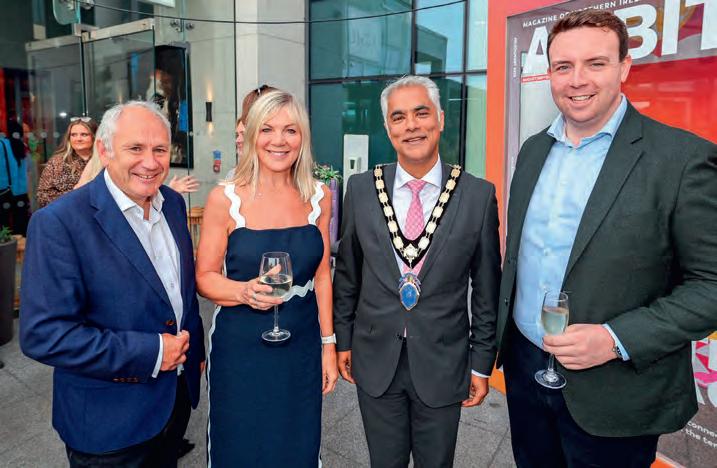

1. Ashley Millar and Caroline Ashe from SONI.
2. Sarah McIlveen and Ronan Sharkey from Andras House.
3. Kerry Downey (Café Parisien); Lynsey Gordon (Galgorm Collection) and Whitney Rowan (Café Parisien).
4. Suzanne Wylie and NI Chamber President Kailash Chada alongside Eon McMullan, Hill Vellacott and Patrick Bentley, Bauer Media.
5. Aileen Cullen and Conan Dillon represented Kingsbridge Private Hospital.
6. Members enjoyed the last of the summer sun on the terrace at AC Marriott.
Annual Golf Day
120
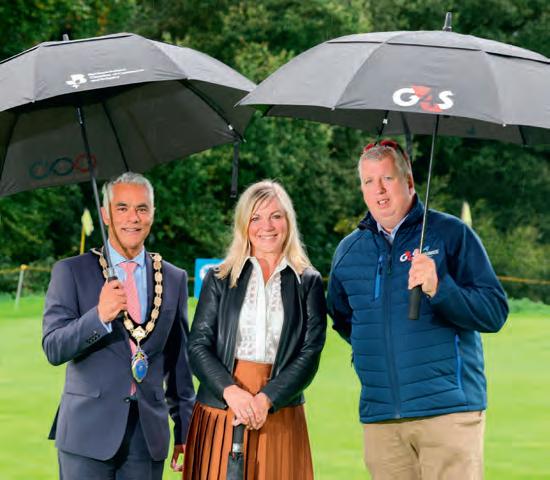


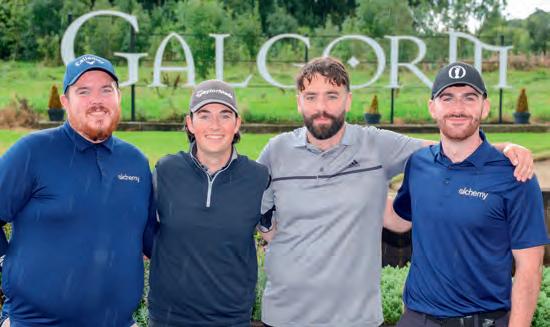
3.
4.
5.
6.

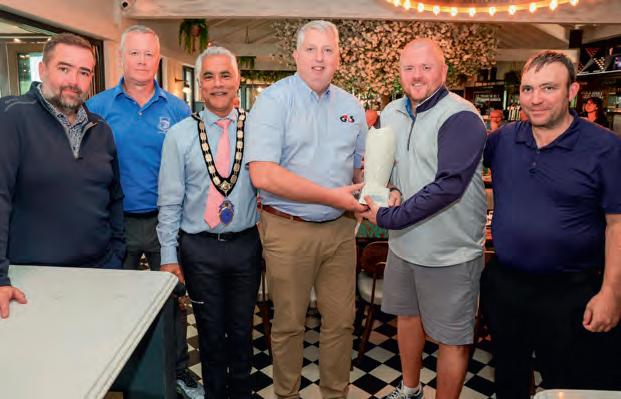
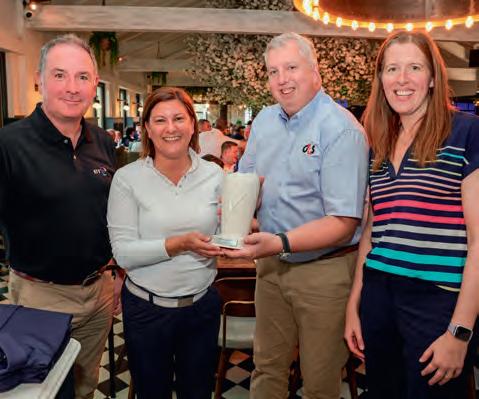
1. NI Chamber President Kailash Chada and Chief Executive Suzanne Wylie with Kevin Scruby (G4S).
2. Kevin Scruby (G4S); Pamela Ballantine and Graham Given (Connect Through Service).
NI Chamber members took to the course at Galgorm Castle.
The Alchemy team joined us at Galgorm for our Annual Golf Day.
Sarah Orange (Artemis Human Capital); Gillian McAuley (Eakin Healthcare); Suzanne Wylie (NI Chamber) and Marie Doyle (Deloitte).
Henderson Group took home second place at the Golf Day.
7. BT team was awarded with the third-place trophy.
golfers joined us for the Annual Golf Day on 12 September. Delivered in partnership with G4S, members from across Northern Ireland enjoyed a day of golf at Galgorm Castle.
Festival of Business
Over 1,400 businesspeople gathered at St George’s Market for NI Chamber’s Festival of Business - one of the busiest days in Northern Ireland’s corporate calendar. The event offered a wide range of experiences with 125+ exhibitors in attendance offering a mix of networking, learning and interaction. Expert speakers graced the mainstage with host Caroline O’Neill welcoming Salesforce, Rory’s Travel Club and Digital 24 to share their learned experience in the world of sales and marketing. This year also seen the introduction of a Studio Sessions stage, where attendees could immerse themselves in a more intimate learning and networking environment.
NI Chamber’s Festival of Business 2025 was delivered in partnership with Go Succeed, Belfast City Council, Natwest Cushon, AXL AV, NI Cyber Security Centre, 3T Power and U105.
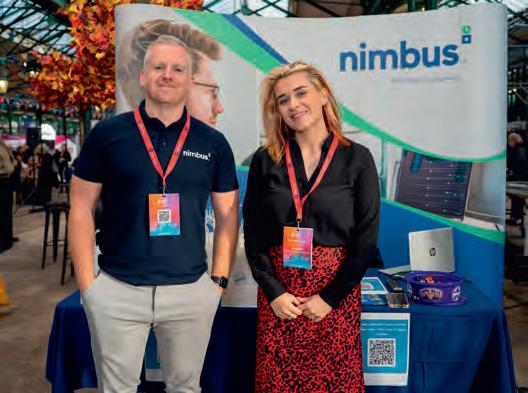
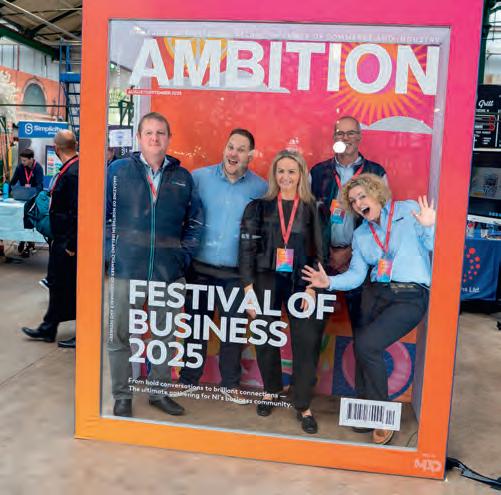
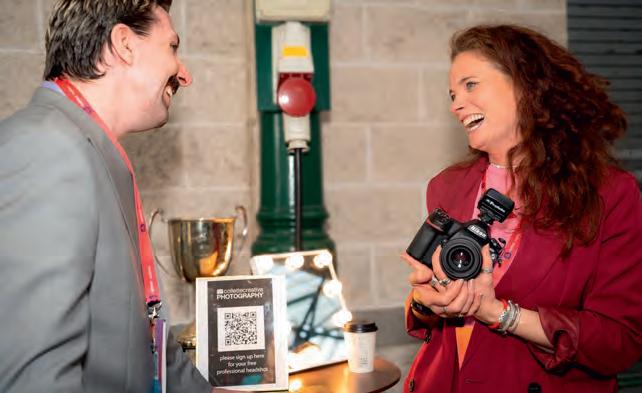
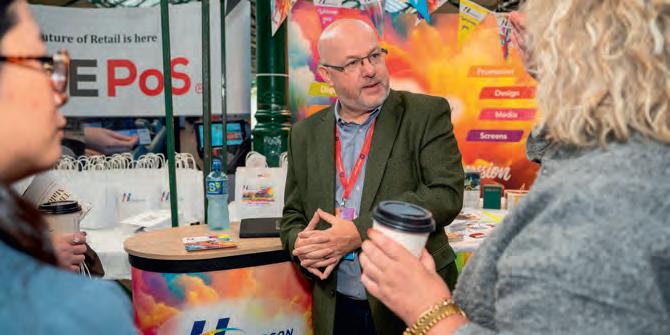
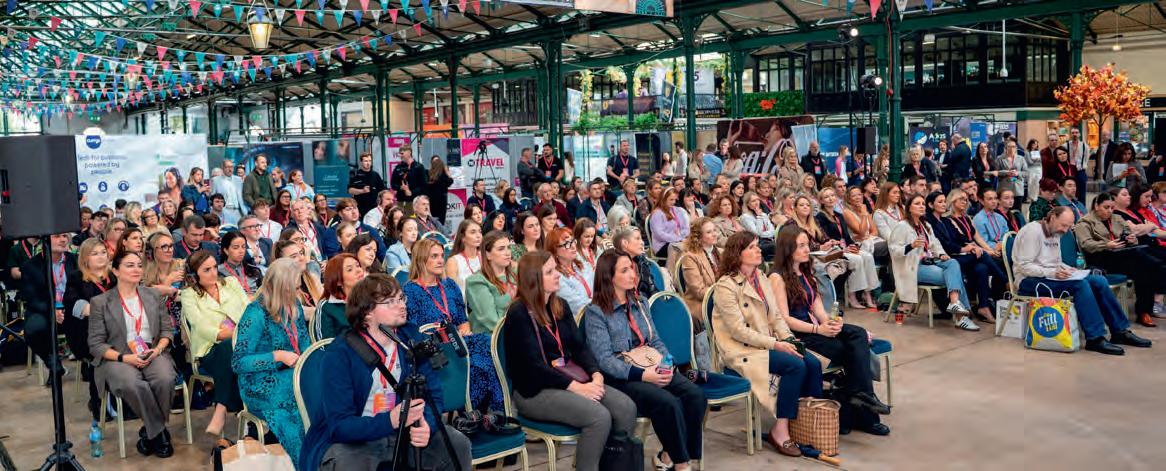
1. The Nimbus team were amongst 125+ exhibitors at the event.
2. Collette Creative provided attendees at the Festival with new headshots.
3. Sponsors of the event 3T Power enjoyed the Ambition front cover prop.
4. Henderson Print showcased its products and services.
5. Over 1400 delegates attended Festival of Business and expanded their knowledge in the world of sales and marketing
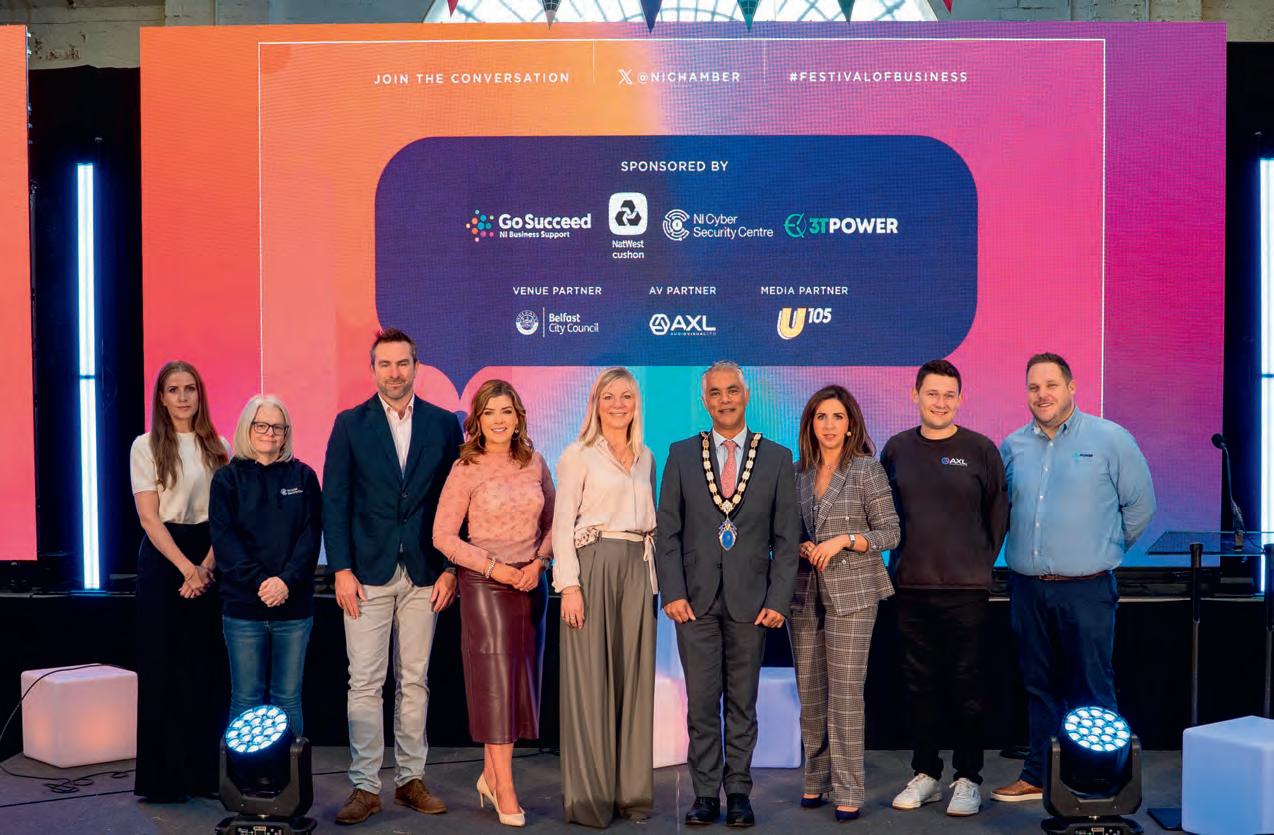
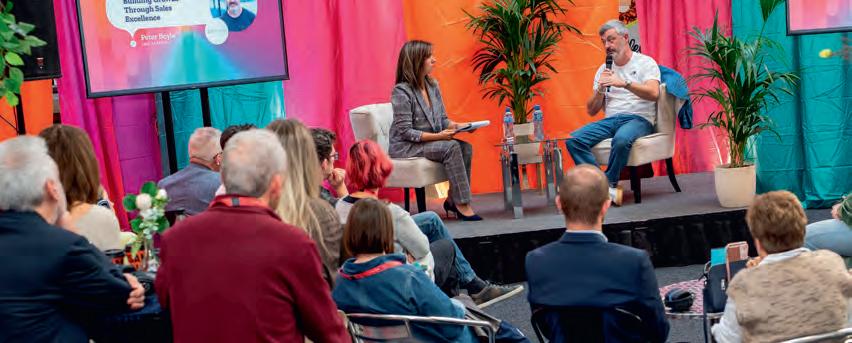
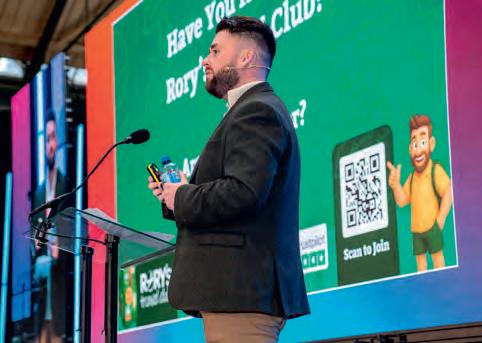
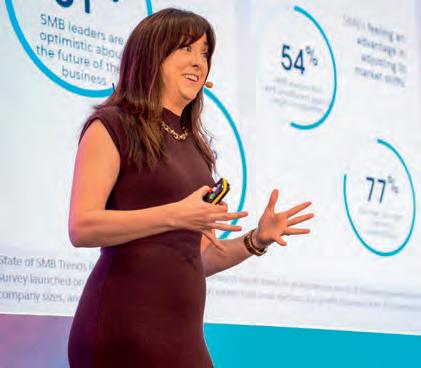
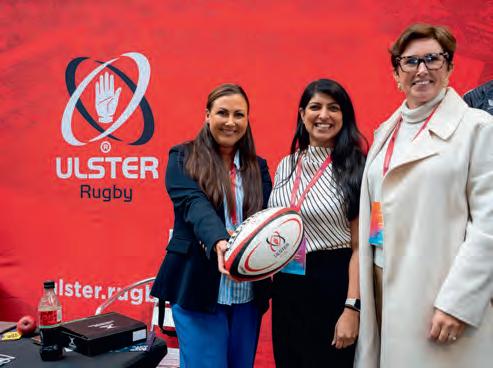

6. Shauna Gillespie (Go Succeed); Lorraine McCaffrey (NI Cyber Security Centre); Niall Borthistle (Belfast City Council); Laura Edens (Natwest Cushon); Suzanne Wylie (NI Chamber; Kailash Chada (NI Chamber); Caroline O’Neill (Digg Community); Andy Murray (AXL AV) and JohnFrancis Collins (3T Power)
7. Peter Boyle CEO of Argento shared his experience of building a leading retail brand.
8. Rory King discussed how he grew his online community at Rory’s Travel Club.
9. Norah Cullen, Director at Salesforce offered actionable insights on navigating sales trends and much more.
10. The Ulster Rugby team were on hand showcasing upcoming events and matches.
11. Attendees enjoyed catching up with colleagues.
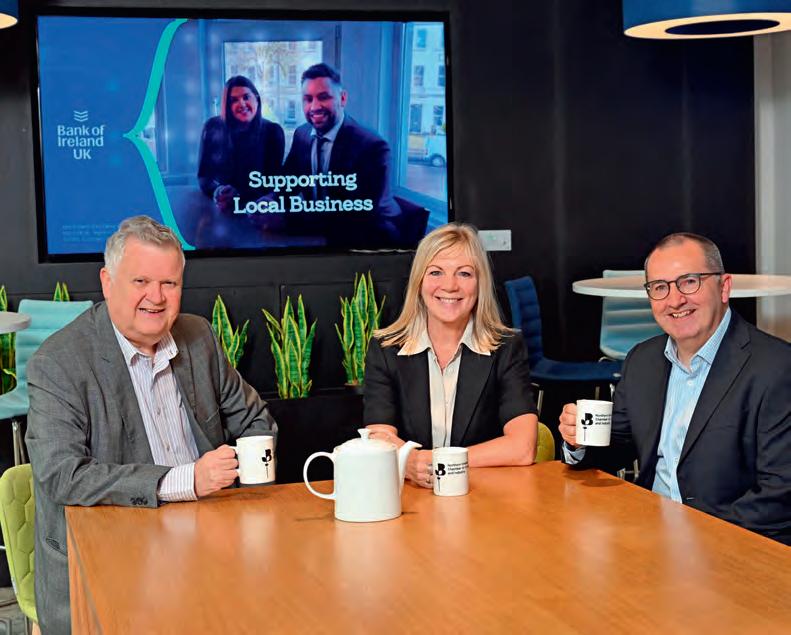
Business Breakfast for Financial Professionals
Finance professionals joined NI Chamber and Bank of Ireland for a business breakfast on Friday 5 September.
Focused on emerging trends impacting the profession, the peer-learning session covered the risks and opportunities senior finance leaders in Northern Ireland need to know.
Alan McBridle, UK economist at Bank of Ireland, delivered a comprehensive economic overview, discussing the global economic picture and its implications for firms across the region.
A panel of practitioners, hosted by Gary McDonald, business editor at The Irish News, shared perspectives on how finance teams can lead through volatility, enhance performance and drive organisational value. That panel included Sarah-Jayne Hunniford (group finance director, The Mount Charles Group), Patrick Anderson (chief finance and operations officer, Queen’s University Belfast), Tiarnán O’Neill (group finance director, Galgorm Collection) and Rachael McCarthy (head of finance, Usel).
The Business Breakfast Series with Bank of Ireland is also supported by NI Chamber’s SME Partner, Power NI.
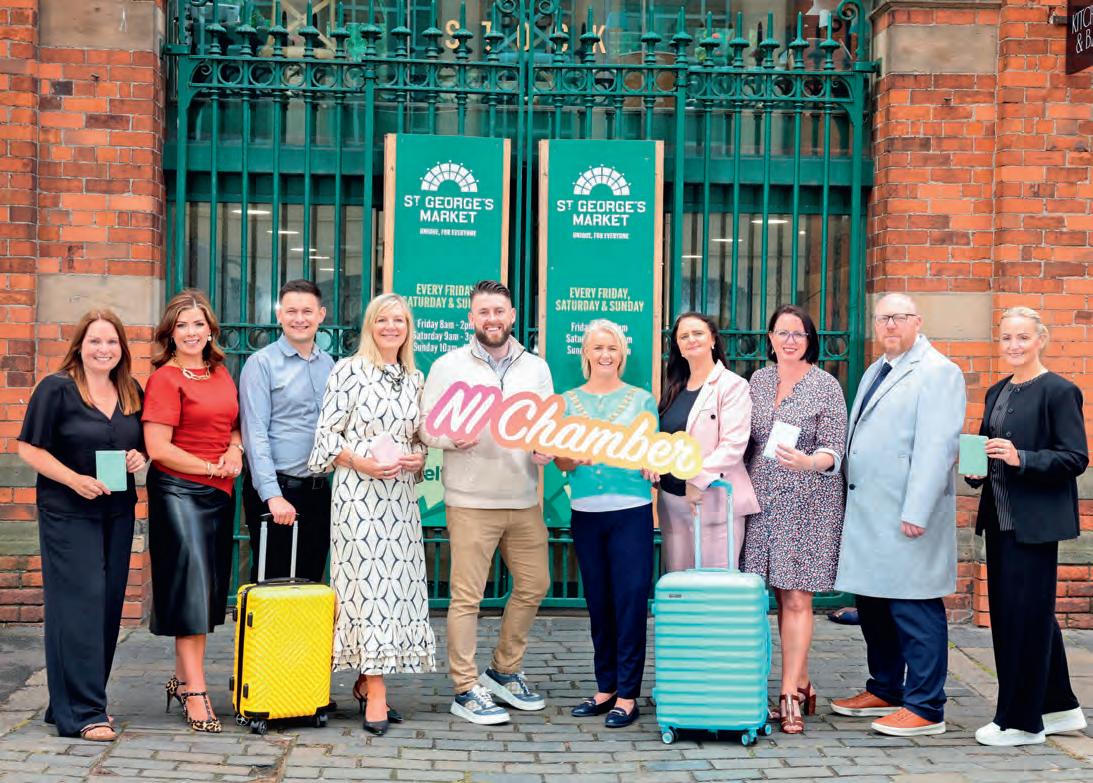

Gary McDonald, Suzanne Wylie and Mark Cunningham.
This year’s Festival of Business was delivered in partnership with NatWest Cushion, NI Cyber Security Centre, 3TPower and Go Succeed along with Belfast City Council (venue partner), AXL Audiovisual (AV partner) and U105 (media partner).
Sponsor representatives are pictured with NI Chamber’s Chief Executive Suzanne Wylie and Rory King, founder of Rory’s Travel Club, who was a keynote speaker on the Main Stage.



International Trade Training Academy














Suzanne Wylie (chief executive, NI Chamber); Brian Murphy (managing partner, BDO NI) and Maureen O’Reilly (economist for the QES).
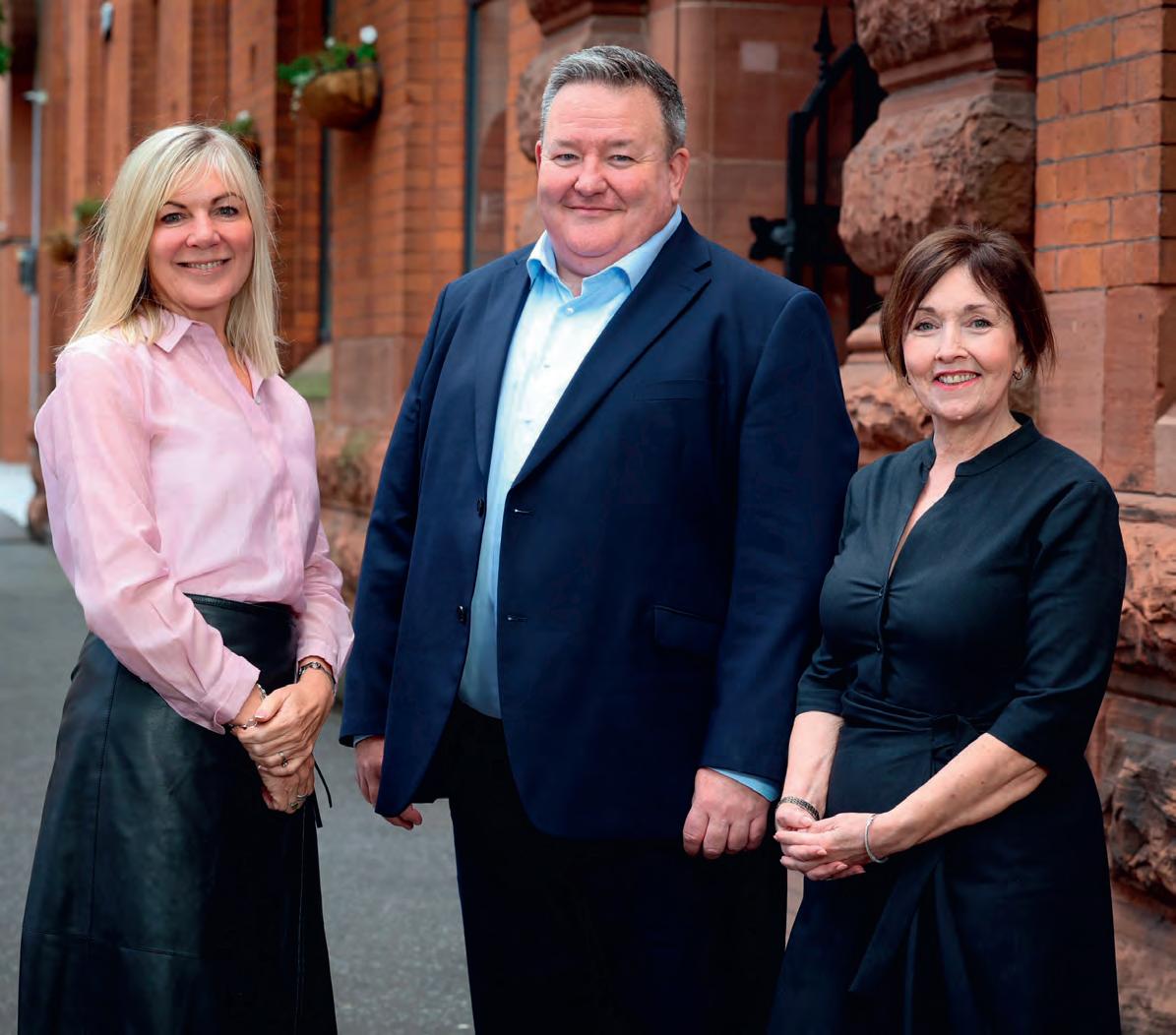

New RealitiesTrading Become Clear
No matter what challenges and uncertainties NI businesses have to face, it’s heartening to see that 79% are still trading well and are just getting on with it. This is similar to where we have been in recent years and shows that regardless of the wider economic picture, and no matter what the commentators say, our local firms persevere and succeed.
Recruitment intentions have always provided a clear indication of business performance and confidence and it is reassuring to see that recruitment activity remains incredibly high, with 81% of manufacturers and 69% of services either currently taking on new staff or planning to.
In addition, investment intentions around training are positive for both
the manufacturing and services sectors, showcasing the ongoing importance placed on staff development by businesses in their efforts to grow.
Globally, despite the concerns and media coverage about US tariffs and new trading arrangements, we note that nearly 40% of local businesses say this has had no impact, with a further 10% saying it has in fact been positive for their business. Having said that, the concerns of the 21% who have been negatively impacted need to be addressed. Given time, these figures may well fluctuate as our new trading realities become clearer.
Furthermore, it’s encouraging to see that most businesses see a positive impact on the NI and UK economies as a result of the Trade and Cooperation Agreement ‘reset’ between the UK and EU.

This reset will positively influence a more cooperative UK-EU relationship, stabilising post-Brexit trade and political ties and ultimately bringing positive outcomes for the local economy and strengthening the businesses that operate within it.
Given the positive economic momentum that recent quarters’ results have shown us, it’s clear to me that the all-too-common spectre of ‘uncertainty’ no longer has the same hold over NI businesses that it used to, and long may this continue. Looking to the future, this momentum can be enhanced even further through collaboration with our elected representatives and other stakeholders. This presents NI PLC with a very unique opportunity, an opportunity that we cannot afford to waste.
Brian Murphy, managing partner, BDO NI, discusses the latest QES findings
BDO NI Commentary:

No matter what challenges and uncertainties NI businesses have to face, it’s heartening to see that 79% are still trading well and are just getting on with it. This is similar to where we have been in recent years and shows that regardless of the wider economic picture, and no matter what the commentators say, our local firms persevere and succeed. We note that a further 15% are still covering costs with 6% struggling to do so. Without diminishing the challenges these companies may face; it remains hugely encouraging to see so many local firms continue to do well.
Globally, despite all the concerns and media coverage about US tariffs and new trading arrangements, we note that nearly 40% say this has had no impact, with a further 10% saying it has been positive for their business. Having said that, the concerns of the 21% who have been negatively impacted need to be addressed. Given time, these figures may well fluctuate as our new trading realities become clearer.
Furthermore, it’s encouraging to see that most businesses see a positive impact on the NI and UK economies as a result of the Trade and Cooperation Agreement ‘reset’ between the UK and EU. This reset will positively influence a more cooperative UK-EU relationship, stabilising post-Brexit trade and political ties and ultimately bringing positive outcomes for the local economy and strengthening the businesses that operate within it.
Recruitment intentions have always provided a clear indication of business performance and confidence, and again it is reassuring to see that recruitment activity remains incredibly high, with 81% of manufacturers and 69% of services either currently seeking to take on new staff or planning to. Indeed, with its domestic and export order books remaining strong, we are pleased to see that manufacturing respondents are planning to grow their staff even more.
In addition, investment intention balances around training are positive for both manufacturing and services sectors, showcasing the ongoing importance placed on staff development by businesses in their efforts to grow.
As ever, challenges remain as these firms seek to find the best candidates, however, given the prominence the NI Executive has placed on skills development in the Programme for Government, we trust this situation will improve.
Although the overwhelming majority of businesses here continue to trade well, we recognise that 52% have noticed “a little” slowdown, however, we hope that as the confusion regarding the US tariffs situation stabilises, these figures may indeed reverse and become positive.
We are also very cognisant of the biggest concerns local firms have, regarding inflation and business taxation, and trust that the UK Government will take account of these concerns ahead of the Autumn Budget.
Given the positive economic momentum that recent quarters’ results have shown us, it’s clear to me that the all-too-common spectre of ‘uncertainty’ no longer has the same hold over NI businesses that it used to, and long may this continue. Looking to the future, this momentum can be enhanced even further through collaboration with our elected representatives and other stakeholders. This presents NI PLC with a very unique opportunity, an opportunity that we cannot afford to waste.

NICHAMBE R& BDO NI
Q2 2025


Quarterly Economic Survey


•Negative business impact: 21%
Positive: 10%
•Among US-linked firms: 34% expect negative impact

Slowdown trend:
Overall Conditions of businesses trading well (35%) or reasonably (44%) 79% are struggling with 15% just covering costs of businesses report demand slowdown 21%52% up from 46% in Q1 and 36% in Q3 2024
UK-EU Reset
•Positive for NI economy: 41% UK economy: 39%
•Impact on own business: Positive 24%, Neutral 36%, Negative 10%, Uncertain 20%


•Negative impact on NI economy: 36%; Positive: 15%
Sectoral Performance
Manufacturing
•Top 3 UK regions in all 11 key indicators
•Export orders best in 2 years
•Cashflow weak but positive
•Profitability expectations dipped slightly
Recruitment & Labour
Actively recruiting:
Manufacturing 81%
Services 69%
Manufacturing 79%
Services 70%


Services
•Top 3 in 5 indicators (down from 9 in Q1)
•Declines in export sales/orders, cashflow, machinery investment
•Turnover and profitability confidence dropped
•5 consecutive negative cashflow quarters

PricePressures& CostDrivers
50% of Manufacturing and 51% of Services expecting to raise prices
Labour cost pressures impacting 90% of Manufacturing and 87% of Services

Raw material costs significant for Manufacturing
Utility cost pressure: Manufacturing down from 63% to 51%, Services down from 53% to 44%
% of firms reporting an increase in a key indicator minus the % reporting a decrease.


Suzanne Wylie (CEO, NI Chamber) and Kevin Scruby (Operations Director, G4S) are pictured ahead of the event.
During July and August, NI Chamber encouraged businesspeople to lace up their trainers and join its first pop-up run club.
Delivered with the support of GLL, the summer run club was introduced as a fun and informal initiative designed to support wellbeing and encourage colleagues to get active before the working day begins.

Stuart Anderson (Director of Public Affairs and International Relations, NI Chamber) and Gareth Kirk (Regional Director, GLL).
Driving Connections at Chamber Golf Day
G4S was the sponsor of NI Chamber’s 2025 Annual Golf Day, which this year was hosted in Galgorm Castle Golf Club for the first time. The Ballymena venue is recognised as one of Northern Ireland’s premier championship parkland courses.

Business on the Run

Crossing the AI Frontier

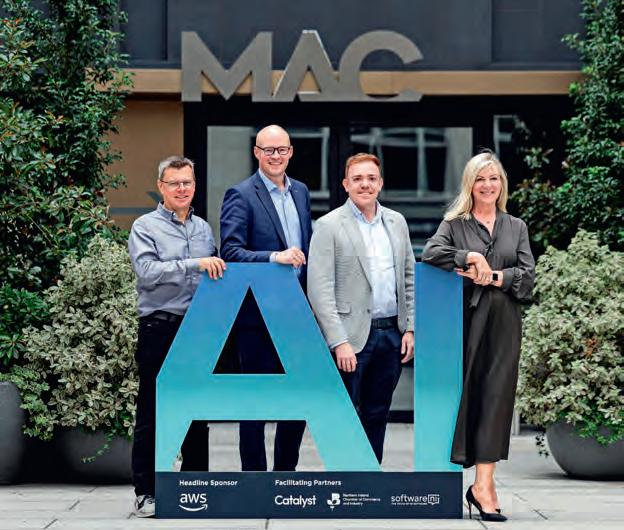
Joining forces with Catalyst and Software NI, NI Chamber is set to deliver a significant two-day AI conference, taking place in multiple locations across Belfast and Derry-Londonderry.
Facilitated by MIT Entrepreneur in Residence, Paul Cheek, ‘Crossing the AI Frontier’ has been curated to help rapidly transform how organisations across Northern Ireland harness the potential of artificial intelligence.
A series of sector-specific, hands-on sessions will teach proven frameworks used by MIT startups and Fortune 500 companies to drive revenue growth, improve public services and accelerate business transformation.
Encouraging leaders to embrace the opportunity to learn from a global exemplar, Suzanne Wylie, Chief Executive, NI Chamber said:
“AI is no longer a future trend – it’s a current reality which is rapidly shaping how we deliver services, drive innovation, boost competitiveness and rethink our business models. Having Paul Cheek from MIT share his expertise is a unique opportunity for both business and public sector leaders to understand not just the technology and its capabilities, but how to practically use the tools and seize the opportunities.”
Crossing the AI Frontier is delivered with the support of headline sponsor AWS, along with session sponsors Ergo, Slalom, EY and Microsoft. It is also delivered in partnership with Invest NI, Department for the Economy, Matrix and AICC.
NI Chamber members and friends enjoy the pop-up run club in Belfast’s Ormeau Park.
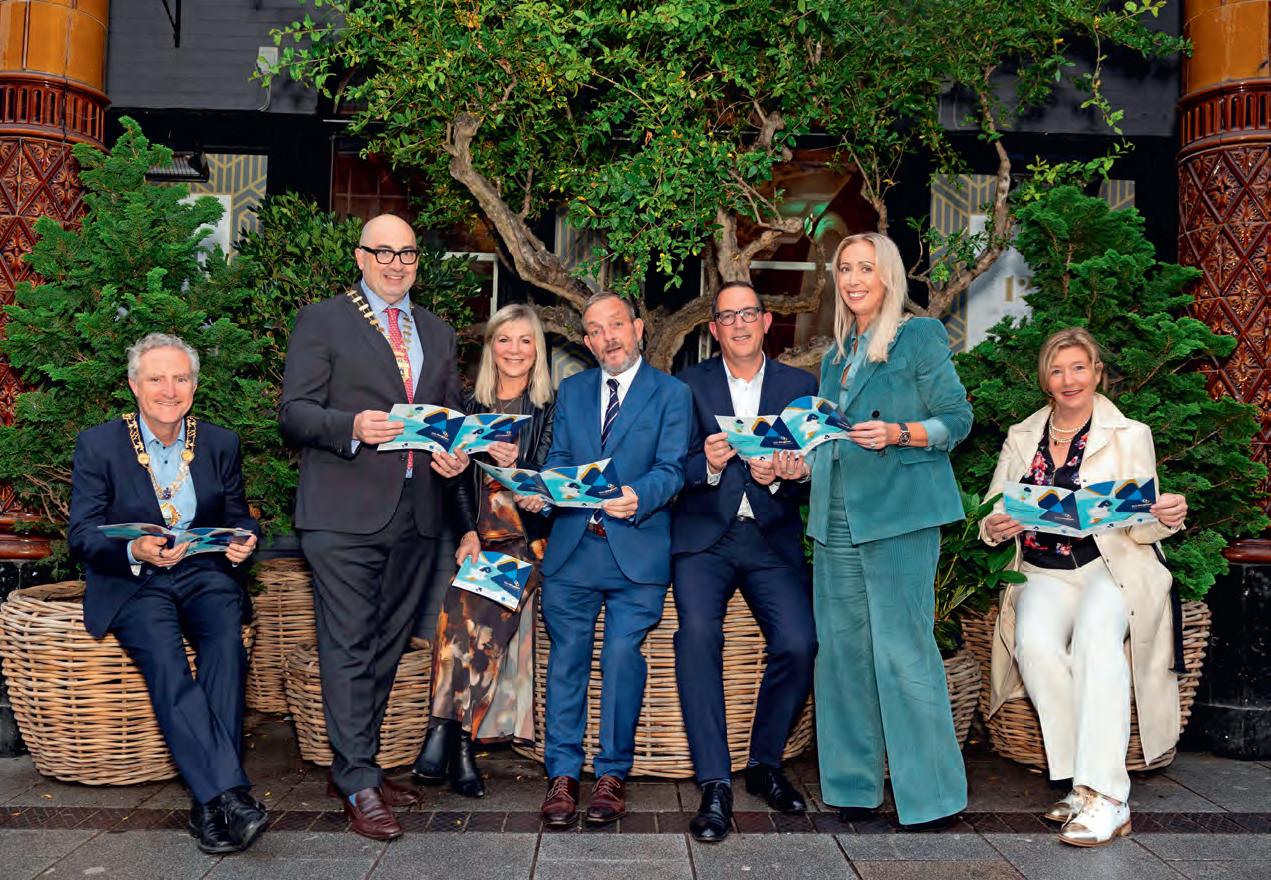
Cork, Dublin and Northern Ireland Chambers Launch Tri-Region Partnership Agenda
NI Chamber, Cork Chamber and Dublin Chamber have jointly launched a Tri-Region Partnership Agenda, unveiling a shared roadmap for strengthening economic connectivity, investment and innovation across the island of Ireland. The Tri-Region Partnership, which kick-started in Belfast in 2024, is a collaborative initiative between the three
Chambers. It is the first Chamber-led partnership of its kind, uniting voices to advocate for an all-island approach to strategic investment decisions.
The launch in Cork City, which brought together business leaders, academics, key regional stakeholders and policymakers, was part of a two-day series of engagements and discussions focused on unlocking opportunity through collaboration.
The Partnership sets out a clear purpose: to enhance all-island business connectivity and regional economic collaboration through coordinated advocacy, strategic investment, shared economic ambition and tangible actions. Its newly launched agenda focuses on delivering higher-speed rail links between Cork, Dublin and Belfast; restoring direct air connectivity between Cork and Belfast; securing long-term port
Eoghan Quigley, President of Dublin Chamber, Rob Horgan, President of Cork Chamber, Suzanne Wylie, CEO Northern Ireland Chamber of Commerce and Industry, Jerry Buttimer, Minister of State at the Department of Rural and Community Development and the Gaeltacht and at the Department of Transport, Conor Healy, CEO Cork Chamber, Caitroina McCusker, PwC and Mary Rose Burke, CEO Dublin Chamber at the launch of the Tri-Region Partnership agenda in Cork.
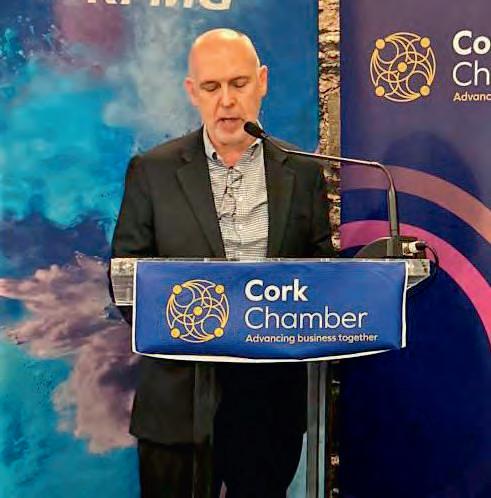
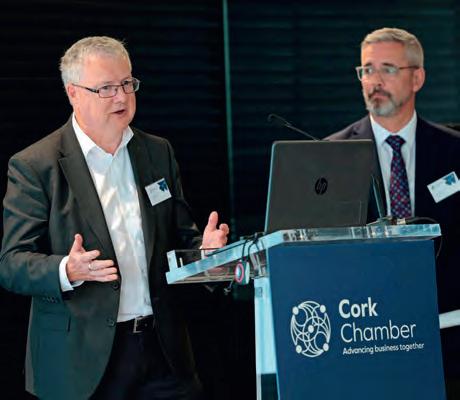
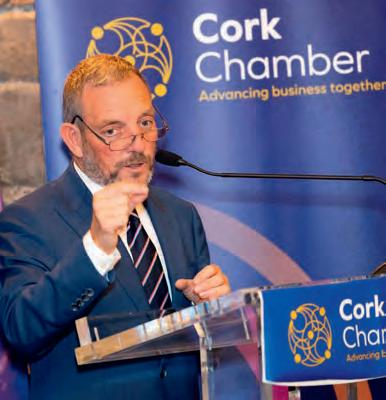

investment to support trade and offshore renewable development; building all-island innovation clusters in sectors such as life sciences, fintech and clean energy, as well as strengthening tourism links.
Conor Healy, CEO of Cork Chamber, said, “Cork is playing a central role in shaping Ireland’s economic future. We have many strengths in our region, and partnerships and collaboration enhance all of our opportunities. The Tri-Region agenda launch shows the ambition for growth across our regions. We face similar challenges and with joined up thinking and planning, our governments can unlock a more connected and prosperous island for all.”
Suzanne Wylie, CEO of NI Chamber, said, “This agenda is about unlocking shared opportunity. By focusing on key priorities such as connectivity, skills and innovation, the Tri-Region Partnership creates the conditions for businesses to thrive and for our regions to compete successfully on a global stage.”
Mary Rose Burke, CEO of Dublin Chamber, added, “The launch of this document gives fresh momentum to the Tri-Region Partnership and sets a clear course for progress ahead. It strengthens our collective voice and demonstrates our shared determination to secure the investment, connectivity and policy
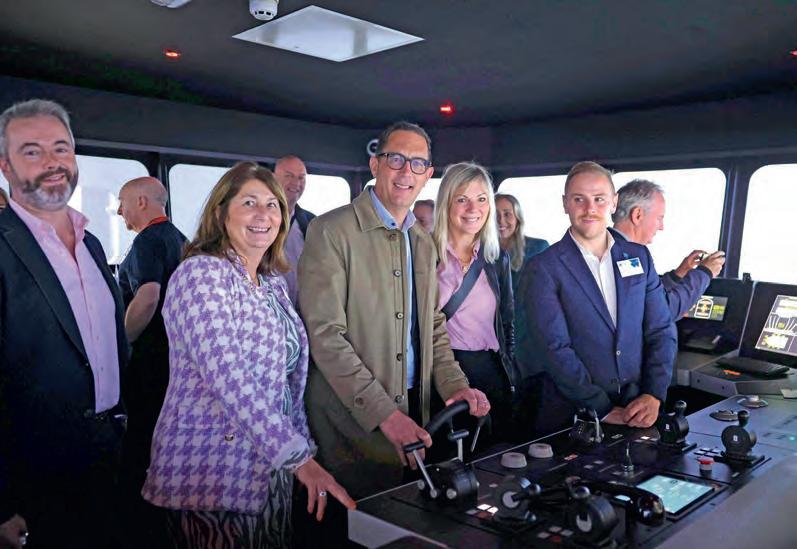
support needed to ensure the island of Ireland remains a globally competitive and thriving place to do business.”
Across the two-day programme hosted in Cork, delegates including senior figures from Invest NI, Translink, Belfast Harbour,
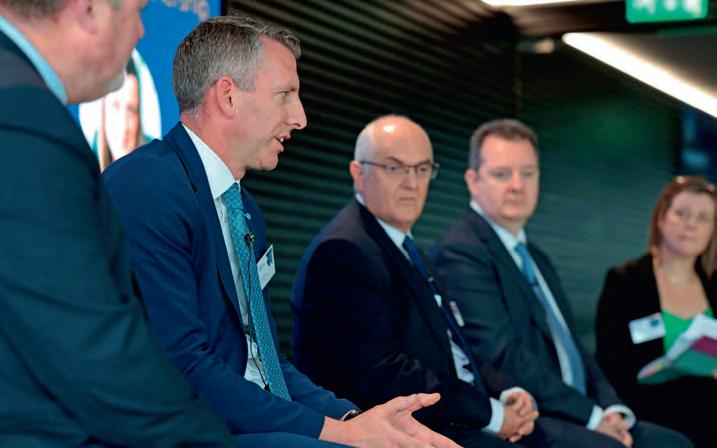
Queen’s University, Ulster University, HIRANI and Tourism Northern Ireland engaged in a series of sessions and site visits designed to connect the themes of connectivity, enterprise, tourism and innovation to real-world projects.
Highlights included discussions with Irish Rail, Cork Airport and the Port of Cork on critical transport and maritime infrastructure, a focus on Cork’s Docklands development and insights from industry leaders including Qualcomm, Enterprise Ireland, Invest Northern Ireland, IDA Ireland and InterTradeIreland.
The group also visited the National Maritime College of Ireland for presentations on offshore renewables and maritime skills development, enjoyed an evening reception and dinner showcasing Cork’s history and tourism offering with Minister Jerry Buttimer TD as special guest, and concluded with a morning session at University College Cork focused on innovation clusters, education and shared opportunities for skills development with input from Economy Minister, Dr Caoimhe Archibald MLA.
Martin Graham, Tourism NI.
Alan Lord, Irish Rail and Richard Knox, Translink.
Jerry Buttimer TD, Minister of State with responsibility for Community Development, Charities and Rural Transport.
Delegates visited The National Maritime College of Ireland.
Kieran Donoghue, CEO, Invest NI, Patrick Doyle, IDA Ireland and Martin Robinson, InterTradeIreland were among the panellists.
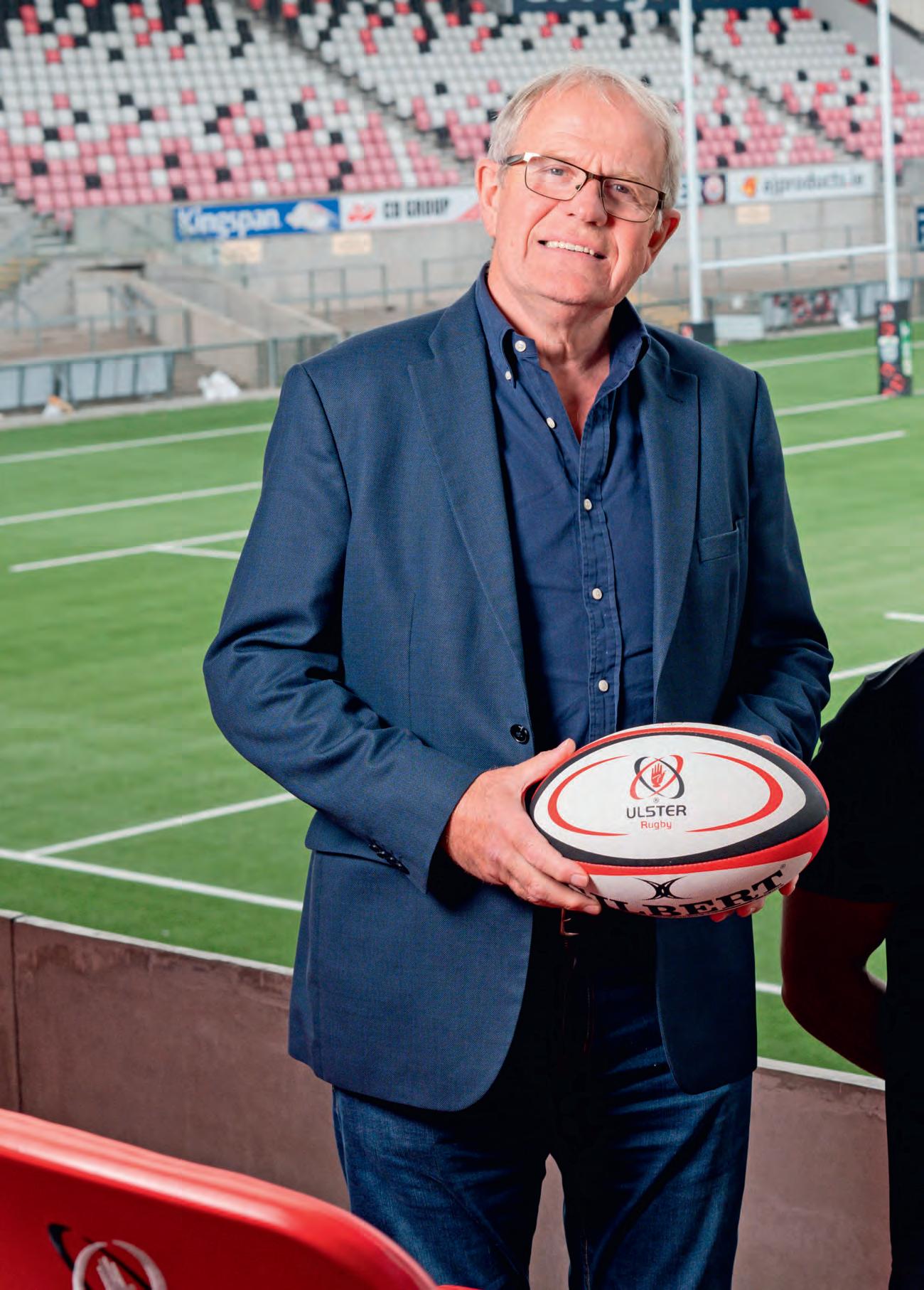


Leading With Purpose

Keystone Group’s first Social Value Report sets a benchmark for how businesses can create lasting impact beyond profit.
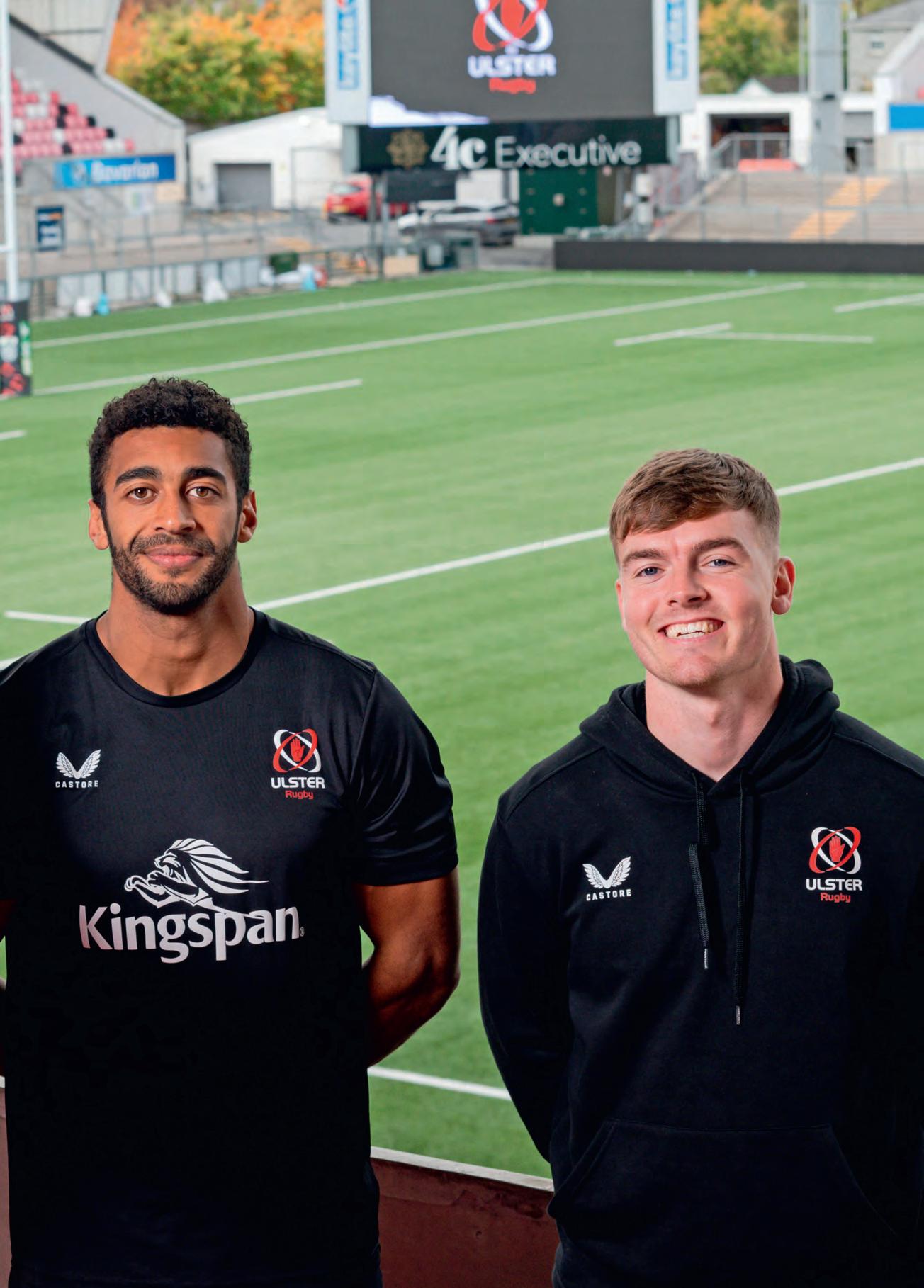
As one of Northern Ireland’s leading manufacturing success stories, the Keystone Group has built a reputation for innovation, growth, and community impact. From its headquarters in Cookstown, the company has expanded across the UK and Ireland, becoming a key player in the construction products sector.
Now, the Group has taken another important step by publishing its first Social Value Report, setting out how it is delivering positive change not only through its products, but also for its people, partners, and local communities.
For Sean Óg Coyle, chief commercial officer at the Group, the report marks more than a milestone:
“This is not about doing what’s expected – it’s about making a meaningful and lasting difference for our people and the communities we’re proud to support.”
The report highlights Keystone’s investment in employee development, community partnerships and building a stronger future for the construction industry through education and skills.
From Innovation to Social Value
Founded in 1989 as a specialist manufacturer of steel lintels, Keystone Group has grown into one of the UK and Ireland’s leading manufacturers of construction products. Over the past 35 years, the Group has built its reputation on innovation, quality and a people-first ethos, consistently delivering solutions that move the industry forward.
Now, Keystone is broadening its focus – placing emphasis on the positive impact it creates beyond its products. The new Social Value Report demonstrates how the Group is embedding social value at the heart of its operations, ensuring its growth directly benefits employees, partners, and communities.
“Our focus on social value, employee well-being, community partnerships and sustainability reflects who we are as a business,” Coyle continues. “It’s about making a lasting difference, not just ticking boxes.”
Four Pillars of Impact
The report is structured around four key pillars: Education, Community, Charity, and Skills – each reflecting an area where Keystone is committed to driving real change.
1. Education
Keystone is passionate about inspiring the next generation of construction professionals. Its Keyskills programme, for example, provides training and development opportunities that help bridge the industry’s skills gap.
Through partnerships with further education colleges, Keystone supports apprenticeships, traineeships, and welding programmes – giving young people hands-on experience and a pathway to rewarding careers.
Owen Coyle, divisional CEO, emphasises the importance of this approach:
“The shortage of skilled tradespeople is a longstanding issue across the sector. By collaborating with education providers, we can relieve financial pressures and redirect resources into developing and recruiting for these essential programmes. It’s a fantastic opportunity to ‘skill up’ a generation of bricklayers and ensure our industry’s future workforce.”
2. Community
Keystone takes pride in being a force for good within the communities where it operates. The Group actively supports initiatives that bring people together and strengthen local spirit. This includes strategic sponsorships, employee volunteering hours, and direct resource support that help build sustainable, long-term benefits.
One example is Keystone’s renewed partnership with Ulster Rugby, which goes beyond sponsorship to reflect shared values of teamwork and development.
“It’s clear that Ulster Rugby is building towards a winning future and we’re proud to be part of that journey,” says Sean Óg Coyle, chairman of Keystone Group.
3. Charity
Charitable giving and fundraising have long been central to Keystone’s culture, and the report captures the scale of its impact. Employees and customers regularly come together to raise funds, donate resources, and champion causes where support is most needed – both locally and nationally.
Lisa McCann, marketing director, highlights the pride felt across the Group:
“We’re incredibly proud of the generosity shown by our employees, customers and supporters. The success of our recent charity initiatives demonstrates the power of coming together as a company to make a real difference.”
4. Skills
Keystone’s commitment to professional development runs through every level of the business. The Group invests heavily in creating opportunities for employees to grow, ensuring a skilled, multi-disciplined workforce capable of setting new benchmarks for the industry.
One recent example is support for engineers achieving CABE Chartered Accreditation, underlining Keystone’s commitment to technical excellence.
“This reflects our dedication to professional growth and sends a clear signal about the high standards we set across the business,” says Hayley Smith, HR director at Keystone Group.
Looking Ahead
The launch of the Social Value Report is both a reflection of Keystone’s progress and a commitment to the future. By embedding social value into its strategy, the Group aims to continue strengthening communities, empowering employees, and creating lasting benefits that extend well beyond its product range.
As Sean Óg Coyle concludes:
“This report isn’t an endpoint – it’s a step in our journey to build stronger communities and support people in meaningful, longterm ways.”
For Northern Ireland’s business community, Keystone’s example shows how manufacturers can grow internationally while still staying true to local roots – creating value that benefits people, places, and industries for generations to come.
“This is not about doing what’s expected — it’s about making a meaningful and lasting difference for our people and the communities we’re proud to support.”
Ranked as Northern Ireland’s top law firm for Planning & Environmental Law by The Legal 500 in:
…we're going to need a bigger page.

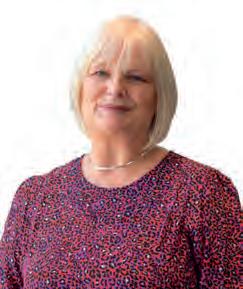
Columnist
Julie Buchanan, Associate Director – Tax – Employer Solutions and Payroll Grant Thornton NI
The Perfect World For Internationally Mobile Working
Internationally mobile work – where employees operate in a different country from their employer –is now typical, with remote and hybrid models on the rise as well as more conventional secondment arrangements.
While this offers flexibility and greater access to talent, it can complicate tax, social security, and payroll compliance.
As organisations explore business opportunities beyond their borders, it is timely that we remind ourselves about the compliance that is needed when managing an internationally mobile workforce. From Grant Thornton’s work with businesses in this space, we have noticed the following questions and challenges arising time and again:
At what point does an organisation need to consider host country tax and payroll compliance?
For most internationally mobile employees, formal agreements specify work locations and assignment specifics, allowing organisations to anticipate compliance needs. However, when mobility arises unexpectedly (due to employee decisions or business requirements), companies may miss key obligations.
This can lead to retrospective registrations, payroll adjustments, tax filings in multiple countries, professional fees and potential penalties for noncompliance. In a perfect world, all organisations with internationally mobile employees will structure their compliance requirements and budget for these costs in advance of any international activity. However, by the very nature of many businesses, compliance is necessarily a reactive process.
This is why it is hugely important that as soon as a business becomes aware of cross-border activity, it reaches out to relevant advisors to allow for the appropriate compliance support to be put in place. Increasingly, immigration and tax authorities are sharing information, creating greater visibility over foreign company employee activity within a host country.
What are the most common challenges for internationally mobile employees?
Beyond host country Social Security and payroll registration requirements, organisations with internationally mobile staff must also consider the potential impact on corporate and indirect taxes when employees work outside their usual country of employment.
Remote workers abroad can inadvertently create a taxable presence for their employer –known as Permanent Establishment – in the host country, potentially exposing the business to extra financial obligations and regulatory scrutiny.
Similarly, the kinds of services delivered by home country employees in a foreign location should be carefully structured and monitored to avoid creating a local VAT establishment, which can result in increased cost and compliance.
Data privacy and security considerations are also often overlooked. As payroll data contains sensitive personal and financial information, all cross-border transfers must comply with regulations such as GDPR. Failing to do so risks data breaches and significant fines.
What drives host country tax liabilities?
The key factor in determining where an income tax liability arises is the employee’s tax residency. Establishing tax residency can be complex and varies by jurisdiction. Payroll withholding is the means of collecting tax from employment earnings. In many cases, employees may be required to file tax returns in both countries, which can lead to additional liabilities or the need to claim foreign tax credits, along with the associated compliance costs of preparing these returns.
Do businesses have to operate host country payroll for one employee?
Payroll compliance is becoming obligatory in many countries. Each jurisdiction has its own unique tax laws, employment regulations, and reporting requirements.
Internationally mobile workers may need to be included on both home and host country payrolls to facilitate remittances. Double tax treaties usually determine which country has the primary taxing right, but domestic laws in both countries can require payroll withholding.
Relief from double taxation may be available through payroll but, if not, employees may need to fund two lots of tax during the year and claim a repayment later.
Ideally, employers should identify cross-border payroll obligations and have relevant foreign employer registrations in place. They should also quantify host country tax and social security withholding rates and apply for real-time tax credit.
Initial in-country registration can be intensive, requiring local bank accounts and taxpayer identification numbers. The lead time for both can be protracted, so it is recommended that employers with visibility of pending cross-border working move their payroll set-up forward at pace.
A closing thought
In a perfect world, tax, social security, and payroll withholding obligations can be identified and costed well in advance of any internationally mobile working. All employer and employee registrations can be implemented, and ongoing home and host country payroll withholding can be made in real time.
Global mobility isn’t just a logistical challenge; it’s a strategic opportunity. As the workforce becomes increasingly international, companies that embrace the complexity and invest in smart, compliant mobility strategies will be the ones that thrive.
The future of work is borderless. Employers who treat mobility not as a headache but as a lever for growth will unlock new markets, attract top talent, and build resilient, globally fluent organisations.





#RevolutionAV













A udio V isua l Cr eati ve Medi a Ev en t Solution s









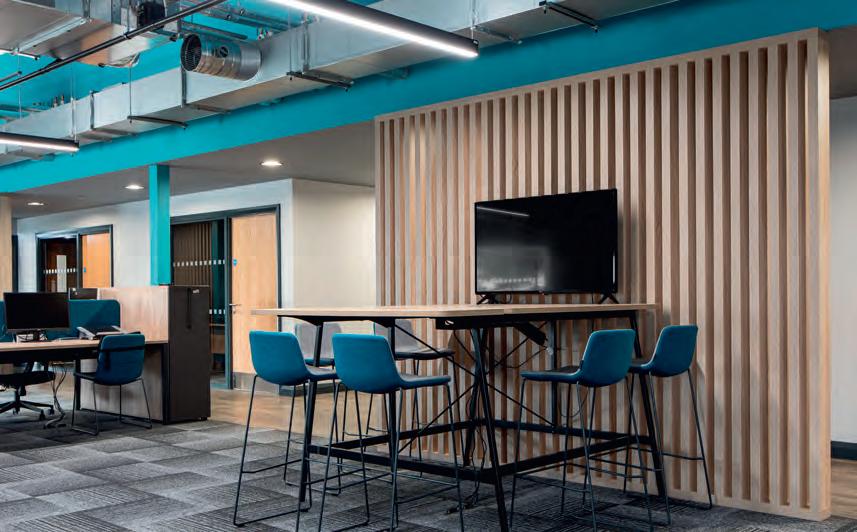


From Tiny Seeds Grow Mighty Oaks – 30 Years of Irwin M&E


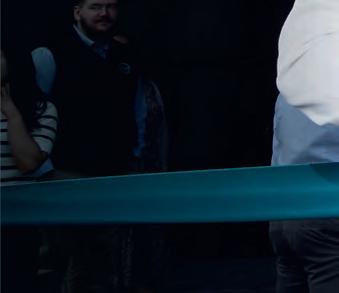


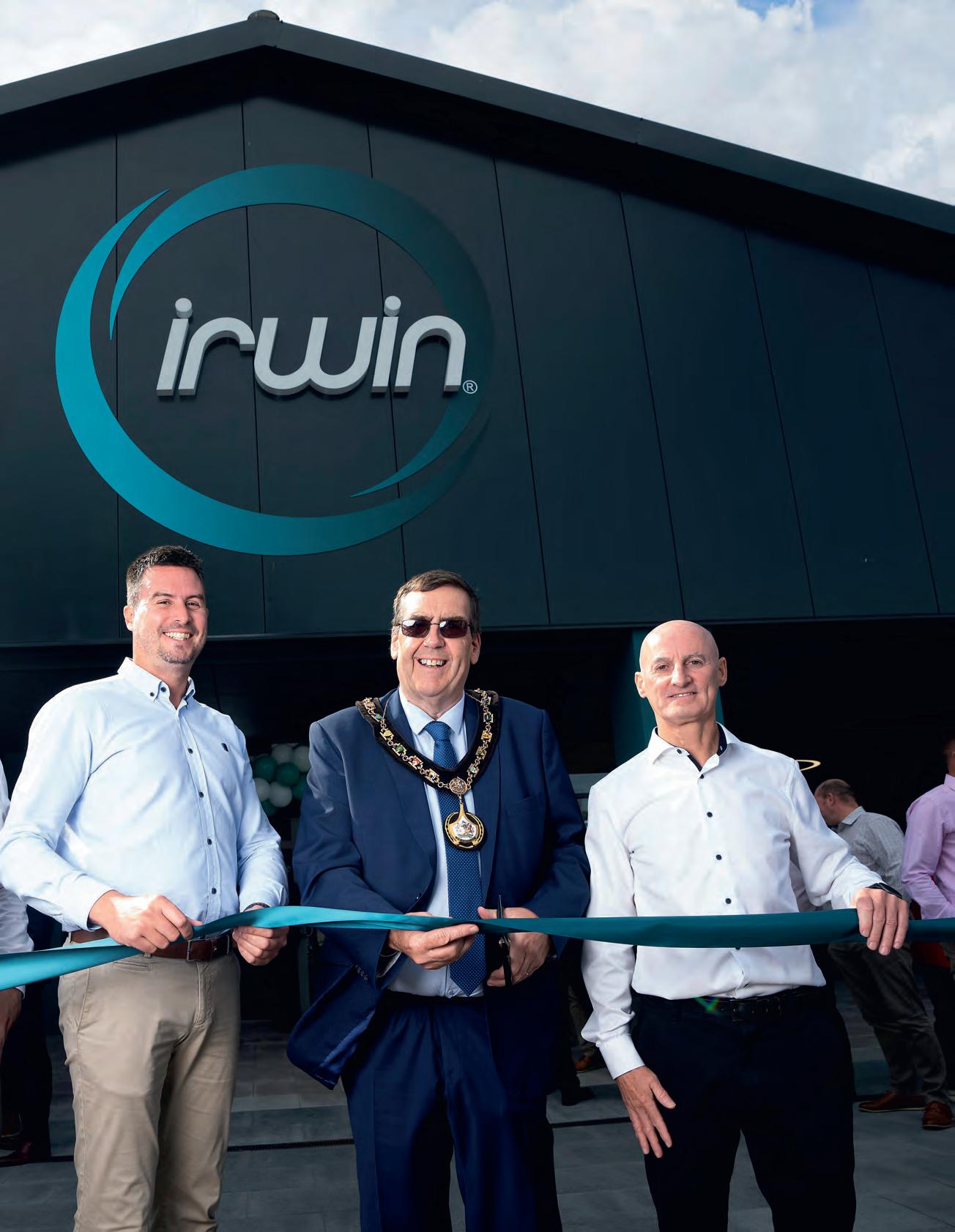
Portadown-headquartered Irwin M&E has been keeping the lights on, both literally and metaphorically, in everything from hospitals to Stormont and the shop on the corner here. As the company marks 30 years in business, Managing Director Keith Stewart reflects on a journey of growth, the people who power it, and the transformation of a former Lidl into their new headquarters – a living showcase of modern engineering and sustainability.
Keith Stewart was working for PwC when John Irwin first approached him to come work for the company. John packaged an offer that sealed the deal for him and would open a door out of a mainstream career and into “a business with real potential,” he says.
That was 2003, when the company had just 35 employees. “Many of those are still here today,” Keith begins. “They’ve watched the company grow and develop into an innovative M&E services business. I don’t take all the praise. We’ve built a strong board of directors, multi-skilled across HR, accounts, operations and other departments. Having that team has been crucial.”
The journey has not been without challenges. “I remember the bad times in 2009 during the property bust and the banking crisis. We had only a month’s work left for the guys. To go from that point to moving into our own purposebuilt headquarters this year, that’s a proud moment.”
On marking 30 years in business, Keith says, “This year is a Mighty Oak Day for us,” harking back to the old proverb, ‘From tiny seeds grow mighty oaks’. “With the official opening of our new HQ building and more than 300 employees, that saying really rings true.”
Originally an electrical-only business, Irwin added mechanical services in 2016 and building maintenance in 2018. Along the way came milestones such as its first £1 million project in London in 2014. “Today we’ve delivered projects in excess of £10 million in the London market,” Keith says. “Angel Lane Student Accommodation in Stratford was our first £2m project in GB in 2015. Since then we’ve delivered high-rise apartments in
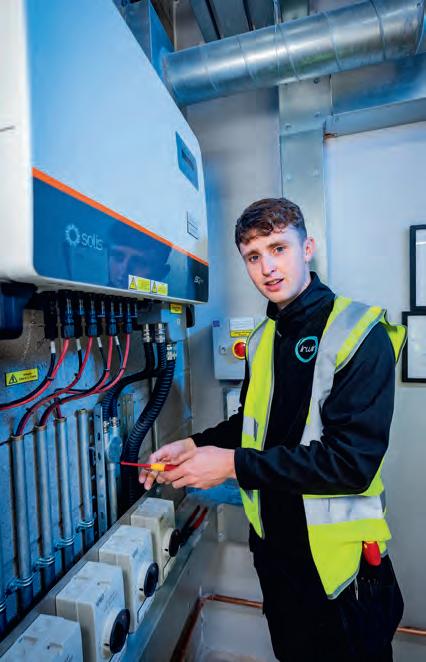
“We currently employ more than 35 apprentices, and our retention rate is high because we can offer so many opportunities post-qualification. We encourage promotion from within, and we’re planning to launch our own Irwin Academy in 2026.”
Wembley and at Southbank beside the London Eye. Closer to home, we’ve done heritage work at Mount Stewart and Hillsborough Castle Visitor Centre, and we currently deliver the largest facilities maintenance contract in Northern Ireland, including Stormont Estate.”
He continues: “People sometimes underestimate what M&E really is. In layman’s terms, we’re plumbing and electrical services. But we see ourselves as the people literally keeping the lights on. Every smart building, every hospital, every hotel; they all need M&E services to function and run efficiently.”
Today, Irwin operates across three distinct divisions: M&E Projects, Facilities Maintenance and Energy & Renewables. “Half our business is the large-scale projects – design, installation and delivery. But the other half is the local work, the small maintenance jobs. We have 150 vans on the road, we’re 24/7, local engineers offering a bespoke service.”
By 2025, growth meant Irwin had outgrown its base. “We had added over 120 staff in just two and a half years. Our old premises were bursting at the seams. When the vacant supermarket came up in Portadown, it gave us a blank canvas and a vast space to do what we wanted. It also gave us the chance to showcase our own engineering. We left ceilings exposed so clients could see the systems. And we wanted to prove you could retrofit a building like that and achieve an A energy rating.”
The former Lidl building is, today, A-rated with high-efficiency air source heat pumps, smart thermostats, heat recovery, integrated 50kW solar PV,
100% LED lighting, smart controls and more than 20 EV charging stations. “We used high-performance insulation and sustainable materials throughout. It’s a building we’re proud of.
“It’s a fabulous place to work,” he adds. “Part of our vision was to create a good place for everyone – comfortable, modern, energy-efficient, with the best IT infrastructure.”
A mezzanine training room has become one of the most used spaces in the HQ. “It allows us to do short, bite-size training without organising external events. We can turn that over quickly and get everyone in for health and safety, technical training and more. It’s bespoke training for our guys.”
Three decades on, Keith is clear about the importance the people at Irwin play in its upward trajectory. “They’re absolutely pivotal,” he says. “In a service industry, you’re only as good as your people. From the start we’ve sought to employ people who care and buy into our positive culture of innovation and growth.”
That culture has been recognised at the Belfast Telegraph and Irish News Employer Awards. He adds, “We currently employ more than 35 apprentices, and our retention rate is high because we can offer so many opportunities postqualification. We encourage promotion from within, and we’re planning to launch our own Irwin Academy in 2026. We’ve built a management team I see as the company’s future leaders.”
Looking ahead, Keith sees energy as the defining opportunity. “Energy has become a precious commodity, and we’ve positioned ourselves as an Energy Service Solutions Specialist. Our Energy & Renewables division has trebled in size in recent years. We’re delivering solar PV, heat pumps, EV charging, combined heat and power, battery storage, energy management systems, the whole spectrum.”
The wider industry is also changing. “Technology has transformed M&E, from 3D design and modelling to cloud-based systems, IoT monitoring and even AI. Smart buildings need smart services. We already use AI for certain tasks and see it continuing to spread.”
What does he hope for the decade ahead? “I want the Irwin brand to be a mark of quality for M&E innovation. I expect us to grow further on the strong foundations of the last 30 years. I want to see many of our existing management grow into company leaders. And I want Irwin to be the leading energy and renewables installer with new technologies and new partners, an employer of choice in Northern Ireland where our people can truly fulfil their career aspirations.”
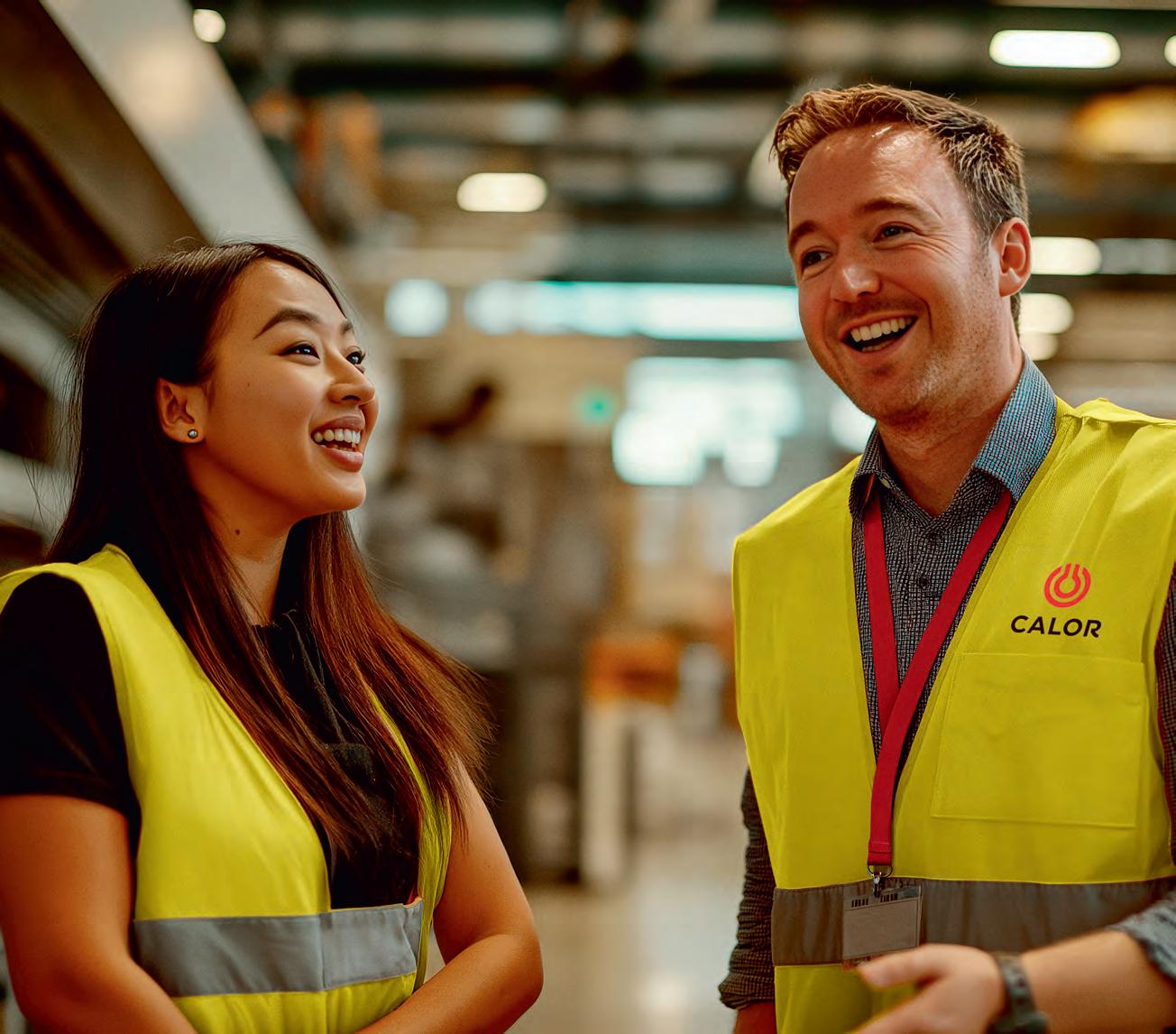
The

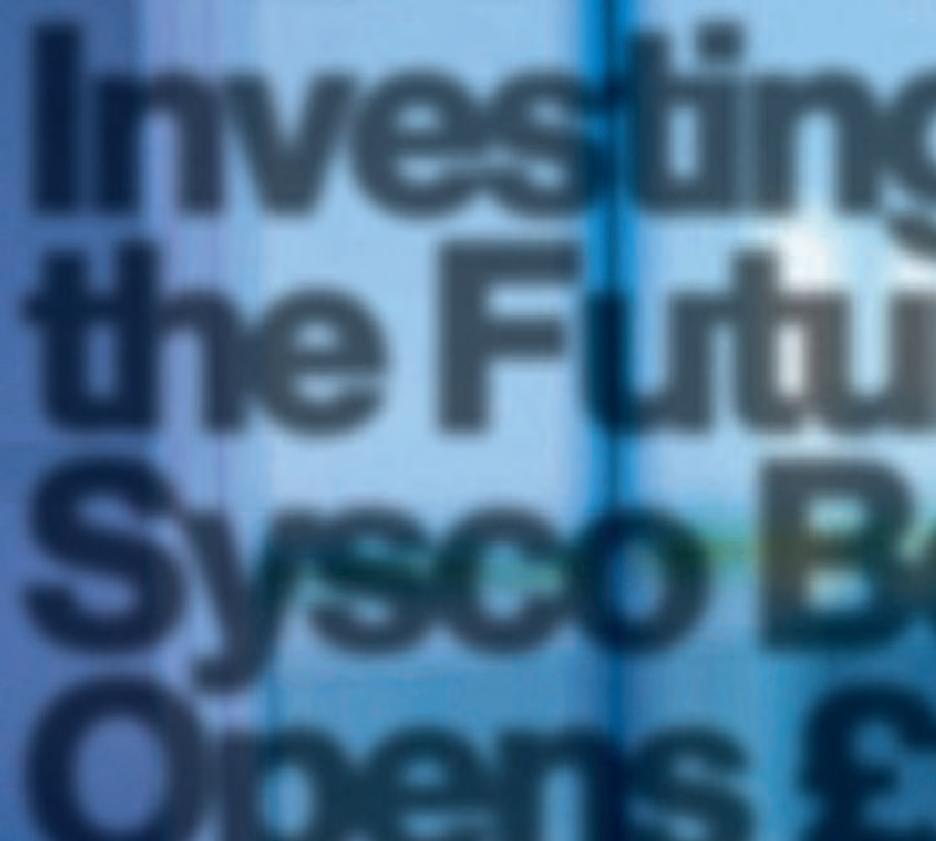

Investing in the Future –Sysco Belfast Opens £23m Facility

STATE-OF-THE-ART FACILITY MARKS MAJOR MILESTONE IN GROWTH, SUSTAINABILITY, AND COMMUNITY INVESTMENT.
Sysco has o cially opened the doors to its £23 million distribution facility, representing a significant milestone in the company’s aim to lead the future of foodservice across the island of Ireland.
A central pillar of the all-island growth agenda, Sysco Belfast is a testament to the company’s enduring dedication to customers, employees, and local communities in Northern Ireland.
Sysco Ireland Chief Executive Mark Lee said, “The launch of Sysco Belfast is a proud moment for everyone at Sysco. This state-of-the-art facility has been designed to support growth, deliver service excellence, and operate sustainably, ensuring we are well positioned to meet the evolving needs of our customers. It is also a place for colleagues to thrive and where strong local partnerships can continue to flourish.”
Built to BREEAM sustainability standards, the 180,000 sq ft site was designed from the ground up with environmental responsibility in mind. It features 2,600 high-efficiency solar panels capable of generating up to 803MWh of electricity annually, and reducing carbon emissions by over 5,000 tonnes by 2045.
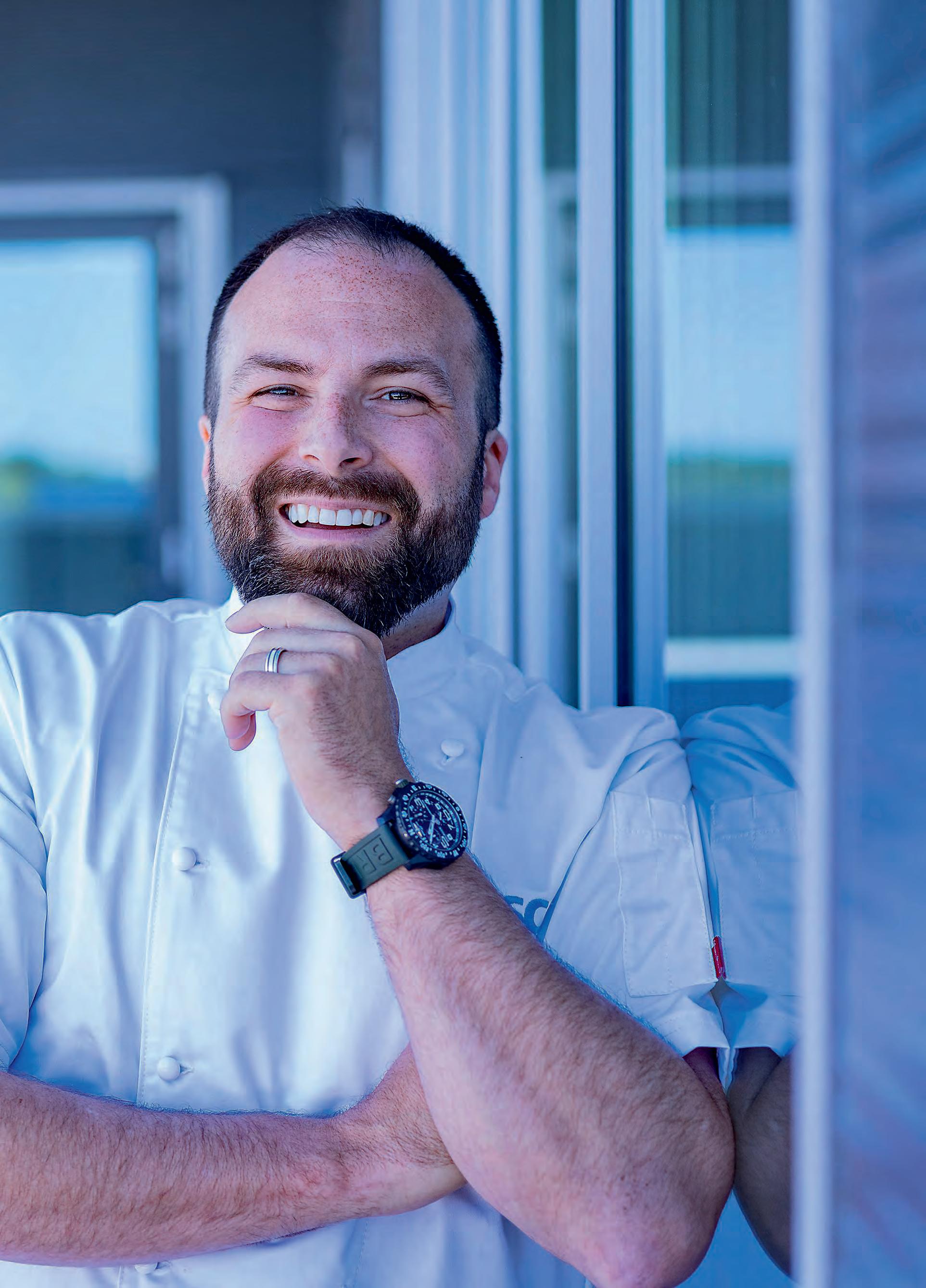
Rainwater harvesting on site and sustainable water management systems reduce reliance on mains water, while a pioneering natural refrigeration system, using a refrigerant with a global warming potential of one, has been installed. Waste heat from the refrigeration process is also recycled for underfloor heating and domestic hot water.
The landscaping was also developed to support biodiversity, reflecting Sysco’s holistic approach to environmental stewardship.
The landscaping was also developed to support biodiversity, reflecting Sysco’s holistic approach to environmental stewardship.
“Sustainability isn’t a side project; it is embedded into all our operations. Sysco Belfast demonstrates our commitment to tangible impact through focused, sustainable investment,” said Mark.
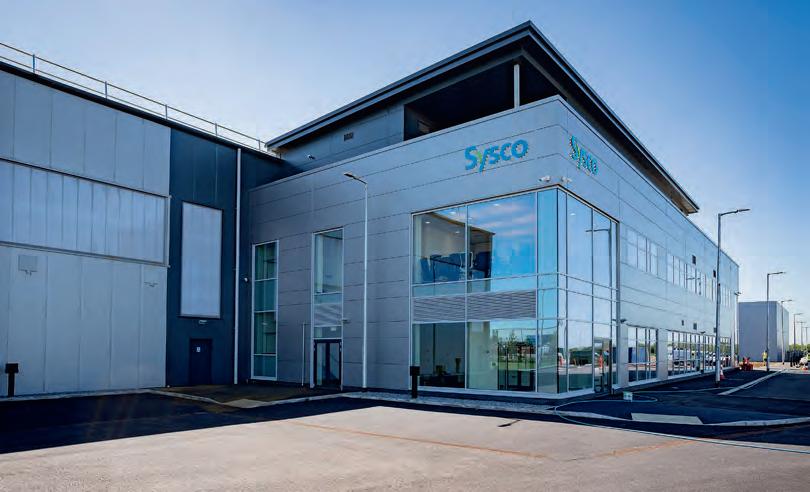
The Belfast site also marks the launch of a major fleet decarbonisation initiative. All vehicles operating from Northern Ireland depots use Hydrotreated Vegetable Oil (HVO), a cleaner alternative to diesel that significantly lowers emissions.
With a 224-strong fleet serving more than 10,000 customers across Ireland, this transition represents a major step in Sysco’s wider climate strategy.
Mark added, “From powering our fleet to how we build our facilities, we are focused on the long term. This is about futureproofing our business and supporting a more sustainable foodservice sector.”
Investing in People
As part of its Northern Ireland expansion, Sysco launched a recruitment drive earlier this year, creating 50 new roles and increasing its local headcount to over 300.
Among the new appointments is Kyle Greer, one of Northern Ireland’s most respected culinary leaders, who joined Sysco Belfast as development chef. In his role, he will lead a new programme supporting the hospitality industry around smarter kitchens, sustainable sourcing, and the next generation of culinary talent.
“We’re thrilled to welcome Kyle to the team,” said Mark. “His expertise and passion align perfectly with our values, and he will play a central role in our new development kitchen here in Belfast, creating opportunities to innovate, educate, and inspire.”
The kitchen, which opened alongside the wider facility, is designed as a space to test, refine and co-develop solutions with Sysco’s customers and partners across the region.
Mark continued, “While food is at the heart of everything we do, our people are our driving force. This investment reflects our confidence in Northern Ireland and our commitment to building an innovative team that can continue to deliver exceptional service.”
Strengthening Local Supply Chains and Enhancing Convenience
Sysco has further expanded its offering of over 10,000 products, with a portfolio of regional brands, reflecting its commitment to supporting local suppliers.
The company recently announced an exclusive distribution deal with Long Meadow Cider, an award-winning, family-run producer based in County Armagh.
This partnership follows more recent additions, including Co. Armagh’s Forest Feast, known for its innovative plant-based snacking products, and Maine 1949, a premium range from QuenchCo Ltd., makers of one of Northern Ireland’s most iconic soft drink brands.
Mark stated, “Adding Forest Feast, Long Meadow, and QuenchCo to our portfolio further strengthens our customer
offering. These partnerships underscore our commitment to championing exceptional local brands that are equally invested in sustainability, quality, innovation, and authenticity.”
Adding greater convenience for customers comes in the form of the introduction of Sysco Your Way, an initiative offering a flexible, customer-first solution, with no order minimums, sameday delivery, late-night ordering up until 11.45pm and delivery options seven days per week. The service already supports more than 300 restaurants, cafés, and food businesses across Northern Ireland, helping to streamline supply and ensure reliable service.
Food with Purpose
Sysco has also taken meaningful steps to support local communities. The company recently announced a £50,000 partnership with charity Meals & More to fund summer holiday clubs for children at risk of holiday hunger.
The initiative will deliver 14,000 nutritious meals, along with inclusive activities to ensure children feel connected and supported during the holidays.
Mark added, “It is a sobering statistic that around one in five children in Northern Ireland are living in relative poverty. At Sysco, we understand how important nutritious food is, not just for health, but for bringing communities together. We’re proud to help raise awareness and work towards a brighter future for children most in need.”
A Bold Step Forward
With its new site and growing team, Sysco is setting the pace for a more resilient, sustainable and community-focused foodservice industry.
At the heart of this is Sysco Belfast which will serve as both a regional hub and a model for the company’s future.
Mark concluded, “Northern Ireland is fundamental to our allisland strategy and this investment demonstrates our ambition to lead the future of foodservice. We are excited for what lies ahead.”
“Sustainability isn’t a side project; it is embedded into all our operations. Sysco Belfast demonstrates our commitment to tangible impact through focused, sustainable investment.”
Fostering inclusive workplaces isn't just 'the right thing to do' – it's a business imperative.


By shaping a workplace culture that fosters collaboration, inclusion, and fresh perspectives, you create an environment where employees thrive –and your business grows. g a

Embedding a culture of inclusion at NI Water and driving lasting ED&I progress have been supported by the Diversity Mark accreditation, which has been instrumental throughout our journey.
Embedding a culture of at NI Water ED&I progress have been the Diversity Mark which our journey.
Sara Venning, Chief Executive, NI Water
Sara Ve V nning, Chief NI Water
Take the first step
Visit our website to book a call with one of our team
Take the first step our to book a one our team

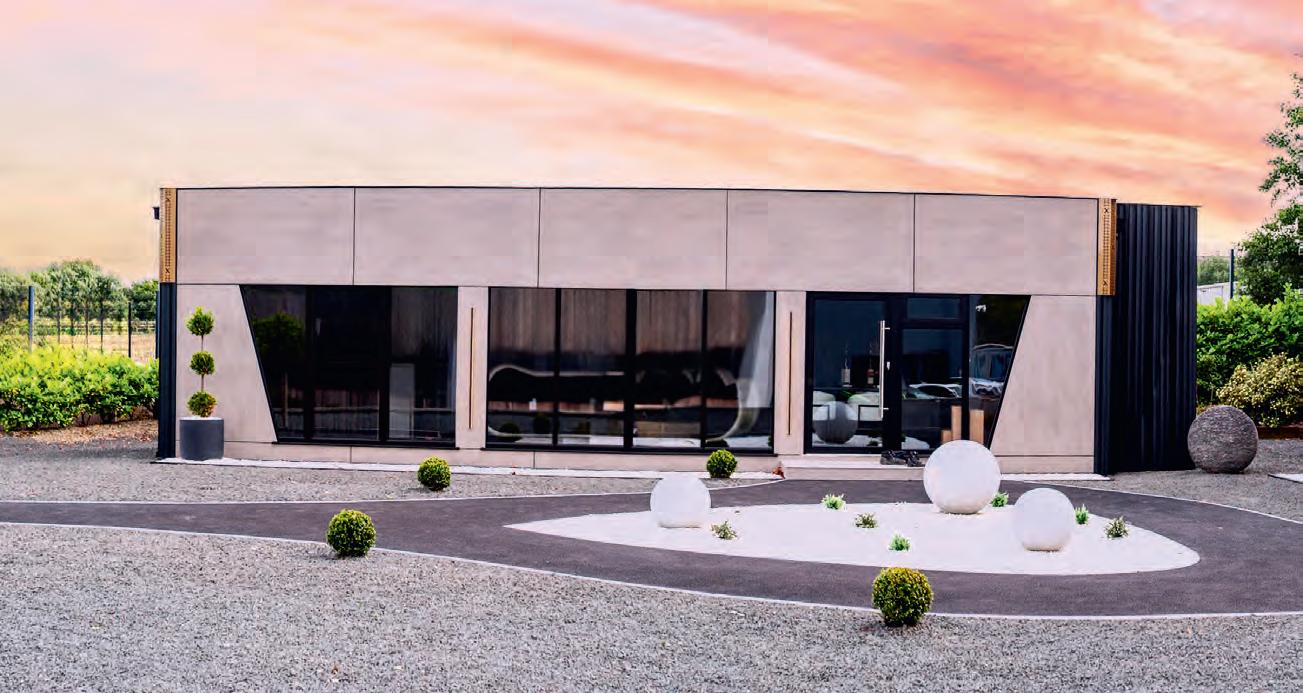
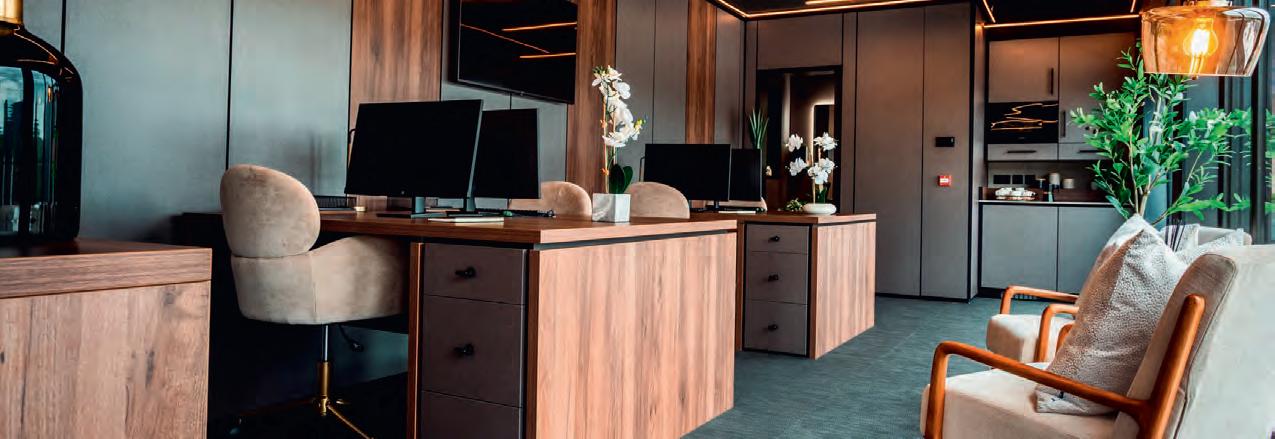
500 to 5000sq ft options available
Crafted off‑site, perfected on site
Each workspace is fabricated in our state-of-the-art facility by specialist trades, then delivered and installed on your prepared site. Expect immaculate detailing, consistent quality and a move-in that feels effortless.
Tech‑ready
Power, data and cable management are integrated from the start, with considered positions for screens and conferencing hardware. Lighting is layered, ambient, task and accented so you look and feel your best on calls and in client meetings.
Less waiting, more working
With most of the build completed off-site, installation and commissioning are measured in days and weeks, not months. You’ll have a clear programme before we begin.
A turnkey experience
From planning guidance to landscaping interfaces and interior styling, we coordinate the process. You’ll have a single point of contact and transparent updates throughout.
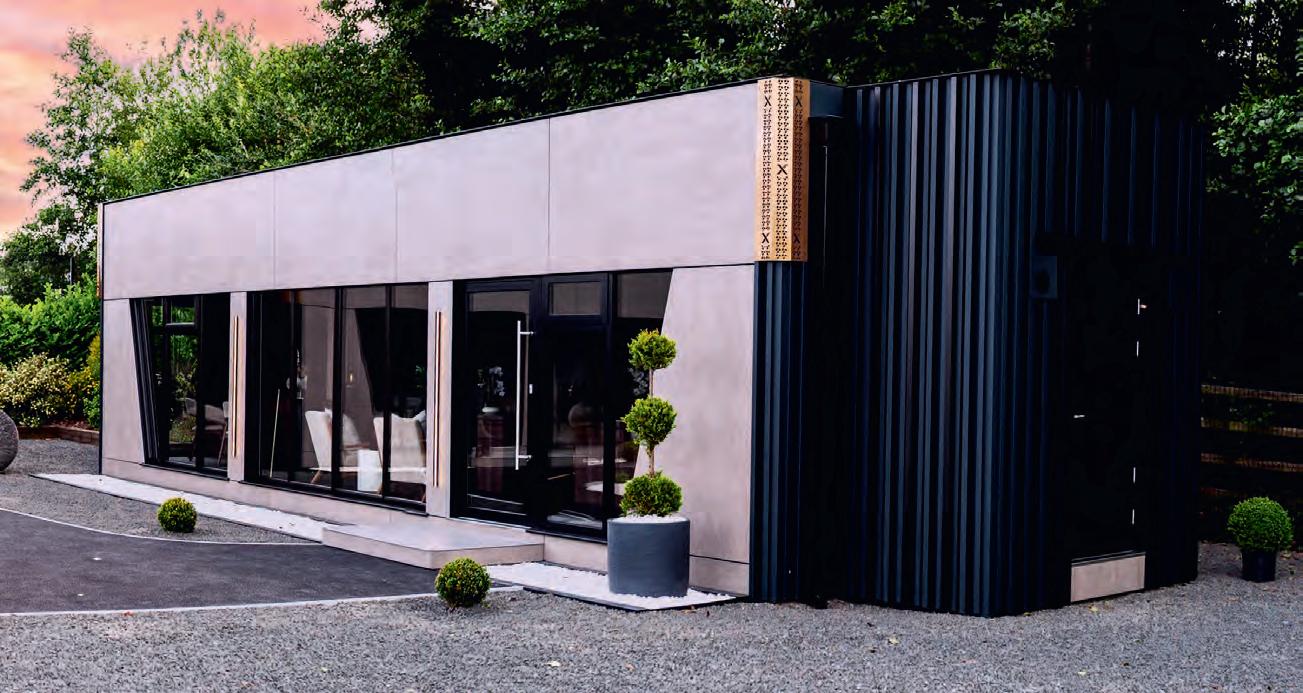
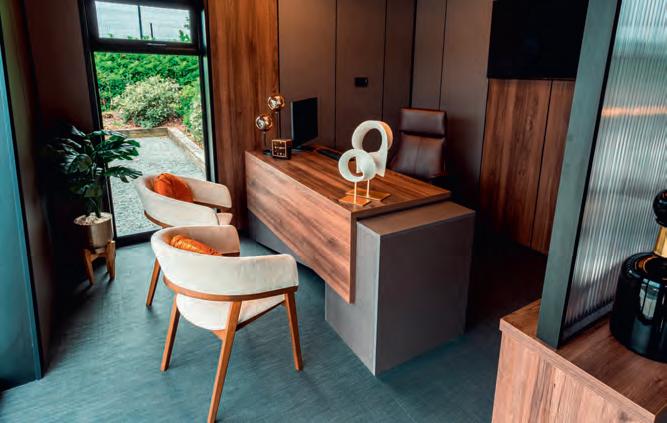
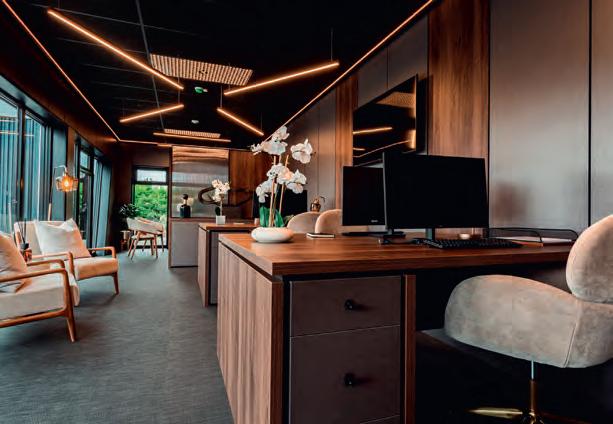
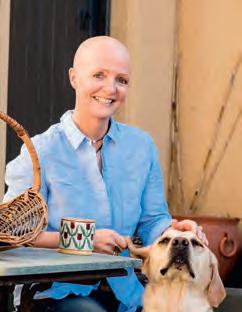
Columnist
Jane Shaw Health Coach & Therapist
The Power of Inner Guidance
In the fast-paced world of business, we often prize logic, strategy, and external data above all else. Spreadsheets, forecasts, and reports give us a sense of security, offering concrete evidence on which to base decisions. However often some of the most profound breakthroughs, whether professional or personal, arise from something deeper: an inner guidance system that is available to all of us, if only we learn how to listen. The boardroom whiteboard or the data dashboard don’t always have the best answer.
As a coach, I often describe this as reconnecting with our inner compass – that quiet, intuitive voice that sits beneath the noise of deadlines, emails, and meetings. In a climate where leaders are expected to make complex decisions quickly and under pressure, tuning into this inner guidance is essential; it is not just for fun.
Staying Present with Our Inner Cues
The first step to accessing inner guidance is presence. This is easier said than done in modern business culture, where multitasking is celebrated. But the paradox is clear: the more divided our attention, the less clarity we have.
Presence requires us to slow down and notice subtle internal signals. These may be sensations in the body – tightness in the chest, a sudden lightness in the belly, or a gentle warmth when we are moving in the right direction. They may also be fleeting impressions or a quiet hunch about a situation. To be present with these cues, we need to cultivate the ability to pause, breathe, and check in, even in the middle of a busy day.
Presence also involves balance. It is not about disappearing into inner experience and ignoring the world around us. Instead, it is about maintaining awareness of both the inner and outer landscapes. Imagine being in a meeting: while listening carefully to what is being said, you also notice a quiet tension in your stomach as a proposal is presented. That inner cue may hold valuable information, nudging
you to ask a question, seek clarity, or approach the situation with caution. Staying present means honouring both realms simultaneously.
Interoception:
The Science of Inner Listening
Modern neuroscience offers us language and tools to understand these inner processes. Interoception, which is the ability to sense the internal state of our body, is emerging as a key factor in emotional intelligence, decision-making, and resilience.
When we tune into our heartbeat, our breathing, or the subtle changes in our gut, we are engaging in interoceptive awareness. Sometimes it may be referred to as visceral intelligence. Research shows that individuals with higher interoceptive sensitivity tend to be better at regulating emotions and making sound decisions under pressure. In business, this translates to leaders who remain calm, grounded, and able to steer their teams through uncertainty.
Cultivating conscious interoception can be as simple as taking short pauses during the day to scan the body and notice sensations without judgment. Over time, this strengthens our ability to detect intuitive signals before they are drowned out by mental chatter.
Sensory Intuitive Knowing
Linked to our interoception lies what many call sensory intuitive knowing. This is when the body communicates information before the mind has processed it. We might walk into a room and instantly sense the atmosphere, or meet someone new and feel an immediate impression that later proves accurate.
Business leaders often recount “gut feelings” that guided pivotal decisions: choosing a partner, walking away from a deal, or seizing an opportunity that didn’t look promising on paper. These are not accidents; they are the fruits of an integrated intelligence that draws on both conscious analysis and subconscious processing.
Developing this form of knowing requires us to trust our body as a source of wisdom. Practices like mindfulness, somatic coaching, and reflective journalling help us notice and value these subtle forms of intelligence.
Ancient Wisdom Meets Modern Science
While neuroscience offers exciting validation, the truth is that human beings have always known the importance of inner guidance. Ancient traditions across cultures have emphasised the body-mind connection, intuition, and the wisdom that arises in stillness.
From the Greek Oracle at Delphi’s timeless maxim “Know thyself”, to the meditative traditions of the East, to the Celtic attunement to natural rhythms here in the Ireland, we see echoes of the same insight: true guidance arises from within.
Modern science, far from replacing this wisdom, is now confirming it. Or example, the study of the gut-brain axis, shows how the enteric nervous system in the gut communicates directly with the brain, influencing mood, decisionmaking, and even creativity. What we casually call a “gut feeling” is, in fact, a sophisticated network of neurochemical communication.
For business professionals, this means that wellbeing practices are foundational to performance, not separate from it. Attending to nutrition, sleep, and stress reduction directly enhances our intuitive clarity and decision-making capacity. The healthier the dialogue between brain and gut, the sharper our inner guidance becomes.
In an age of rapid change and information overload, relying solely on external data leaves us vulnerable to burnout and poor judgement. Inner guidance, cultivated through presence and intuitive knowing, offers a vital counterbalance.
Ultimately, inner guidance is practical rather than mystical. It is about learning to listen, to trust, and to lead from within.
For everyone who knows that life is for learning as well as for living.
Practical, real-world solutions tailored to your unique needs
Professional Skills Development
Our diverse training portfolio and 40+ expert facilitators will enable you to achieve excellence and stay relevant in today’s rapidly evolving workplace. Start your development conversation with the team at AKU today.




Electric Vehicle Grant Schemes Key To Delivering A Green Future


Ambition speaks to Weev CEO, Philip Rainey, about the EV Infrastructure Action Plan for Northern Ireland.






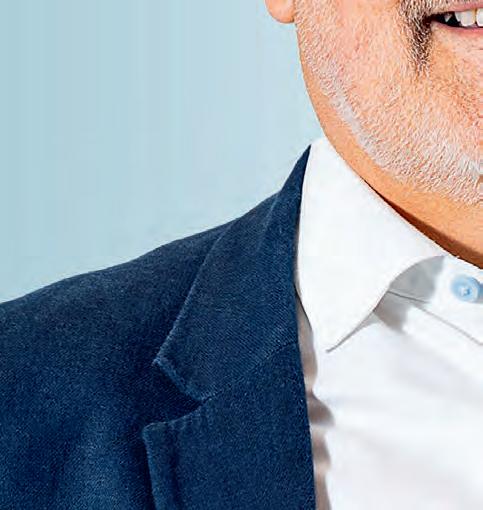









The EV Infrastructure Action Plan for Northern Ireland, published in 2022, set out a series of key actions for delivery of a new, expanded and more accessible EV charging network. These included EV charging points at park and ride facilities, review of connection costs and future-proofing electrical capacity at key strategic sites along key transport corridors. The purpose of these changes was to expand the EV charging network throughout Northern Ireland which would encourage further EV ownership and boost consumer confidence.
Also complimenting the Action Plan is a wide range of EV grant schemes, from the Office for Zero Emission Vehicles (OZEV) for Northern Ireland business to make the switch to a greener, zero emissions electric vehicle.
Businesses can avail of EV grants which cover up to 75% of the cost of installing EV charging sockets to their parking sites. Workplace and depot charging schemes provide support for organisations and businesses with the cost of installing EV sockets – a prime solution for those who may wish to electrify their company fleet to achieve net zero transport emissions. The cost of doing business has become a burden for many local businesses across Northern Ireland with inflation and wider economic conditions making it more difficult for our local businesses to grow and expand their contribution to decarbonisation on the road to net zero. Many may ask: is an EV grant worth the time and effort for my business? Can an EV grant really help decarbonise my business fleet? By April 2025, the Workplace Charging Scheme in Northern Ireland funded the installation of 1,044 charging sockets across Northern Ireland, so the answer would be ‘yes’ to both questions.
Each of these funded installations has delivered reductions in cost to power company vehicles, reduced employee reliance on petrol or diesel motors and contributed significantly towards reducing carbon emissions for many local businesses across the region. Whether a construction company running a fleet of small vans or an office-based firm providing company cars for employees, the Workplace Charging Scheme provides the best road towards carbon emissions reduction.
Many businesses will look to best practice from partners and industry leaders before making the switch to EVs. NI Chamber has replaced its company car with a fully electric vehicle, significantly
cutting emissions and aligning transport choices to reduce their carbon footprint. The organisation has also installed workplace EV charging points, supporting both operational efficiency and staff convenience.
To further encourage adoption and support its team, NI Chamber has introduced a salary sacrifice scheme that enables employees to access EVs in a cost-effective way. This forwardthinking initiative not only promotes the early uptake of electric vehicles but also strengthens staff retention by offering meaningful, future-focused employee benefits.
Recently, NI Chamber’s CEO Suzanne Wylie remarked on the work that NI Chamber and the many businesses around Northern Ireland have already begun to build a greener, sustainable
“Weev, alongside the many other charging point operators, has worked extremely hard in recent years to expand the public charging point network throughout Northern Ireland. New, high-powered, quick charging stations are now dotted along some of our main roads providing a vital connection to the grid for many commuters each day. ”
future through EV ownership. NI Chamber’s example to local businesses throughout Northern Ireland shows us that the transition to EVs is achievable, beneficial and a key part of futureproofing business operations. For many businesses locally, transition to EV ownership will make a positive impact on their staff and their customers.
Business cannot power the switch to electric vehicles alone. Government must continue to develop new policies to ensure EV ownership continues to grow – the ZEV mandate’s introduction to Northern Ireland earlier this year was one such step in the right direction. By introducing new targets for EV manufacturing and EV ownership, government can set the right tone for consumer confidence in the EV industry. Most recently, the introduction of a new electric vehicle grant of up to £3,750 will further support consumer uptake.
Boosting consumer confidence in the EV sector is the most important part of the jigsaw for the transition to net zero vehicle emissions. The more we can encourage people to choose an EV as their next car, the more confidence is built within the industry. We can only do this by alleviating the concerns of business and consumer about electric vehicles and educating them about the real benefits of an EV.
Weev, alongside the many other charging point operators, has worked extremely hard in recent years to expand the public charging point network throughout Northern Ireland. New, highpowered, quick charging stations are now dotted along some of our main roads providing a vital connection to the grid for many commuters each day. To expand the public charging network further, government must continue to encourage further EV ownership among consumers.
The EV grant schemes available to both business and consumer are vital to ensure Northern Ireland continues along the road to net zero and government must ensure that EV ownership is as sustainable and affordable for business as it is for the consumer. The extension of the OZEV grant scheme across the UK earlier this year was a key component of this.
Businesses throughout Northern Ireland can reduce their reliance on fossil fuels and reduce the cost-of-doing business with net zero transition for their company fleets or employee vehicles. The question for is: are you ready to power up your business with EVs?

3T Secures Contract With Belfast City Council As First Client For Locally Generated Renewable Electricity
Following the recent completion of their five-year wind farm project located near Mallusk, the team at Northern Ireland’s only supplier of 100% locally generated renewable electricity for businesses, 3T Power, have confirmed their first client to benefit from the wind power generated in the Belfast Hills.
Belfast City Council has joined 3T Power’s growing portfolio of clients based across Northern Ireland who are lowering their carbon footprints and supporting local economies by choosing renewable electricity generated locally in Northern Ireland.
By supplying a constant and traceable source of electricity to the council’s vast estate, the partnership between Belfast City Council and 3T Power highlights the council’s ongoing commitment to transition to a low-carbon economy while also creating opportunities for green growth.
In addition to supporting the council’s sustainability goals, the development highlights the council’s continued efforts to modernise and future-proof the brick and mortar of our capital city including office buildings, leisure centres and community hubs.
Through their new 10-megawatt wind
farm on the outskirts of Belfast, which includes five refurbished wind turbines previously installed in the Netherlands, 3T Power will generate enough renewable electricity to power the equivalent of 8,100 homes per year.
Commenting on its recent completion, 3T Power Director Thomas Kelso said, “The development of a wind farm on the doorstep of Belfast has been years in the making and we are proud to see the site going live this autumn. This significantly increases 3T Power’s capacity, and Belfast City Council’s confirmation as the site’s first customer reflects the leadership position the Council has taken on embracing sustainability and lowering its carbon footprint.
“We look forward to additional businesses from Belfast and beyond joining in partnership through our Renewable Energy Adjustment tariff, which enables customers of all sizes and energy requirements to benefit from price transparency, a clearer idea of where their power comes from, and the ability to lower costs when green power is more plentiful on the grid.”
Entries Now Open for 2025 Belfast Telegraph IT Awards in Partnership with Telefónica Tech
The 2025 Belfast Telegraph IT Awards in partnership with Telefónica Tech have been launched, with entries now open.
The eagerly-anticipated awards ceremony, which has become an important fixture in the Northern Ireland IT industry, will be held in the MAC Theatre in Belfast on 14 November.
The launch, attended by key players in the industry, was held recently in the offices of Telefónica Tech in Catalyst in Belfast.
Ellen Dickson, vice president of Enterprise Health Services at Telefónica Tech, said: “As the title sponsor of the Belfast Telegraph IT Awards, Telefónica Tech is delighted to announce the launch of the 2025 Awards, a celebration of the innovation, talent and world-class digital leadership thriving right here in Northern Ireland.
“As our tech sector continues to grow and evolve, these awards provide a vital platform to recognise the individuals and organisations shaping our future and I
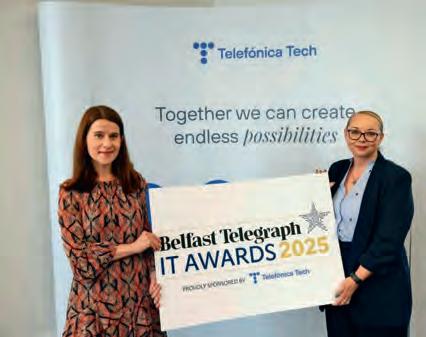

encourage anyone within the industry to consider entering.
“We look forward to honouring their achievements and shining a spotlight on the incredible work happening across the industry on what is guaranteed to be a fantastic night as always.”
Ed McCann, director of publishing at Mediahuis Ireland, publisher of the Belfast Telegraph, said: “We’re delighted to launch the 2025 Belfast Telegraph IT Awards in partnership with Telefónica Tech.
“Since our first IT Awards event in 2019, they’ve grown to become an important showcase for the IT industry and its highest-achieving companies and people.
“There are many headwinds facing the industry, from AI to talent retention, but it’s a sector which has much to celebrate, and we’re proud to play our part in that.
“Thank you to Telefónica Tech for their support of the awards, and for hosting the launch at their offices in Catalyst.
“We look forward to seeing everyone on awards night on 14 November, and wish everyone the best of luck with their entries.”
A panel event was held to discuss challenges and opportunities facing the industry, from AI to talent retention and the global trading environment.
This year, to reflect the fast-evolving nature of the industry, the categories have been altered to reflect the growing importance of AI and other trends.
To enter the 2025 awards, please visit: www.belfasttelegraph.co.uk/events/ entries-now-open-for-2025-belfasttelegraph-it-awards-in-partnership-withtelefonica-tech/a557818904.html








Discover the truth about talent from the number 1 recruitment consultancy in Northern Ireland.
At MCS Group, we know the truth about talent. From finding the ideal candidate, to keeping them happy and even just keeping them, we listen to the industry and know what business leaders want. Our understanding of the issues facing today’s employers will help guide you to the right people with the right mindset from the outset.
To find out how we can help your business or organisation to find and retain the best people, visit our website or call us on 028 9023 5456 or email us at talent@mcsgroup.jobs
mcsgroup.jobs/talent

Columnist
Greg Boyd Economist at PwC Northern Ireland
Growing for the Future
PwC’s Good Growth for Cities report ranks cities across the UK based on their performance in areas that matter most to the public, ranging from jobs and incomes to environmental sustainability. Belfast has performed well in the latest report, positioned 14th among 50 UK cities, showing resilience in the challenging economic environment of recent years. This ranking not only highlights the city’s strengths but also gives us an idea of the big areas of opportunity for improvement, particularly in skills development and entrepreneurship.
On home turf, Belfast has strong scores in work-life balance and commuting times, which might help explain why official statistics rank Northern Ireland as the happiest part of the UK. The city’s work-life balance, characterised by a lower percentage of the workforce engaging in long hours compared to national averages, points to a more flexible working environment. This balance isn’t merely a statistic – it’s an opportunity to attract and retain talent, particularly students who are choosing the city for their studies. While Belfast also scores well for having a low rate of unemployment, this masks a more complex challenge of economic inactivity, exacerbated by long-term illness and disability. This has negatively impacted health outcomes, with the city recording the lowest life expectancy in Northern Ireland. Addressing these issues requires a holistic approach, merging improved healthcare access with initiatives targeting economic inclusion for inactive demographics. By dismantling barriers
to employment and improving health outcomes, the city can not only uplift individual livelihoods but also fortify its economic resilience.
Education and skills remain at the heart of Belfast’s growth strategy. While the city’s young demographic has impressive skills, the skills of those aged over 25 lags behind the UK average. Encouragingly, efforts to embed a skills-first mentality are already bearing fruit. This focus on education is pivotal in ensuring a pipeline of talent ready to enable productivity-led growth for the city.
The city’s housing landscape, historically seen as more affordable than other UK cities, is experiencing shifts as house price growth outpaces earnings. This dynamic threatens homeownership prospects, especially for younger residents. This is exacerbated by a tightening rental market that places further pressure on those unable to buy.
Business start-up performance remains an area requiring attention. Barriers to starting a business need to be addressed, alongside developing pathways to enable our local businesses to scale globally. Alongside this, revitalisation of Belfast’s high streets is another work in progress. While the pandemic accelerated retail shifts, initiatives like Vacant to Vibrant are beginning to inject life into empty spaces, fostering a more diverse, sustainable city centre.
In essence, Belfast’s journey is one of transformation and adaptation. By investing in people and infrastructure, the city can carve a prosperous path forward, maintaining and enhancing its standing as an engine for growth.
“On home turf, Belfast has strong scores in worklife balance and commuting times, which might help explain why official statistics rank Northern Ireland as the happiest part of the UK. The city’s work-life balance, characterised by a lower percentage of the workforce engaging in long hours compared to national averages, points to a more flexible working environment.”



























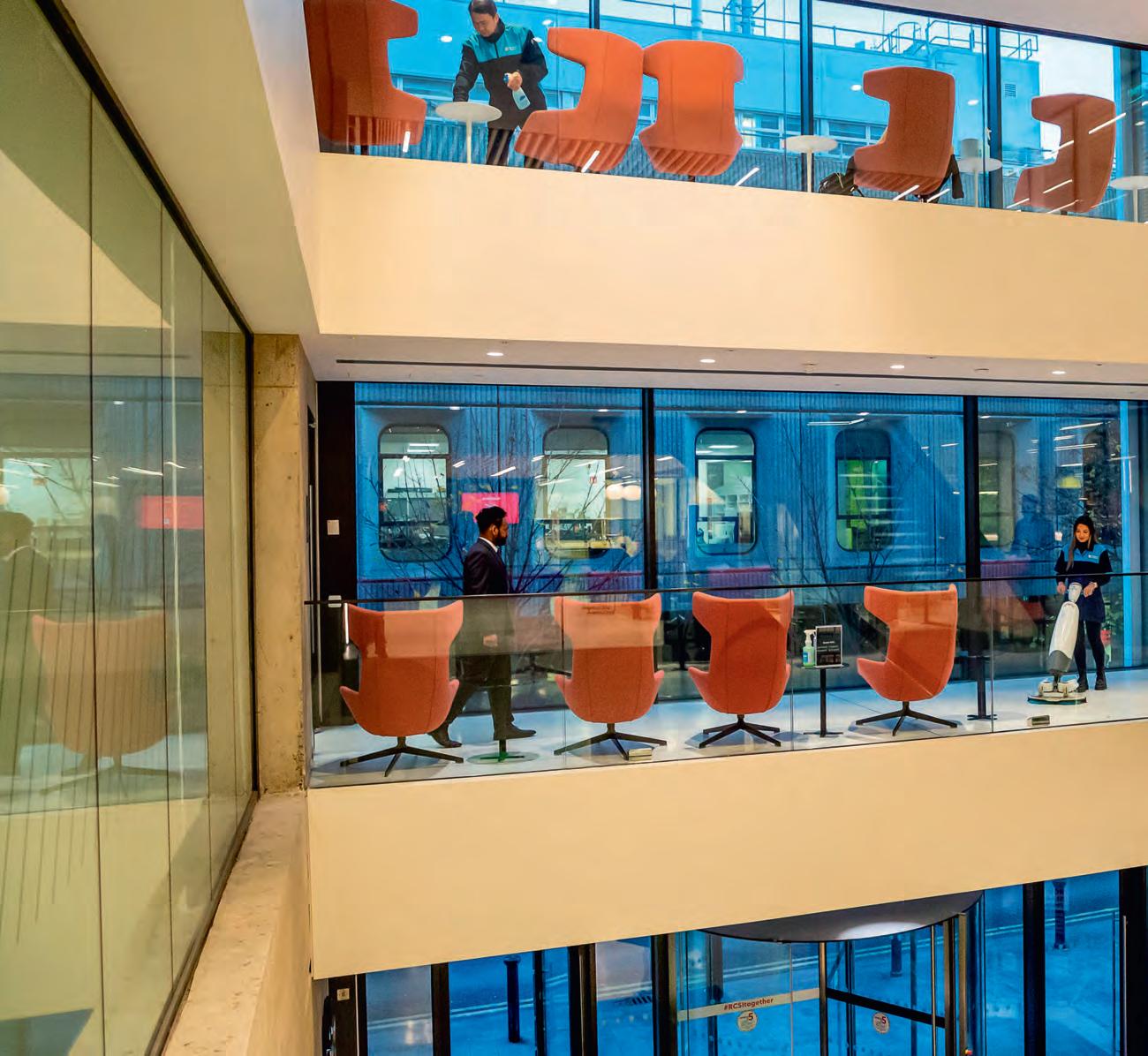

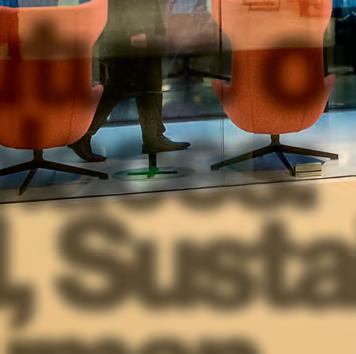

The Future of Workplaces: Hybrid, Sustainable, and Human
By Peter Smyth, Director of Technology, Bidvest Noonan
The way we work has continued to evolve over the past few years, and big questions remain about what comes next. Will we return to the o ce full time? Will remote working endure? How will AI reshape jobs and workflows? As Northern Ireland’s largest FM company, we see workplaces across every sector every day, giving us a clear view of what’s changing and what’s working. Here’s our perspective.
REMOTE WORKING IS HERE TO STAY, BUT SO IS THE OFFICE
Many people ask if the office is still relevant. The answer is yes. Working from home has real benefits, but the office is where culture, creativity, and collaboration thrive.
Across Northern Ireland and beyond, businesses are reshaping their workplaces. Offices are moving away from rows of desks. Instead, we see more open layouts, shared areas, and spaces designed for teamwork. Breakout zones and technology-enabled meeting rooms are replacing old models. The goal is simple: give people the best of both worlds, the quiet focus of home, and the energy of face-to-face collaboration.
Facilities managers are leading this change. We design and manage spaces that encourage connection, improve productivity, and make the workplace a place where people want to be.
SUSTAINABILITY IS DRIVING DECISIONS
Sustainability now shapes every decision
about the workplace, from the way we build and fit out spaces, to the energy we use, to the partners we choose. At Bidvest Noonan, we are proud to support our customers on their sustainability journeys. Last year, 93% of the vehicles we added to our fleet were electric. Today, half of our procurement spend is with small and medium-sized businesses. We are committed to reducing emissions, cutting waste, and supporting the move to a circular economy. These are not small steps; they are part of a bigger effort to create a more sustainable future.
Today, sustainability is a business essential. By working with forward-looking facilities partners, organisations can reduce their carbon footprint, meet their net-zero goals, and show that they care about the communities they serve.

TECHNOLOGY IS TRANSFORMING WORKPLACES
Technology is changing how we manage workplaces. We are already seeing clients save thousands of pounds a year on running costs by employing smart building technology. These systems use software and sophisticated sensors to track how spaces are used, when lights should be on, and where space and energy is being wasted. In five years, these systems will be the norm in every modern building. The real question is not whether you will adopt them, but whether you can afford not to.
We are seeing a proliferation of digital platforms in the workplace. Over the years, we have used many of them. Each brought some value, but none offered the level of integration and support we
wanted for our people and our customers. That is why we developed our own platform, TASK.
TASK helps us track every job through to completion and supports our people along the way. It gives them clear stepby-step instructions and safety guidance, protecting them while enabling the highest levels of performance. This is how technology empowers people rather than replacing them. TASK is one of the most exciting innovations in our business and an important point of difference for Bidvest Noonan.
The robots are coming; in fact they are already here. We are deploying more robotic solutions every year to deliver cleaning and other services. But they are not taking anyone’s job. Instead, they take on repetitive and heavy work, freeing our

colleagues to focus on higher-value tasks, and to oversee the robots. They are also helping us reduce energy, chemical, and water use, which makes them a win for sustainability as well as efficiency. Our 27,000 colleagues are at the heart of everything we do. Technology gives them the tools to provide better service and to make a bigger impact for our customers.
PEOPLE AT THE CENTRE
The workplace is always about people. A well-managed environment can improve wellbeing, strengthen inclusion, and build a sense of belonging. Our Equality, Diversity, and Inclusion strategy is focused on making sure every workplace we manage is a safe, respectful, and positive place for all.
Looking ahead, inclusion will be a measure of whether the workplace is truly fit for the future. The most resilient and attractive workplaces will be those that ask, with every new change: who could this exclude, and how can we make it better? By putting that question at the heart of decisions, workplaces can become places where all people feel they belong.
LOOKING AHEAD
The workplace will not return to what it once was, nor will it stand still. It will continue to evolve as new technologies emerge, sustainability pressures grow, and employee expectations shift.
The future workplace is not a single model or design; it is an ongoing process of listening, adapting, and improving. Organisations that treat the workplace as a living system, shaped by people as much as by policies and tools, will be best placed to thrive in the years ahead.
With industry-leading technology, deep expertise, and more than 27,000 service professionals, Bidvest Noonan is shaping the future of facilities management. We are proud to work with organisations across Northern Ireland to create workplaces that are smarter, greener, and built for people to thrive.
Ulster Carpets to Support Work of Rosie’s Trust as New Corporate Partner
As one of Northern Ireland’s leading family-owned businesses, Ulster Carpets has pledged its support for Rosie’s Trust with a grant for the next three years.
With Rosie’s Trust marking ten years of caring for people by caring for their pets, the charity is delighted to welcome Ulster Carpets as its newest corporate partner.
The generous funding will enable the charity to provide its support services to those undergoing cancer treatment, receiving end of life care, and older people with mobility issues.
Through its dedicated 200+ volunteers, Rosie’s Trust is able to offer a muchneeded helping hand to beneficiaries, 365 days a year, to allow their pet to remain at home and by their side when they need them the most – which can include everything from feeding and dog walks to vet visits and foster care.
The new partnership is in line with Ulster Carpets’ ongoing commitment to supporting local communities, and the organisations working across Northern Ireland to help and improve them.
As a direct result of the funding, Rosie’s Trust will be able to reach more people and their pets. The partnership will also include staff involvement and promotion of Rosie’s Trust services across Ulster Carpets’ channels.
Ulster Carpets Managing Director Nick Coburn said:
“Rosie’s Trust is a truly inspiring local charity that makes a real difference to the lives of people and their much-loved pets.
“At Ulster Carpets, we are passionate about giving back to the community, and we are proud to support an organisation that shares our values of care, compassion, and commitment.
“We look forward to working together with the Rosie’s Trust staff and volunteers in the years ahead.”
Rosie’s Trust relies entirely on donations, funding, and the efforts of its dedicated
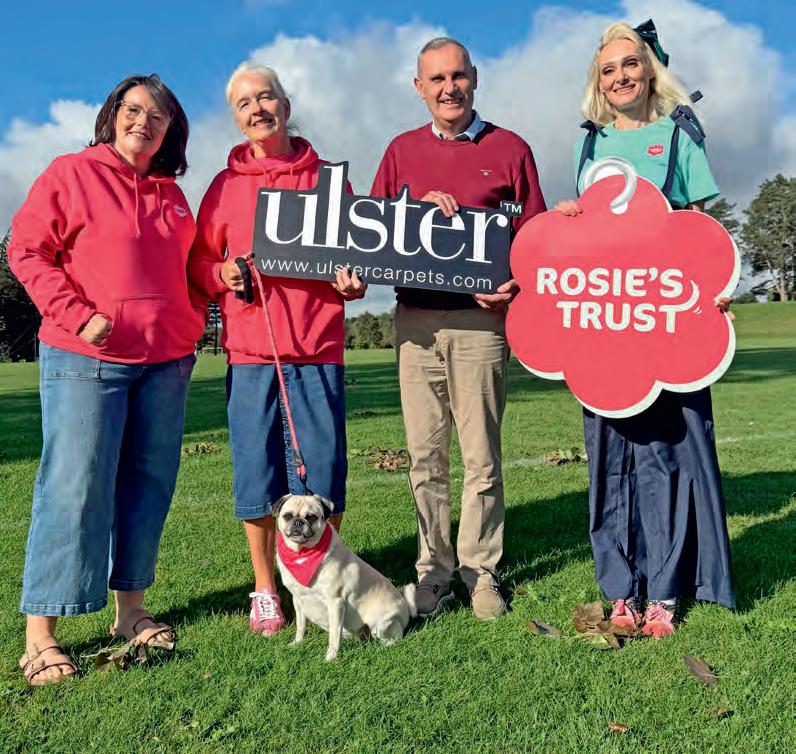

volunteers. CEO Dr Catriona MacArthur added:
“We are absolutely delighted to welcome Ulster Carpets as our newest corporate partner, as we celebrate our charity’s tenth anniversary throughout 2025.
“Their generous support, assured for the next three years, will allow us to reach more people who need our services to ensure that they don’t have to face giving up their pet when they need them most.
“This partnership demonstrates what can be achieved when local businesses
support local charities, and we are very grateful to Ulster Carpets for their commitment to us.”
If you would like to find out more about the support services provided by Rosie’s Trust, visit https://www.rosiestrust.org/ what-we-do.
Or if you’re a local business who would be interested in an informal conversation about how you could support, please get in touch with Fundraising Lead Nuala Muldoon (nuala@rosiestrust.org).
Ulster Carpets has become a new corporate partner of Rosie’s Trust. The company’s Chief Executive Officer, Nick Coburn, is pictured with Laura Quinn, Rosie’s Trust Development Officer, Ruth Pinkerton, Rosie’s Trust volunteer, Lorraine Nesbitt, Rosie’s Trust volunteer, and Elsa, a Rosie’s Trust dog who was rehomed by Laura.
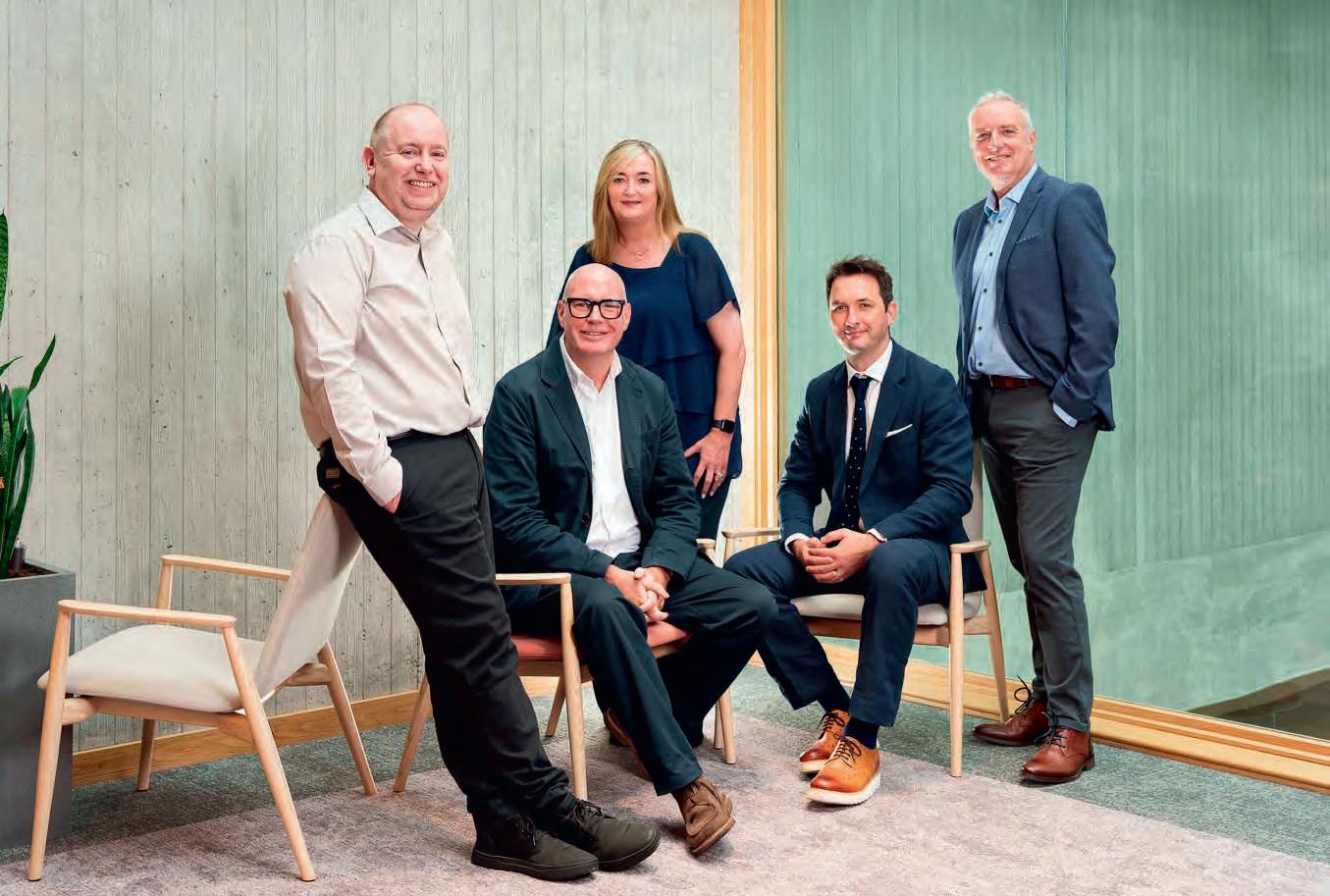
TODD ARCHITECTS RESHAPES OWNERSHIP IN COMPLETION OF SUCCESSION PLAN
TODD Architects, a leading UK and Ireland design practice headquartered in Belfast, has announced a significant leadership transition as it prepares to mark its 50th anniversary in 2026.
Existing directors Peter Minnis and Paul Crowe have formally stepped back from their executive roles, remaining with the practice as consultants to support continuity for clients. Ownership has now fully transitioned to directors Andrew Murray, Daragh Coleman and Jim Mulholland (who led a partial management buyout in 2019) alongside newly appointed equity shareholders Michael Edwards (finance director) and Maria McKeown (director). Maria and Michael’s inclusion at board level brings dedicated financial and operational expertise, marking a strategic evolution and generational shift grounded in continuity, stability and a renewed ambition for growth.
Daragh Coleman, managing director, commented:
“This is a milestone moment for TODD. As we approach our 50th year, we’re building on a strong legacy with a leadership model designed for the future. The inclusion of Michael and Maria reflects the scale and complexity of the projects we now deliver, and our commitment to commercial and operational excellence.”
Michael Edwards, finance director and new equity partner added:
“Our inclusion in the shareholder group reflects the evolving nature of architectural practice. We’re here to ensure TODD is equipped for long-term growth; commercially, operationally and strategically, with strong outcomes for both clients and teams.”
With 90+ staff members across offices in Belfast, Dublin, London and Manchester, TODD Architects is consistently ranked in the Architects’ Journal Top 100 UK Practices. The firm is best known for its work on commercial, healthcare, residential,
education and major civic projects, including landmark tourism attraction Titanic Belfast.
Today’s announcement forms part of a wider series of personnel developments across the practice’s studios, which will be detailed in the coming months as TODD finalises a broader leadership and talent strategy to support future growth.
Peter Minnis commented:
“We’re proud of what TODD Architects has achieved since 1976 when it was founded by the late Barrie Todd. This transition has been carefully planned, and I am confident the business is in very capable hands. The next generation is ready.”
Paul Crowe added:
“Andrew, Daragh, Jim, Michael and Maria have the experience and vision to lead the practice forward. Together they are a strong leadership group that reflects the multi-skilled nature of our business.”
The practice has a wide spread of multi-sectorial projects across the public and private sphere throughout the UK and Ireland. Recent project highlights include the multi-awardwinning Student Hub for Queen’s University Belfast at Riddel Hall (Queen’s Business School), recognised in the 2025 RSUA and RIBA Awards, and the firm’s role as local lead design partner for Belfast Stories; a major civic project and tourism landmark.
The practice reports annual turnover of approximately £8 million, having delivered steady growth over the past five years despite wider market challenges. The new board will prioritise investment in talent, digital design capabilities and sector specialism while maintaining TODD’s commitment to local supply chains and community outcomes.
www.toddarch.com
Andrew Murray, Daragh Coleman, Maria McKeown, Michael Edwards and Jim Mulholland.
NEWAPPOINTMENTS IN THE BUSINESS COMMUNITY
HANIF
Upstream ABL –Credit and Risk Partner
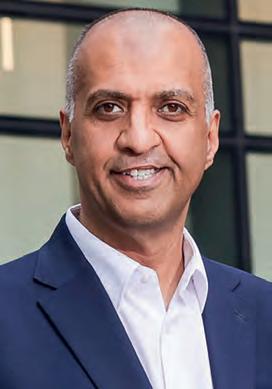
Coca-Cola HBC –Sales Director
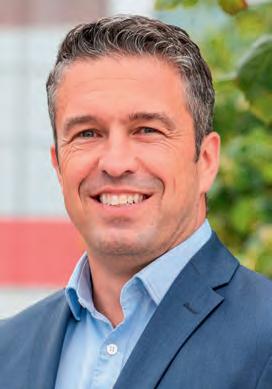
REBECCA JAMA
Operations Manager –VANRATH

LENNON
ICC Belfast –Board Member

Associate –Wilson Nesbitt

Associate Engineer and Sustainability Lead – Design ID

Uform –Group HR Director
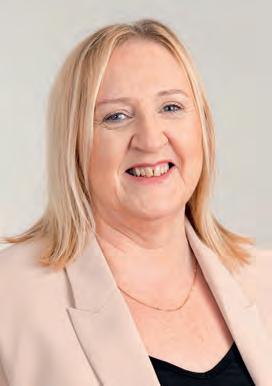
Graphic Designer –Stride Design

AZEM
GERRY
SHARON LOGUE
MIKE RAVEN
HELEN MCGARRY
ALYSSA MCPOLIN
BETHAN RATCLIFFE
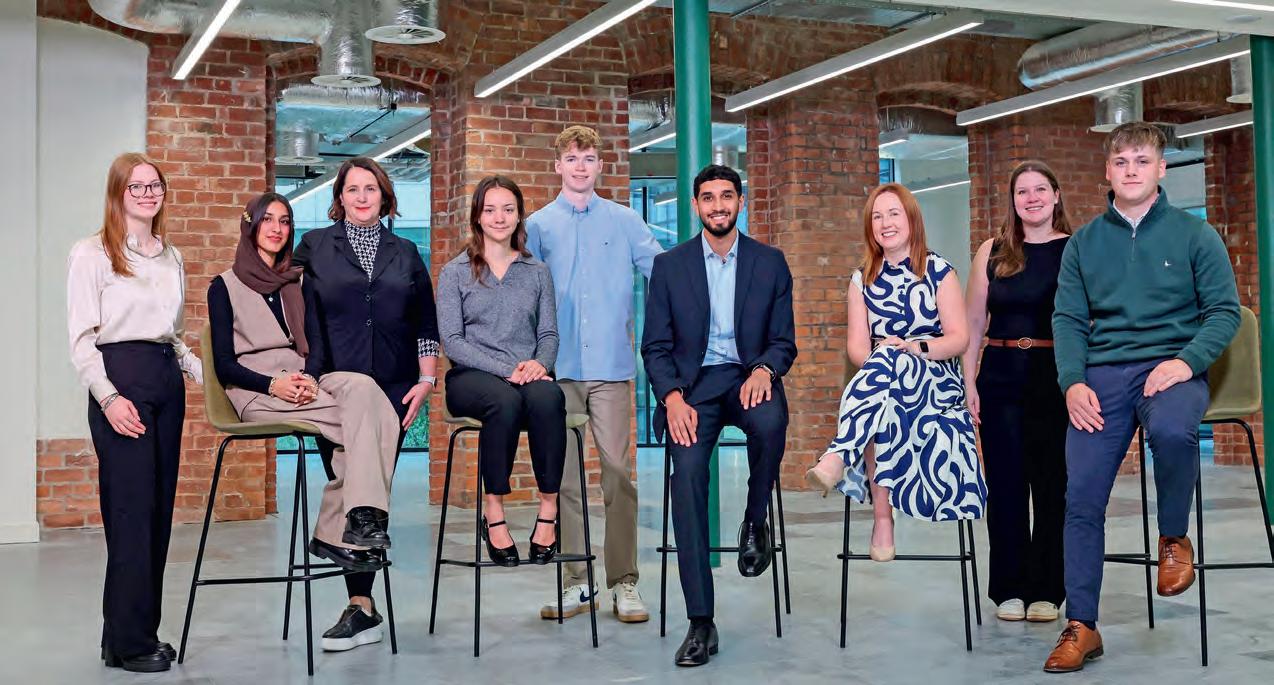
Deloitte Welcomes 74 to its Belfast Team
Deloitte is set to welcome 74 new people to its Belfast teams through its award-winning graduate, BrightStart apprenticeship and industrial placement programmes.
In Belfast, 28 new starters will be joining the BrightStart higher apprenticeship scheme, 32 are coming into full time graduate roles and 14 are beginning industrial placements over the next month. The new joiners will take part in a firm-wide virtual induction into the world of professional services, in which they will be introduced to Deloitte’s innovative GenAI platform, PairD, and participate in networking events with colleagues. The new intake comes after Deloitte’s graduate programme ranked fourth in the Times Top 100 Graduate Employer list for the fifth year running.
Marie Doyle, Belfast office senior partner at Deloitte, said: “Deloitte’s graduate, Brightstart and placement programmes provide incredible opportunities for young people to start their career journey with the firm. Our new intakes always bring a wide range of talent and experience, demonstrating strong communication, adaptability, resilience and analytical abilities which we value highly. Having begun my own career at Deloitte as a graduate, it is exciting for me to welcome this talented group of people from right across Northern Ireland to the team as they take their first steps with the firm”.
The Deloitte BrightStart apprenticeship is an earn-while-you-learn apprenticeship, with the chance to gain professional and degree-level qualifications.
Stena Line Welcomes Sarah West as New UK & Ireland Ports Managing Director
Stena Line has announced a strategic restructuring of its Ports leadership team with the creation of a new managing director (MD) role for UK and Ireland ports. The newly appointed MD, Sarah West, will join Stena Line in January 2026, bringing extensive experience and leadership to the role.
This change reflects Stena Line’s commitment to strengthening its port operations as the company continues to invest significantly in its infrastructure across the UK and Ireland.
Sarah brings over 30 years of experience in the maritime sector, with a particular focus on port operations over the past decade. She joins Stena Line following her role as CEO of Harwich Haven Authority.
Her extensive experience is underpinned by a 20-year career in the Royal Navy, where she made history as the first woman to command a major UK warship.
Commenting on her appointment, Sarah said: “Stena Line is at a transformative point in its long history in the UK and Ireland. I’m excited to work with the team to develop and implement our plans for the future.”
This appointment marks a significant step in Stena Line’s long-term strategy to enhance operational excellence, customer service, and sustainability across its UK and Ireland port network.
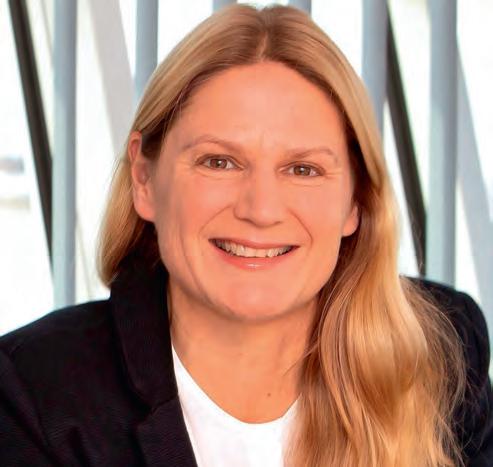
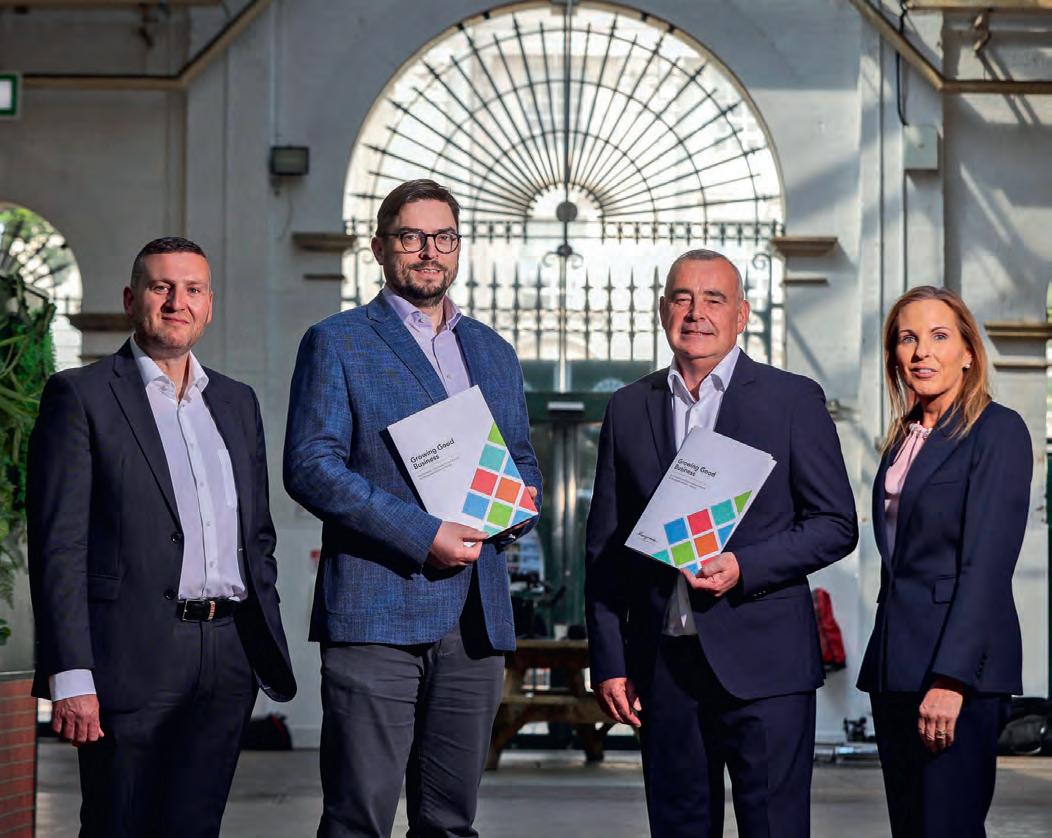
GROWING GOOD BUSINESS WITH MUSGRAVE NI
Earlier this year, food retail, wholesale and foodservice company Musgrave Northern Ireland revealed a ten-figure annual contribution to Northern Ireland’s economy – a result of being one of the region’s top employers and its investment in local produce.
Growing Good Business: An Economic and Social Impact Report, prepared by leading economists at Grant Thornton on behalf of Musgrave NI, set out how critical the business is to Northern Ireland – supporting the employment of over 5,000 jobs, working with 250 local suppliers and investing significantly in local communities, as well as in sustainability and affordability initiatives.
Among Musgrave NI’s key annual contributions are: £1.2 billion in total spending across the NI economy; £329 million in Gross Value Added; and £240 million invested in local supply partnerships.
Operating in Northern Ireland since 1983, Musgrave works indirectly with over 3,000 farmers and features over
6,000 homegrown products across its retail stores and wholesale brands. The impact of its total spend with Northern Irish suppliers equated to a further £256 million injection in indirect expenditure, as calculated by Grant Thornton.
In 2024, Musgrave NI reinforced its commitment to supporting local producers and delivering value to customers by launching a new brand, Good Food Locally Sourced. This initiative represented a £14 million investment in partnerships with local suppliers. Such has been the success of the range, it’s on track to deliver £15 million in retail sales this year.
Alongside Musgrave NI’s economic impact is a significant social impact. In 2024, the business invested £6 million in value-focused initiatives to support affordability; it raised over £260,000 for its charity partners Action Cancer and Northern Ireland Chest Heart and Stroke bringing the total raised for both charities to £4.4 million; it donated over 7,200 meals to people in need through
FareShare NI; and it planted 5,000 native trees as part of a long-term environmental commitment.
Trevor Magill, Musgrave NI managing director, said: “At Musgrave NI, we’re focused on Growing Good Business and adding value to all those within our ecosystem, including unwavering support for our local suppliers, creating quality employment opportunities and delivering everyday value for our customers.
“Right across the board, we have deepened our investment in Northern Ireland over the past year through new store openings and refurbishments, environmental initiatives, local sourcing partnerships and impactful charity contributions. To see this all accumulate into a figure of £1.2 billion in economic output makes me incredibly proud of our team and the efforts that are made. We are committed to continuing this journey and to remaining a positive force in Northern Ireland’s economy, in support of the communities we’re part of.”
L-R: At the launch of Musgrave NI’s economic impact report at St Georges Market in Belfast are Musgrave NI’s Marketing Director Desi Derby, Chief Economist at Grant Thornton Andrew Webb, Musgrave NI’s Managing Director Trevor Magill and Trading Director Julie Cherry.


Talk to Musgrave - the leading convenience retail experts.
STORES ACROSS SUPERVALU, CENTRA AND MACE IN N.I. 5.2m CUPS SOLD IN N.I. IN 2024
£7m INVESTED IN VALUE £12m INVESTMENT IN STORE NETWORK 2025
Whether you’re looking to convert, sell your business, freehold or leasehold, talk to us. We’re an award-winning family owned business that’s redefining convenience. Through our innovation in food-to-go and store design, we are driving new opportunities for growth. Our strong track record for building better brands is highly recognised. In fact, our Frank and Honest on-the-go coffee brand is now the largest on the island of Ireland.
To find out how we could grow good business, contact:
Barry Holland, New Business and Acquisitions Manager barry.holland@musgrave.ie | 07795 965204 Denis McLaughlin, Business Development Manager denismc@musgrave.ie | 07881 938374
Terence Lagan, Business Development Manager terence.lagan@musgrave.ie | 07775 009699



From Canopies to Courts, Lauralu is Solving Space Fast


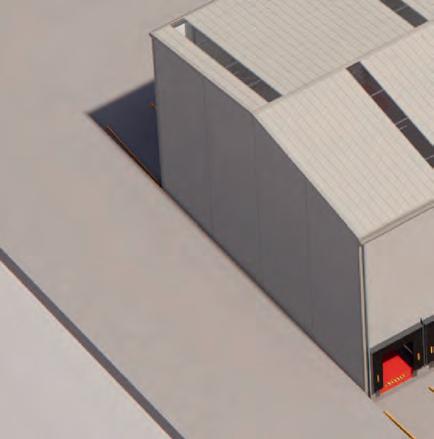


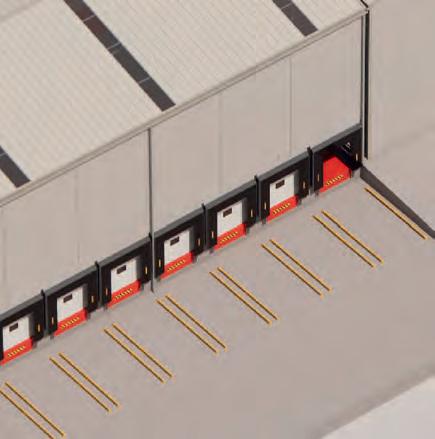






From loading canopies and warehouses to full sports facilities such as Padel courts, LauraLu delivers solutions that are fast to deploy and tailored to need. Andy Gates, sales director UK, and Chris Jarvis, area sales manager for NI, explain how their model is built on rapid deployment, rental flexibility and complete end-to-end delivery.
“We are a French manufacturer with a base in Toulouse. We design, manufacture and install temporary, semi-permanent and permanent structures,” Andy Gates, sales director UK and Ireland begins.
Lauralu has two product ranges: aluminium and steel. It sells or rents structures to customers, which allows them the flexibility to grow without tying up capital in what is a tax-efficient setup.
The company has been established in the UK for almost 12 years, and growth has accelerated given rising demand in specific sectors. “We have had just over 300% growth since 2019,” Andy continues. “And we are on track to exceed £10 million turnover in 2025, which is a record year for us and a big jump up from last year as well.” As part of the wider French group, Lauralu is turning over €85 million.


On the ground in Northern Ireland, Chris Jarvis is the dedicated point of contact for companies seeking to expand their footprint without the commitment of a permanent structure, or for those constrained by leases. “We are the go-to for temporary buildings,” he says. “When we say a temporary building, that is not a tent nor is it a marquee. It is something that does offer flexibility with the rental, but equally it is something that can be up for a very, very long time as well.”
Lauralu has been operating and selling structures in Ireland and Northern Ireland for three years and recently opened an office in Belfast City Centre. When discussing the firm’s USPs, speed and turnkey delivery are the hook. “Our lead times are six to eight weeks and we can install and hand over the building in nine weeks from time of order,” Andy explains. The process is intentionally simple and fast. Lauralu aims to be “on site as soon as we can within 48 hours” and to “provide proposals and quotes within 24 hours of being on site.” From there, the team runs a transfer meeting with manufacturing in France, receives a delivery date, installs, hands over and completes any snags via a project or site manager.


“We have certain aspects of our building which make us more of a premium product compared to our competitors,” Andy says. “We have full control over every aspect of the design phase, the manufacturing phase and the installation, whereas some of our competitors do not. The level of support that we offer is far greater. We have presence in every part of the UK and Ireland, we are always accessible immediately and we are a can-do company.”
Sectors driving demand reflect where speed and flexibility matter most.
“Our bread and butter would normally be transport and logistics. We work with companies like DPD, DHL and Montgomery Transport,” Andy says. “There is always another requirement, and they are always coming back to us to help them solve the next problem that they have.” Sport is another bright spot. “Padel facilities. The solutions that we offer are much more premium, but still cost-effective and offer a rental.”

In Northern Ireland, Chris points to two upcoming flagship schemes. “One of them is going to be a large warehouse. We will have just shy of 4,000 square metres of


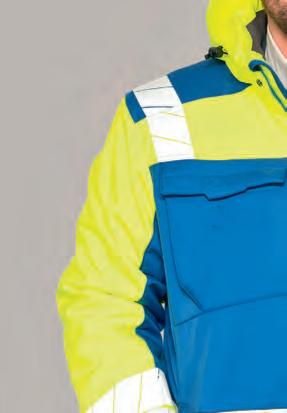
Andy Gates, Sales Director.


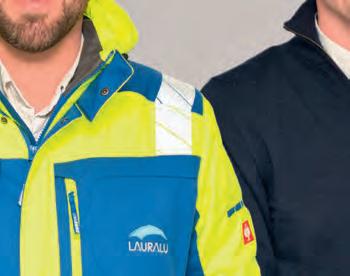


warehouse space for the customer,” he says. “It will be insulated so that they are able to operate a chilled storage unit. That should be installed within the next six months.” A second scheme is a large indoor Padel facility, with at least nine courts, changing rooms, viewing gallery, warm-up area, gym and reception.
Sustainability is a backbone of company ethos, baked in through materials and reuse. “The aluminium product that we offer is 90% recyclable,” Andy says. “We also reuse our structures. For example, we installed a building for Airbus. It was 52 metres wide and 250 metres long, and they needed that for 18 months. At the end of that 18 months we can dismantle it and we reuse that on other projects.”
All Lauralu buildings are designed to last 50+ years. Innovation is ongoing too, including a new steel roof system from the group’s Finnish manufacturer. “It is guaranteed to be 100% waterproof with no issues. It will stand us apart from our competitors once again in our market,” says Andy.

The administration involved in adding a new building almost always requires planning, another area that Lauralu handles. Chris says, “We will work closely with a local planner here in Belfast and architects. We would then look after everything being submitted to the planners, going through the planning application, liaising with the case officer.”
Andy and Chris see Lauralu as something of an education piece for

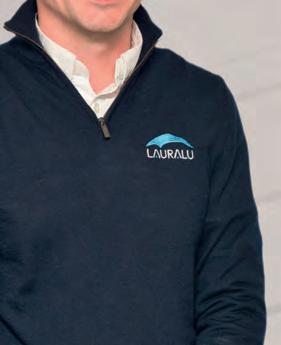

Chris Jarvis, Area Sales Manager for NI.
expanding businesses. “Helping clients used to traditional builds to see like-forlike outcomes on faster timelines is key. We can actually deliver the same building in a much quicker time frame, much more cost-effectively and to a certain degree a lot more sustainably as well,” Andy says. Chris offers a live comparison. “We had a customer who had a traditional build quoted. The timeline was 18 months for a 700 square metre build. We would have something up in four months. It would be the same insulated value as what the traditional build would have been.”
The UK and Irish markets are central to the group’s imminent plans. “Our CEO and the board see them as an extremely big part of the wider group,” Andy says. “By the end of this year, we will be in the top two for what we do in this market. Our ambition is to be number one. In Ireland and Northern Ireland, we would like to grow at least 30 to 40% in terms of sales and rentals.”
The team is growing too, “which will support not only the sales team but from a marketing point of view as well”, while the wider group remains acquisitive. “We do very well at acquiring other companies, which gives us a much better foundation for the rest of the group,” Andy concludes.



For Northern Ireland readers, Andy and Chris emphasise that fast, highquality space solutions can be delivered with minimal disruption and maximum flexibility.
“We are the go-to for temporary buildings,” he says. “When we say a temporary building, that is not a tent nor is it a marquee. It is something that does o er flexibility with the rental, but equally it is something that can be up for a very, very long time as well.”



Bruce Engineering Eyes European Expansion Supported By Danske Bank
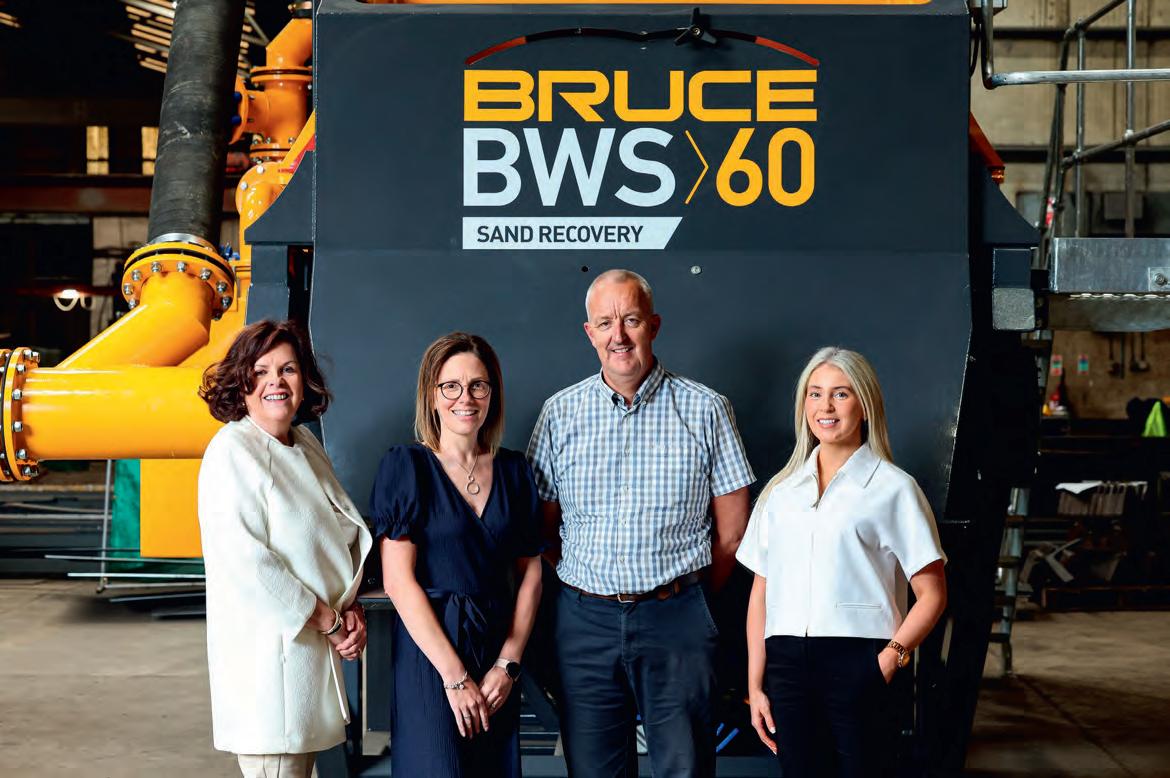
Cookstown-based mechanical engineering firm Bruce Engineering has purchased new machinery and is set to begin exporting to new markets across Europe, including Scandinavia, after securing £800,000 in funding support from Danske Bank.
Founded by James Bruce in 1958, Bruce Engineering has remained a familyowned and operated business for three generations.
Managed today by Reuben and Lorraine Bruce, the business supplies a variety of different industries, including quarrying, recycling and materials processing industries. The business specialises in the manufacturing and installation of modular aggregate washing plants and provides solutions to the unique washing requirements of its customers.
Backed by funding support from
Danske Bank, Bruce Engineering has purchased new, high-tech machinery, allowing it to perform large-scale plant manufacture and installations in the UK, which will further expand its offerings into new markets.
In addition, the financial support has enabled the manufacturer to refurbish its offices in Cookstown in November of 2024, creating an in-house environment which allows for larger contracts to be fulfilled.
Furthermore, the business has invested in the growth of its team, employing two additional members of staff, including a design engineer. Bruce Engineering currently has a dedicated team of 30 staff with experience in the manufacturing and installation of modular aggregate washing plants.
Lorraine Bruce, financial director at Bruce Engineering, commented: “The funding has allowed us to grow our
turnover, refurbish our offices and expand our presence across Europe. We have also been able to continue to strengthen Bruce Engineering’s presence in our home market of the UK and Ireland, where longstanding relationships remain a cornerstone of our ongoing success.
“The support we have received since moving to Danske Bank in 2023 has been invaluable to the business. We have had consistent support and engagement throughout our banking relationship and all the team are responsive, professional and helpful.”
Jayne Beacom, senior business manager at Danske Bank, added: “We’re pleased to be supporting Bruce Engineering to grow as a business, expanding into new geographies whilst strengthening its presence in the UK and Ireland. It’s an exciting time for the business and we look forward to supporting them as they continue to grow.”
[L-R] Oonagh Murtagh, Head of South Business Centre at Danske Bank; Lorraine Bruce, Financial Director at Bruce Engineering; Reuben Bruce, Director at Bruce Engineering; and Jayne Beacom, Senior Business Manager at Danske Bank.
Strengthening Community
In today’s fast-evolving landscape, resilience isn’t just a military objective; it’s a business imperative. From economic pressures to workforce challenges and cyber threats, employers in Northern Ireland are navigating growing complexity. But within that challenge lies opportunity: a chance to support people, strengthen communities, and unlock long-term strategic value.
At the heart of this approach is the Armed Forces Covenant, a voluntary commitment from businesses and organisations to support those who serve or have served and their families. In return, signatories gain tangible benefits: access to skilled talent, improved procurement outcomes, and stronger community connections.
WHAT IS THE ARMED FORCES COVENANT?
The Covenant is a voluntary pledge that members of the armed forces community should not face disadvantage due to their service. For employers, this might mean offering flexibility for training, recognising military-transferable skills, or supporting families during deployments.
Many businesses that sign the Covenant report clear returns: improved staff engagement and retention, better performance in public procurement with social value demonstrated through armed forces community support, enhanced reputation and community trust, and access to a diverse and capable workforce. It’s a practical, values-led commitment that sets businesses apart in a competitive marketplace.
RESERVISTS: A STRATEGIC WORKFORCE ASSET
With the UK’s Strategic Defence Review emphasising expansion of reserve forces, reservists play an increasingly crucial role in defence capability while holding civilian roles across Northern Ireland’s businesses and public services. They typically train around 27 days per year, gaining leadership, teamwork, and problemsolving skills that directly benefit their civilian employers.
The advantages for employers are substantial: employees gain nationally
recognised qualifications at no cost, teams benefit from enhanced resilience, adaptability, and professionalism, government support is available during mobilisation periods, and businesses gain access to specialist skills and diverse perspectives. Hiring or supporting a reservist isn’t a disruption; it’s a strategic business advantage.
SUPPORTING YOUNG PEOPLE AND COMMUNITY RESILIENCE
Northern Ireland is home to a vibrant cadet force community, with the Strategic Defence Review highlighting increased investment in youth organisations that develop confident, resilient citizens. Cadets aged 12 to 18 develop confidence, resilience, and civic pride through structured, community-based activities.
Employers can support cadets by hosting workplace visits, sponsoring events, or providing staff volunteering time. This creates powerful connections with young people and helps nurture future talent for Northern Ireland’s economy.
Equally valuable is supporting Cadet Force Adult Volunteers (CFAVs) – the dedicated individuals who lead these programmes. Employers can offer flexible working arrangements for CFAV training and activities, recognising that these volunteers develop exceptional leadership and mentoring skills. In return, businesses gain employees with enhanced people management capabilities, stronger community networks, and demonstrated commitment to youth development.
A SHARED COMMITMENT TO PEOPLE AND PLACE
Supporting the armed forces community is fundamentally about people. It’s about recognising transferable skills, removing barriers, and creating opportunities that strengthen workplaces and communities alike.
Over 13,000 organisations across the UK – from multinationals to local SMEs – have already signed the Covenant, including growing numbers in Northern Ireland. As defence spending increases to 2.5% of GDP by 2027 and procurement reforms reward innovation and social value, Northern Ireland businesses are
well positioned to benefit from this wholeof-society approach.
GRAHAM Group, one of Northern Ireland’s leading construction companies, exemplifies this approach perfectly. Having signed the Armed Forces Covenant and earned the prestigious MOD Gold Award, GRAHAM actively employs reservists, veterans, and military spouses, offering flexible working arrangements and additional paid leave for military duties. “Supporting the Armed Forces Community is not just a commitment; it is an honour.” The business benefits are tangible – improved recruitment outcomes, enhanced reputation in public sector bids, and strengthened community partnerships through supporting local cadet units and military charities.
UNIQUE PARTNERSHIP OPPORTUNITIES
Defence Relationship Management NI offers employers exclusive experiences that demonstrate military excellence in action. Recent visits such as those to the Royal Military Academy Sandhurst have given business leaders first-hand insight into leadership and training methodologies they can apply in civilian contexts. A visit to Perthshire in Scotland on exercise with the Royal Marines provides a once-in-a-lifetime opportunity for employees to train alongside elite forces, developing resilience and teamwork skills.
For those preferring different experiences, Royal Gun Salutes and the Royal Edinburgh Military Tattoo offer cultural engagement delivered by reservists, while ship and aircraft visits, including a recent on-board tour of the A400 transport aircraft, showcase cutting-edge technology and logistics. As one senior business analyst described her experience: “insightful and inspiring, particularly the Sandhurst visit and the Everest 2026 Army expedition briefing.”
TAKING ACTION
Whether through signing the Armed Forces Covenant, supporting local reservists, employing veterans, or engaging with cadet forces, Northern Ireland businesses have multiple pathways to participate in this shared commitment. The Strategic Defence Review’s emphasis on regional engagement and community partnerships makes this an opportune moment to act.
Defence Relationship Management NI stands ready to support businesses in becoming forces-friendly employers, providing guidance on best practices and connecting organisations with opportunities to make a meaningful difference.
Darren Niven – Defence Relationship Management NI












Electric Innovation
The e-Power Qashqai offers a novel stepping stone to electric driving, writes James Stinson.

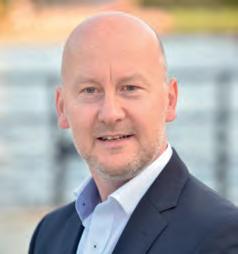
The Nissan Qashqai is widely credited with creating and popularising the ‘crossover’ type cars that are all around us today. Nissan has sold more than four million worldwide and 750,000 in the UK alone.
The latest version, which was given a refresh last year including a new front grille, tweaks to the trim levels as well as some digital upgrades, remains among the best sellers. And it’s easy to see why. It’s eye catching, up to date and competitively priced.
It remains, though, a conventional car. Sales are still heavily skewed towards petrol-hybrid models which can feel a bit dated. That’s not exclusive to Nissan or the Qashqai. Petrol and diesel-powered cars just offer a different driving experience to newer electric models.
Electric cars feel more modern, like the latest smartphone. From a driving perspective, they’re certainly more fun to drive in and around town. They zip out of junctions in a way that makes petrol and diesel cars feel laboured.
So why aren’t we all driving electric cars? Well, some buyers are still put off by the price. Electric cars usually cost more. Some
are still concerned about range and if you haven’t got a driveway and can’t charge at home, relying on still scarce public chargers can be a real pain.
If you are afflicted by some or all of these concerns, then the Nissan Qashqai e-Power may be the answer. This mix of petrol and electric-powered propulsion differs from other models in the Qashqai range because its 1.5-litre petrol engine provides electricity for electric motors that drive the wheels.
Because the wheels are only ever driven directly by an electric motor, unlike traditional hybrids, the e-Power Qashqai delivers the sensation of driving an EV with no need to plug in and charge.
Nissan says it’s a “perfect solution” for those customers “seeking advanced and efficient technology” but who are not quite ready to make the switch to a 100% electric car. For short distances, it will even drive in EV mode only.
An improved e-Power version has just been released which is quieter, more efficient and slightly more powerful while the cost of buying one remains unchanged on most grades – falling slightly on two.
Fuel efficiency on the latest model has increased 15% to 62.8mpg, giving a potential range of 745 miles. CO2 emissions
have decreased from 116g/km to 102g/ km – a 12% reduction compared with the current iteration, which in turn means a lower VED banding.
Power has increased by 11kW to 151kW (up from 188bhp to 201bhp) in Sport Mode, with the 0-62mph time falling to 7.6 seconds. It’s also quieter and more refined.
Prices for the cheapest e-Powered Qashqai in Acenta Premium trim start at £34,860, the same as the outgoing model. By comparison, conventional petrolpowered hybrid Qashqais start at around £30,000. It’s a hefty premium but some will no doubt be won over by the novel electric-like driving experience without the hassle of ever having to go near a charger.





James Stinson











T-Roc’s Next Chapter
A second generation of Volkswagen’s hugely popular T-Roc model has been unveiled, writes James Stinson.

The latest version of VW’s big selling SUV boasts a significantly improved interior and a radical hybrid drivetrain that will be rolled out across the brand’s line-up.
Despite selling more than two million units of the old car since it launched in 2017, this is a hotly contested market and the competition has moved on – something not lost on VW. Developed completely from scratch, the latest T-Roc is more striking to look at, roomier and has a far classier interior.
It retains the characteristic T-Roc DNA with the coupé-like rear end and makes the most of the advantages of 12cm more overall length compared to its predecessor. The larger proportions are what make the dynamic design possible, says VW.
The lighting design also plays a significant role in the new T-Roc. New LED headlights at the front are standard. IQ.LIGHT LED matrix headlights are available as an option and are connected to the white illuminated Volkswagen logo by a narrow light strip. The rear end of the new T-Roc also features a continuous LED crossbar with a red illuminated Volkswagen logo (depending on equipment).
Being longer than its predecessor, VW says the new T-Roc can accommodate five people in comfort, including six footers. The boot is bigger too, by some 30 litres.
The interior has been significantly improved, with premium quality, soft surfaces and innovative technologies.
For example, the dash panel is upholstered in a newly developed fabric, which creates a “loungestyle atmosphere” together with
the background lighting.
The new T-Roc also adopts numerous features from the larger Tiguan model, with a 10-inch digital instrument display, a 12.9inch infotainment touchscreen, a head-up display as well as Volkswagen’s new multifunction digital rotary dial in the centre console, which can adjust the drive mode, audio volume or interior settings.
T-Roc will also have more advanced safety systems. These include features like automatic lane changes, automatic parking which can perform tricky manoeuvres by itself and an exit warning system to prevent you opening doors into cyclists or other traffic.
At launch, there will be two 1.5-litre mild hybrid petrol engines with either 134bhp or 168bhp. Both are only available with an automatic gearbox; there’s no manual option.
Volkswagen is also adding a full hybrid system to the T-Roc at a later date, making this the first model it’s ever offered with a system like this. It’ll likely work in a similar way to the hybrid system in the Toyota C-HR, which means it’ll be able to travel in town on electric power only, making it much more economical. A sporter R version is also on the cards as is a four-wheel-drive variant.




The T-Roc will be launched with a choice of four trims – base, Life, Style and R-Line – with various options and packages available on top.
Prices haven’t been revealed yet, but the T-Roc is likely to slot in between the Golf and the Tiguan slightly above £30,000.


THINKING OF SWITCHING FLEET PROVIDERS? HERE’S WHY IT COULD BE A SMART MOVE
Changing fleet providers is a significant decision – but for businesses of all sizes, it can be a strategic step toward reducing costs and achieving sustainability targets. At Agnew Leasing, we specialise in helping companies make smarter fleet choices through two key areas: Whole Life Cost (WLC) analysis and Electric Vehicle (EV) integration.
Whole Life Cost (WLC) Analysis
Many businesses focus solely on monthly lease payments, but that can be misleading. A true costeffective decision comes from understanding the total cost of ownership over the vehicle’s lifecycle.
Our WLC analysis includes:
Fuel costs: What’s the most efficient and costeffective solution for your business mileage?
Tax implications: Choosing the right vehicles means factoring in National Insurance, Benefit-in-Kind (BIK), and Corporation Tax.




Choose the right EVs: Not every electric vehicle suits every business.
Funding method: We can analyse various funding methods to ensure you select the optimum option for your business. Using advanced modelling software, we deliver clear, datadriven reports that highlight which vehicles offer the best longterm value for your business.
Electric Vehicle (EV) Integration
Transitioning to EVs is no longer just a trend – it’s a necessity for both financial and environmental reasons. But it can be complex. That’s where our EV consultancy comes in. We help you:
Maximise financial benefits: EVs often come with lower WLCs, reduced fuel and maintenance costs, and significant tax savings (lower BIK & Class 1A NIC).
Build a strategic transition plan: We’ll help you model the shift and manage the rollout smoothly.
Is Agnew Leasing the right fit for your fleet?
Let’s talk about how we can support your business goals.
Email: david.mcewen@agnews.co.uk
Call: 028 9038 6600
GIVE A GIFT AS TIMELESS AS THE STORY OF TITANIC
This Christmas, give a gift as timeless as the story of Titanic. Located in the heart of Belfast’s iconic Titanic Quarter, Titanic Hotel Belfast offers a unique blend of heritage, elegance, and award-winning hospitality, making it the perfect corporate gift this festive season.
Titanic Hotel Belfast gift vouchers are an ideal way to thank clients, reward employees, or strengthen valuable business relationships. Whether it’s a monetary voucher, luxurious overnight stay, fine dining at the acclaimed Wolff Grill, or a premium cocktail experience in the historic Drawing Office Two, each voucher offers a memorable experience that reflects your appreciation in a meaningful and distinctive way.

For a truly memorable gesture, vouchers can also be redeemed for elegant Afternoon Tea at Titanic Hotel Belfast, an indulgent occasion featuring handcrafted pastries, freshly baked scones, and savoury delicacies served in beautifully restored surroundings.
Flexible, easy to personalise, and suitable for any recipient, our gift vouchers allow your business to deliver thoughtful recognition and lasting goodwill, well beyond the festive period.
Corporate gift vouchers are available now at www. titanichotelbelfast.com or contact our team on +44 (0)28 9508 2000 telephone or email info@titanichotelbelfast.com for multiple voucher options.
MARTIN DOHERTY APPOINTED DIRECTOR OF ENERGY TRANSITION AT ENCIRC

Encirc has announced the appointment of Martin Doherty as its new Director of Energy Transition, a role that will spearhead the company’s journey towards decarbonisation and a fully circular manufacturing model.
As part of the Vidrala Group, Encirc’s progress in energy transition forms a key pillar of the Group’s strategy to deliver on its net-zero roadmap and circular economy commitments across all markets.
With a career that has taken him from chemical and environmental engineering through to public policy, EUfunded projects, and most recently energy resource management, Martin brings a unique blend of technical expertise and strategic insight to the role.
“Moving from chemical to environmental engineering while studying really set the direction of travel for my career,” he explains.
“Working in local government taught me that engineering solutions are often the easy part; the real challenge is bringing people with you. That experience sparked my interest in behaviour change, policy, and regulation.”
His work on European projects provided valuable exposure to leading sustainability practices, while the disruption of the COVID-19 pandemic allowed him to pivot into energy resource management.
“That shift helped me complete the loop in my understanding of the circular economy,” he adds. “Encirc is the perfect opportunity to bring all these skills together.”
Martin says he was particularly drawn to Encirc, a Vidrala Group company, because of its proven commitment to sustainability.
“After an amazing learning opportunity with CASE, the chance to put theory into practice was the major appeal. I’ve had a long association with Encirc and know their dedication to sustainability isn’t just words on a page.
“It’s demonstrated through years of tangible action to reduce their footprint. To be given the opportunity to assist in perhaps the greatest challenge yet, moving away from fossil fuels while driving circularity, was impossible to resist.”
This appointment also reflects Vidrala’s determination to embed decarbonisation expertise at the highest level of its operations, ensuring that learnings at Encirc support innovation and energy transition initiatives across the Group’s entire global footprint.
Northern Ireland’s Challenge
When asked about how Northern Ireland is positioned to meet the twin challenges of climate change and economic resilience, Martin is candid. “This reminds me of my old school reports; ‘with greater application… could do much better’! There’s real frustration across industry and academia at the lack of action and the slow pace of change. There’s more jeopardy in inaction than in getting
some things wrong along the way. Northern Ireland has natural resources, entrepreneurial heritage, and a skilled workforce. The ingredients are there to deliver real change if we harness them.”
Vidrala sees Northern Ireland as an important testing ground for scalable solutions, with the potential to export successful approaches in renewable energy, efficiency, and circularity to its wider network of plants in Spain, Portugal, the UK and Brazil.
On whether we are moving fast enough, Martin remains pragmatic.
“We won’t know until we untether the boat. Local legislation is reasonably forward-thinking, and despite global discord, customers are increasingly demanding greener products.
“Companies that don’t adapt risk being left behind. While affordability is a challenge, the cost of inaction today would be far greater.”
Building Momentum Together
For Martin, the path forward must begin with public understanding and collective action. “The best place to start is with education. People need to know not just the challenges but also the opportunities. We will inevitably get some things wrong, but the key is to adapt quickly and keep moving forward as a team.”
“We must also ensure the rewards of transition are felt by everyone in society. As Plato observed, procrastination isn’t about lack of knowledge but because desire or passion overcomes reason. Now is the time to act with reason,” he concluded.
Martin’s appointment strengthens Vidrala’s Group-wide drive to accelerate decarbonisation and to remain at the forefront of sustainable packaging across Europe and Latin America.
www.encirc360.com
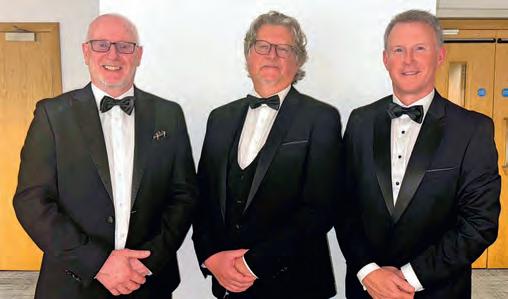

Martin Doherty.

ULSTER BANK BACKS ZERO-EMISSION BUS MANUFACTURER WITH £32.5M
Ulster Bank has agreed £32.5million of financing for zero-emission bus manufacturer Wrightbus that is intended to support the company’s working capital requirements and assist it in achieving significant growth plans as it prepares to ramp up production and decarbonise transport fleets worldwide.
The commitment is part of an overall £150m facility that Wrightbus has agreed to support its growth, and underlines its ambitions to become a global mobility leader, with sales from Ballymena to Brisbane.
Rescued from administration in 2019 by entrepreneur Jo Bamford, Wrightbus now employs more than 2,300 people and produces 1,200 buses per year – 95% of which are zero emissions.
Ulster Bank’s funding features a revolving credit facility (RCF), a flexible business facility that allows companies to borrow, repay, and borrow again up to a predetermined credit limit.
The package supports the long build-cycle of buses, enabling Wrightbus to accelerate production at its factories.
Damien Long, corporate banking relationship director at Ulster Bank, said: “Ulster Bank is very pleased to support Wrightbus as it leads the way in decarbonising public transport globally and in doing so, creating employment and economic benefit in Northern Ireland. This is an important facility for the company that will provide it with the flexibility to ramp up production to meet demand and will help put it in a strong position to deliver on its ambitious growth plans.”
Jean-Marc Gales, CEO of Wrightbus, said the company had big ambitions and was delighted to build further relationships in Northern Ireland. “We are particularly proud that our
HOW MANY SALES HAVE YOU MISSED THIS MONTH?
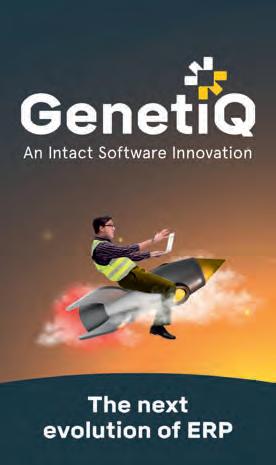
Most of us use AI every day without noticing –predicting what we type, finding faster routes, suggesting what we might like. But are you making the most of it in your business?
AI can flag sales you’re about to lose, forecast stock with more accuracy, and turn vague customer requests into real orders. It can spot changes in buying habits, highlight trends early, and put the right information in front of you at the right time. The result: faster decisions, fewer mistakes, and more sales won. Curious what AI could do for your day-to-day? GenetiQ, the latest business software from Intact, has it built in – and they’d love to show you what’s possible.
www.intactsoftware.com
2,300-strong workforce generates a further 7,500 jobs in the supply chain, but this arrangement with Ulster Bank proves that the ripple effect of our success is also felt right here in Northern Ireland.
“To have a bank on our doorstep that understands our needs, our ambitions, and our culture is vital in our push for growth.”
George Saunders, director of capital markets at asset management firm HYCAP which structured the deal, said: “We are delighted to welcome Ulster Bank to the Wrightbus bank syndicate and look forward to exploring further opportunities to work with Ulster Bank and the wider NatWest Group across the HYCAP portfolio in the future.”
www.ulsterbank.co.uk







Autumn Layers
Neutral corduroy collar jacket, £129, Whistles
Ulster Tatler’s Fashion & Beauty Editor, Joanne Harkness, looks at jackets to transition into autumn.














Check wool jacket, £100, Oliver Bonas
Suedette bomber jacket, £38 George at Asda
Marella x Stella Maxwell leather jacket, £760
Twisted wool blazer, £130, Marks & Spencer
Michelle Cinched tie blazer, £80, Very
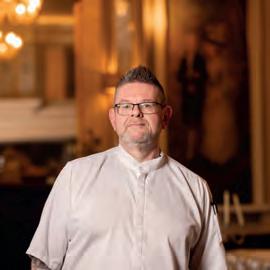
FOR 4 PORTIONS
Andrew Turner Executive Head Chef



LOBSTER CAESAR

Ingredients : 2x600-700g Lobster, 4x Baby Gem Lettuce washed and broken into leaves, Small tin/jar of high quality Anchovies, 50g Shaved Parmesan, 50g Sourdough Croutons, 40g Freshly Grated Parmesan, 10g Chervil, Caesar Dressing
FOR THE DRESSING
Ingredients: 350g Mayonnaise, 175g Crème Fraîche, 50ml Olive Oil, 50g Basil, 50g Chervil, 50g Parsley, 15g Garlic 50g Anchovies, 2 hard-boiled Eggs (sieved), 25g Mustard 125g Parmesan (grated), Juice of ½ Lemon, Salt, Pepper and Cayenne Pepper to taste
Method:
1. Place the herbs, mustard, olive oil, anchovies and garlic into a blender and blend into a ‘pesto’.
2. Mix the pesto into the mayonnaise and crème fraiche.
3. Fold in the parmesan and eggs, finish with the lemon juice and seasonings to taste, keep warm.
FOR THE CROUTONS
Ingredients: Old Sourdough bread (ripped in to small pieces), Garlic, Olive oil, Thyme
Method:
Add the olive oil to the bread and allow it to soak it up, crush two cloves of garlic and add to the tray with the thyme and season, roast in a hot oven, until golden brown.


This makes a classic salad something special for any time of the year. We make a lighter herb flavoured Caesar dressing at The Old Inn, which is just as good with a classic or chicken Caesar. Our Lobster Caesar Salad serves 4 with extra dressing to save for later.
TO DRESS


1. Take the washed leaves and place into a large bowl, add the croutons, and grated parmesan.
2. Dress the leaves with the Caeser dressing as much as you like
3. Divide between 4 serving plates
4. Place the cut lobster over the salad as drape a few anchovies over the top
5. Sprinkle with shaved parmesan and chervil.






President’s Perspective


Time to Deliver at Stormont
As the Northern Ireland Assembly returns from recess, the business community is clear about what’s needed and that’s delivery. The Executive has a legislative programme and a Programme for Government. As we move closer to the end of the current mandate, now it must show that it can use these tools to drive real, measurable progress on the issues that matter most to economic growth and public confidence.
Politics is increasingly difficult the world over. Trying to govern right now is not easy. Competing demands, fiscal constraints, and the challenge of achieving political consensus to move ahead is fraught with difficulty. But with the right approach and a spirit of co-operation, there is opportunity for meaningful progress in Northern Ireland.
Prioritising issues is key. As a business community, we want to see action in areas that not only accelerate economic growth but underpin delivery on multiple parts of the Programme for Government. Planning reform is one top priority. For years, Northern Ireland’s planning system has been a brake on development. It is slow, under-resourced and not investor friendly. The result has been delays to housing, renewable energy, and infrastructure projects that are vital to our economy and our environment.
It is not all bad; we have seen improvement in some areas in the past 12 months, including improvements in processing times, but there is still a lot to do. For NI Chamber’s members that means resourcing statutory consultees, reforming the Planning Appeals Commission, and embedding accountability across the system.
Closely linked is the urgent need to address our failing wastewater infrastructure. NI Water’s current funding model means it is unable to effectively upgrade, replace, and build the new sewerage infrastructure needed for our towns and cities. Because this has not been properly addressed for many years, the problem has escalated to a point that the system cannot take new connections in many areas, while much of the existing infrastructure is operating at over-capacity. We face a stark choice: continue to defer the inevitable or confront it with clarity and a commitment to long-term reform.
Every report which has been undertaken to date has said that a solution needs to involve some form of revenue raising. The NI Executive has made it clear that to date, this is not part of its plan. However, a report published earlier this year by NI Chamber, The Construction Employers Federation, and the Northern Ireland Federation of Housing Associations (NIFHA) sets out mechanisms for keeping any levy to an absolute minimum, along with other measures.
The ‘Good Jobs’ Bill is another issue the business community has been watching closely. As the only UK region with devolved employment law, Northern Ireland can shape a labour market that is both fair and competitive. But that requires a Bill that supports business growth, not one that adds complexity or cost. NI Chamber’s response to the consultation has been clear: the Bill must enhance our competitive proposition and be developed in partnership.
Finally, we need to pick up the pace on public sector transformation. Public service reform and creating better prosperity for our communities are interconnected, so it is not an argument about one or the other. We need to do both if we are going to deliver good jobs, better wellbeing, and a place where our young people want to stay and develop businesses. Evidence shows that economically ambitious places have healthier people, better productivity levels, and can attract significantly more investment. So, let’s see a drive for prosperity alongside the realities of dealing with our waiting lists.
Delivery on all of this will depend on strong leadership, clear priorities, and a willingness to challenge the status quo. The business community stands ready to support this work – from innovation to strategic and thought leadership, we will continue to play our part to the fullest.
Kailash Chada, President, Northern Ireland Chamber of Commerce and Industry
